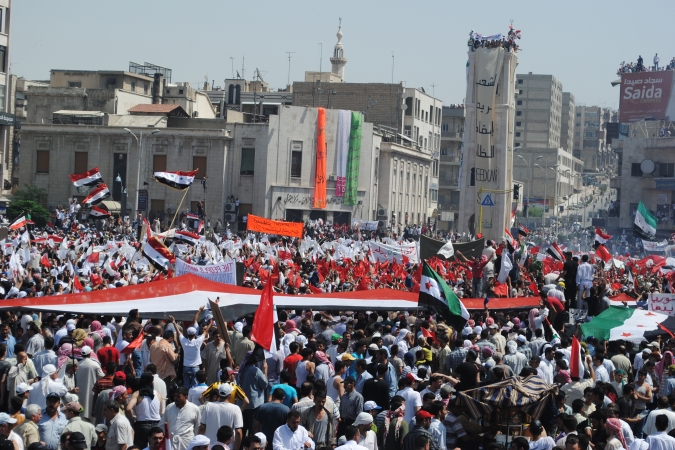27. OBAMA SEEKS TO "CHANGE" AMERICA

FOREIGN POLICY
CONTENTS
 Obama's "new look" in the conduct of Obama's "new look" in the conduct of
American foreign policy
 The war in Iraq The war in Iraq
 Ongoing war in Afghanistan Ongoing war in Afghanistan
 Bin Laden is killed (May 2, 2011) Bin Laden is killed (May 2, 2011)
 NATO troop draw-down in Afghanistan NATO troop draw-down in Afghanistan
 The "Arab Spring" breaks out in Tunisia The "Arab Spring" breaks out in Tunisia
(December 2010)
 The "Arab Spring" violence spreads The "Arab Spring" violence spreads
quickly to Egypt (January 2011)
 Then "Arab Spring" spreads next door to Then "Arab Spring" spreads next door to
Libya (February 2011)
 The "Arab Spring" also spreads to Syria The "Arab Spring" also spreads to Syria
(April 2011)
 Even Europe and America soon Even Europe and America soon
succumb to the youthful love of protest
 The situation worsens in Syria The situation worsens in Syria
 Relations with Iran Relations with Iran
 Relations with China ... and North Korea Relations with China ... and North Korea
 Relations with the Russians Relations with the Russians
The textual material on this webpage is drawn directly from my work
America – The Covenant Nation © 2021, Volume Two, pages 410-432.
OBAMA'S "NEW LOOK" IN THE CONDUCT OF AMERICAN FOREIGN POLICY |
|
In the early days of the new Presidency, Obama
emphasized how America was going to present a nicer face abroad.
America was going to "reset" its relations with Russia, eliminating the
tensions that had built up between America and Russia over the previous
eight years – basically since Putin had taken charge of Russia. At the
same time Obama undertook a strong effort to win over the hearts of the
Muslim world, making it clear how apologetic he was about how America
had long been rather insensitive to the interests and feelings of that
Muslim world, and promising that this would now change.
Arabs were hoping that this marked a
distancing from America's traditional support of Israel, and for a
while responded positively to the "new look." However, Iran remained
unmoved by the effort to improve relations – still calling for "death
to America; death to the Great Satan."
The 2009 Nobel Peace Prize
On October 9th, 2009, the world was
stunned to hear that the Norwegian Nobel Committee had decided to award
the 2009 Peace Prize to American President Obama, because of his
"extraordinary efforts to strengthen international diplomacy and
cooperation between people." Considering the fact that this took place
less than nine months into his presidency (even his nomination had to
have been put forward in early February, less than two weeks into his
presidency), this was a quite remarkable development. Was this a thanks
to America for having moved beyond the disastrous Bush, Jr. legacy
(which Europeans in general were very unhappy about), and a sign of the
hope for new directions in American foreign policy on the part of a
body of Norwegians, well-known for their political idealism (mostly of
the Leftist variety)? Nonetheless, considering the fact that although
Obama had announced his intention to withdraw American troops from
Iraq, this decision to offer Obama the Peace Prize however also
occurred after another announcement by Obama that he was going to
increase American troop presence in Afghanistan. Thus the "peace"
nature of the prize made little sense to many people – even to the
majority of Americans themselves.
Obama, always a master of the English
language, was very gracious in accepting the award, acknowledging the
prize as given not just to him but to the American people in general in
recognition of the role that the American nation played in leading all
nations in facing a large number of common challenges of the 21st
century. Time would thus tell whether indeed Obama's America would live
up to the Nobel Committee's expectations.
|
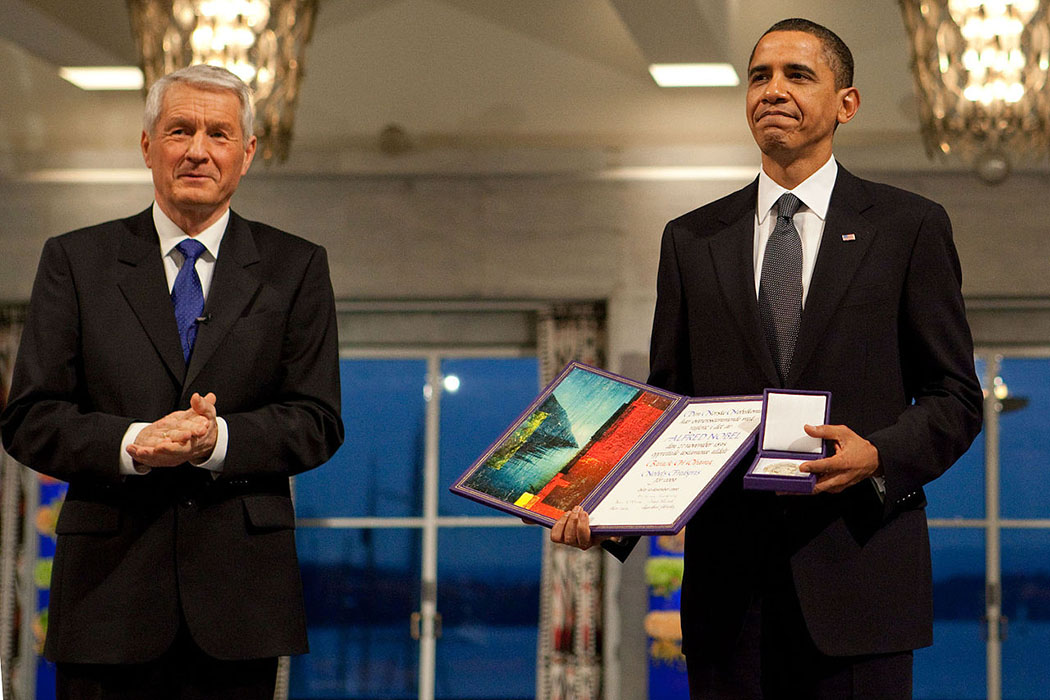
Obama receiving the 2009 Nobel Peace Prize
|
Certainly, one of the big things Obama had
promised to do when campaigning for the presidency was to bring
American troops home from Iraq and Afghanistan. Actually, since the
introduction of the surge by Bush in 2007, and the huge drop in
violence in Iraq as a result, Bush himself had started the process of
removing U.S. troops from Iraq. Obama meanwhile had campaigned on the
basis of a 16-month timetable for troop withdrawal.
Upon entering the White House in early
2009, Obama announced that combat operations would end in Iraq by
August 2010. Troops levels were to be reduced by that date to only some
30,000-50,000 troops (from the current 142,000 troops). Troops
remaining after that date would serve only in the training and advising
of the Iraqi security forces. And by the end of 2011 all American
troops should be out of Iraq.
In June of 2009 American troops were
withdrawn from the streets of Baghdad and other cities to give security
duties over to the growing Iraqi forces. At first violence increased,
largely the work of insurgents of one variety or another. But by the
end of the year the Iraqi forces seemed to be gathering momentum in
securing the safety of Iraqi streets.
And indeed, Obama was able to keep his timetable, at least to the
extent of having reduced troop size to about 52,000 non-combatant
troops still in Iraq as of August 2010.
In the meantime, in early March of 2010,
Iraqis again went to the polls to elect 325 members of a new
parliament. The results were inconclusive as no single party or even
coalition of parties gained an absolute majority so as to be able to
form a new cabinet government. Ayad Allawi's Iraqiya party gained the
most votes (91 members) followed closely by the Islamic Dawa (State of
Law) coalition party of the incumbent Prime Minister Nouri al-Maliki
(89 members). But a deadlock set in on Iraqi politics as no party was
willing to compromise enough to form a coalition government. Allawi's
party was "moderate" Shi'ite with some Sunni support (and probably the
preferred choice of most Westerners); Maliki's party was more narrowly
Shi'ite and even in coalition with al-Sadr's militantly Shi'ites. No
one seemed to know how to patch together a coalition large enough to
form a voting majority in Parliament. Month after month negotiations
dragged on.
Finally on December 15th (2010), nine
months after the national elections, Iraq formed a coalition government
under al Maliki after Ayad Allawi's Iraqiya party agreed to join as
junior members even though they had received more votes than Maliki's
coalition party. Iraq finally had a government, though how it would
handle tense relations among Shi'ites, Sunnis and Kurds, as Americans
began pulling back as a kind of political referee, remained in question.
The year 2011 saw Obama attempting to
negotiate some kind of understanding with the Maliki Government as to
the character that continuing U.S. support was to take. But the talks
bogged down and in October Obama simply announced the full withdrawal
of U.S. fighting forces in Iraq by the end of the year. Not
surprisingly, the day after the pull-out of the last of the American
combat troops on December 18th, Maliki issued the warrant for the
arrest of the Iraqi Vice-President Tariq al-Hashimi (a Sunni), who fled
to the Kurdish region of Iraq! Sectarian politics now had a free hand
in Iraq.
Consequently, Iraq itself would continue
to be a scene of ongoing sectarian strife, Sunni insurgents (involved
closely with al-Qaeda) against the Shi'ite-dominant Government in
Baghdad and the new (mostly Shi'ite) Iraqi Army. Shi'ite mosques and
holy sites were frequently bombed by a rising Sunni insurgency, and in
mid-2013 occurred the spectacular escape from the infamous Abu Ghraib
prison of 500 Sunni insurgents, including key al-Qaeda leaders.
In 2014 the Iraqi Parliament finally
forced Maliki to step down. His place was taken by Haidar al-Abadi,
another Shi'ite (of course) but also a more moderate Westernizer (Ph.D.
in electrical engineering from the University of Manchester, England),
who would try to bring greater Sunni and Kurdish participation in the
Iraqi government, as well as a cleaning out of the personal corruption
that had infected the Iraqi army under Maliki. Relations with Arab
neighbors, and Western societies (including the U.S. which sold
$billions in military equipment to Iraq) improved greatly. However,
al-Abadi would gradually look more and more to Russia and Iran for
serious assistance, as problems with the Sunnis (and their new
Caliphate) continued to grow over the next years. Al-Abadi would remain
as Iraq's Prime Minister until October of 2018.
|
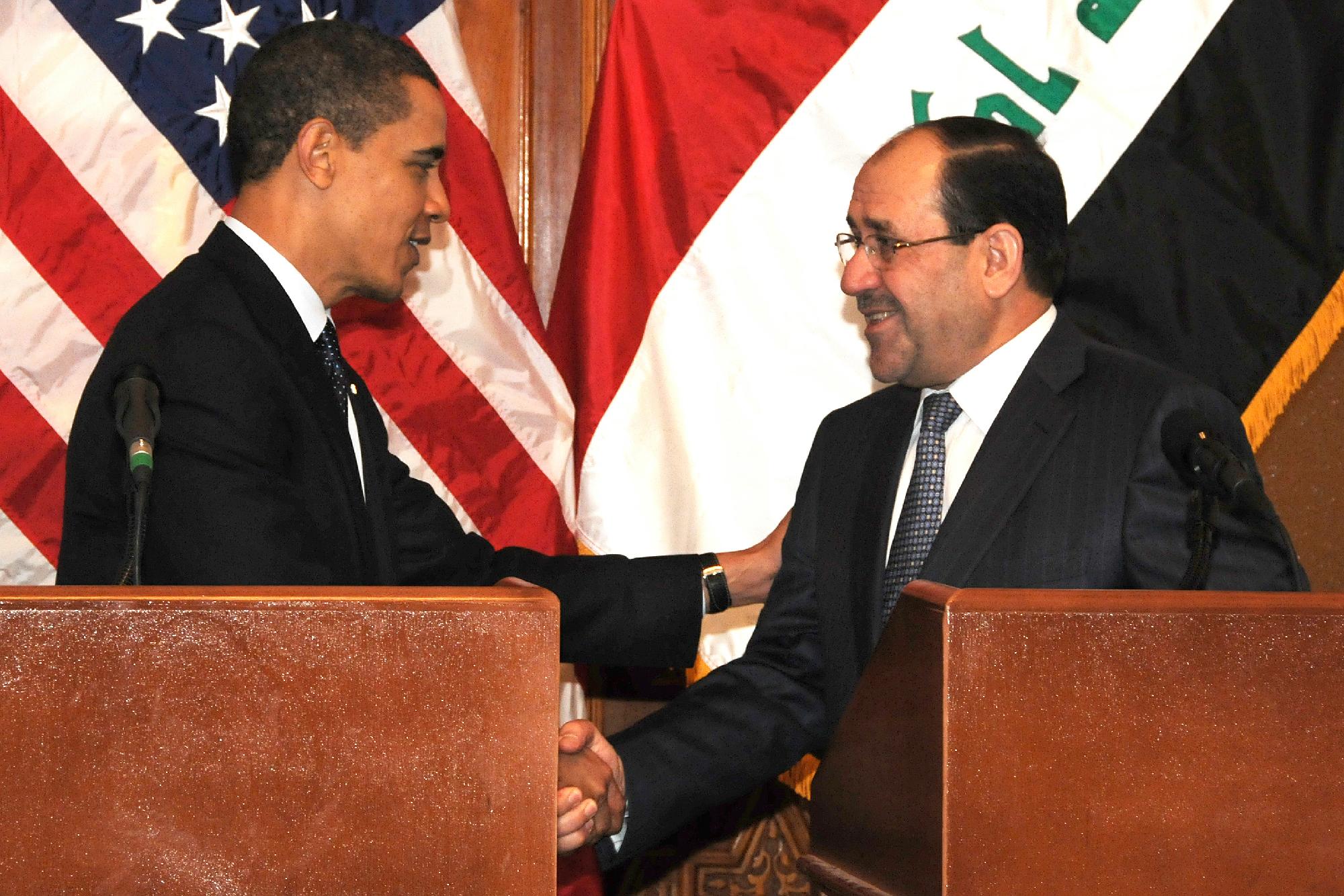
President Barack Obama shakes
hands with Iraqi Prime Minister Nouri al-Maliki after a joint press event
on Camp Victory, Iraq, April 7, 2009.
Obama spoke to hundreds
of
U.S. troops during his surprise visit to Iraq to thank them for their
service.
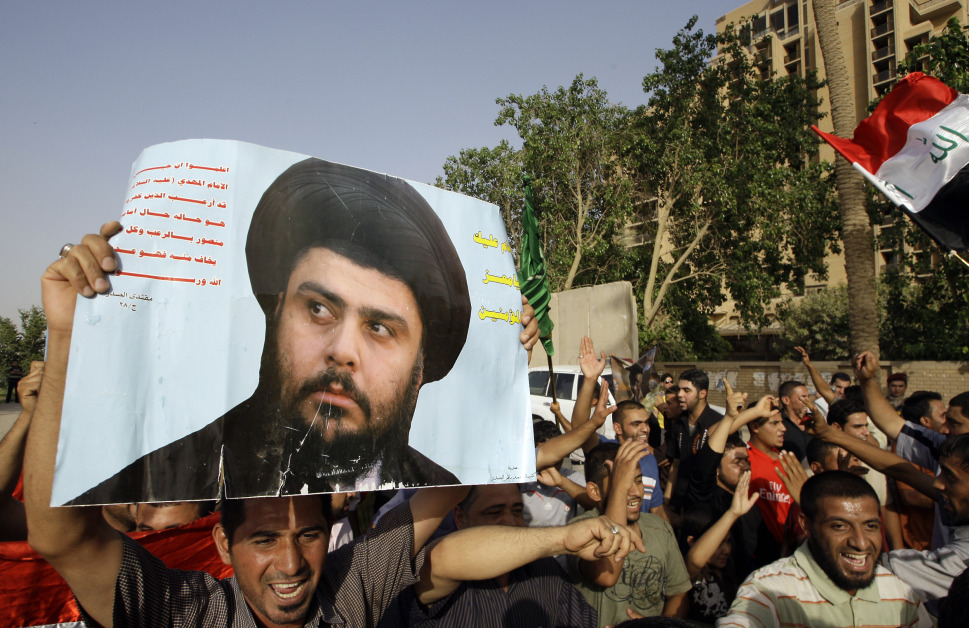
Supporters of Iraq's Sadr
movement hold a picture of al-Sadr
as they march in the Karada
district of central Baghdad on May 31, 2010. 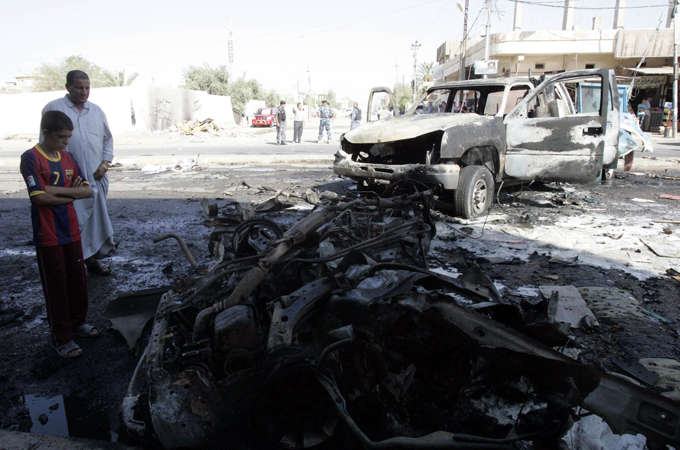
Iraqis examine the wreckage
of vehicles destroyed in a car bombing in Kirkuk – August 2011
| Although Iraq has passed the peak
of the violence that hit its country in 2006 and 2007, the level of attacks
on the civilian population by suicide bombers and by car bombs parked along
busy intersections or markets remains high. In July of 2011 259 people
were killed. On one day alone in August (the 15th) 75 people were
killed in 8 different attacks, the worst in Kut where 34 were killed, Najaf
where 19 were killed, and Baquba where 13 were killed. |
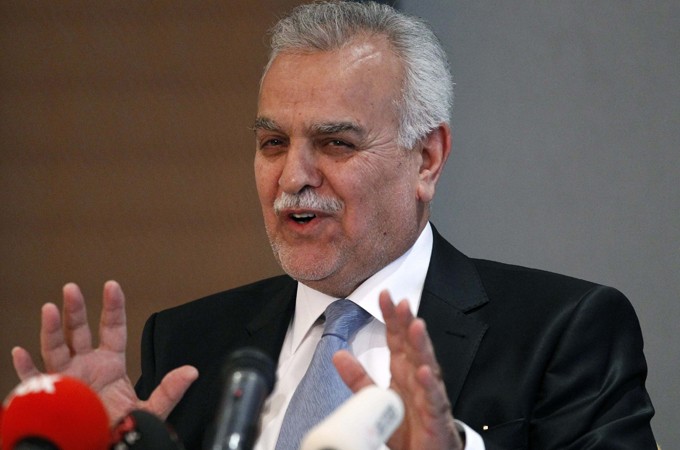
The Iraqi vice president
Tariq al-Hashemi and his son are sentenced to death in absentia
(September
9, 2012)
Hashemi fled the country
to Turkey when the al-Maliki's Shi'ite government put out an arrest warrant
for Hashimi, who as a Sunni vice president
was supposed to symbolize
the new unity of "democratic" Iraq ... that thousands of American soldiers
died to establish.
The verdict of the court was accompanied the same day by sectarian violence that left over 100 Iraqis
dead in 10 cities.
THE ONGOING WAR IN AFGHANISTAN |
|
In Afghanistan, Obama took a different tack than
he had in Iraq. To the great distress of his Democratic Party
supporters, in February (2009) Obama announced that America would not
at the present be leaving Afghanistan. Instead Obama would be deploying
an additional 17,000 troops to Afghanistan in continuation of Bush's
recent surge effort against the Taliban. But the Afghan surge seemed
not to have the same effect in Afghanistan that it had in Iraq. The
Taliban insurgency seemed to be able to bounce back here and there as
American troops made the effort to try to secure first one area and then
another. The Taliban's ability to retreat into Pakistan where Americans
were not allowed to pursue them was a big part of the problem. As long
as they had the Pakistani sanctuary, they could not be seriously
removed from the region. Americans were profoundly handicapped in their
efforts to clear Afghanistan of the Taliban insurgency.
A worried Afghan President Hamid Karzai
began to conduct discussions with the Taliban, and suggested that
America do the same. In Karzai's thinking, America was becoming less
reliant as an ally in terms of securing a political future for his
regime. Americans were shocked that Karzai would be such an "unstable"
ally (it was America, after all, that had put him in power), another
indication that America really did not understand how politics worked
in that part of the world.
Then in December Obama announced the
deployment of an additional 30,000 troops in Afghanistan during the
next year (2010). But to deflect a growing anti-war protest movement in
America, he also announced that America would begin troop withdrawals
from Afghanistan by the summer (July) of 2011. This too put Karzai on
the spot, for the Obama message was a bit ambiguous: where did America
really stand in terms of securing the Afghan political future? The
Taliban took note of this and seemed to gain new boldness.
Meanwhile tensions with Pakistan began to
grow over the way al-Qaeda and Taliban fighters easily found sanctuary
(even training camps) inside Pakistan. Then with WikiLeaks publishing
tens of thousands of classified U.S. military documents in July (2010)
it also became apparent that the Pakistani Intelligence Service (ISI)
was suspected by U.S. agents of actively supporting the Taliban.
|
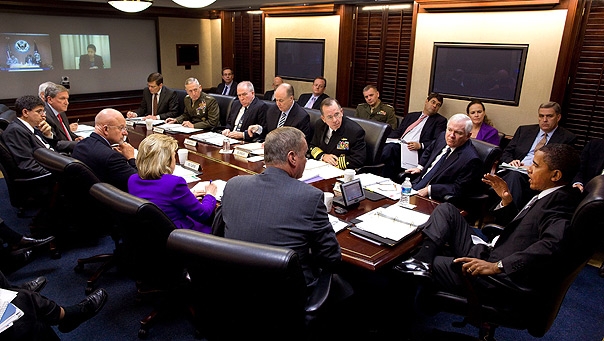
Oct. 20, 2010: President
Obama meets with his national security
team on Afghanistan and
Pakistan in the Situation Room. 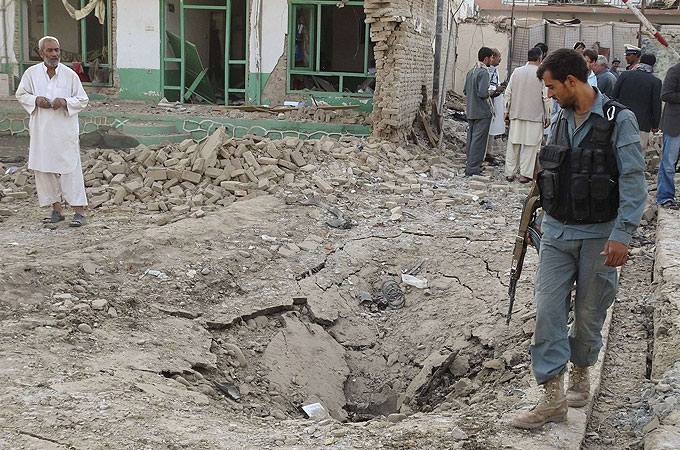
At least four die from a
Taliban attack on guest house frequented by foreigners
in the formerly
quiet Kunduz province – August 2,
2011 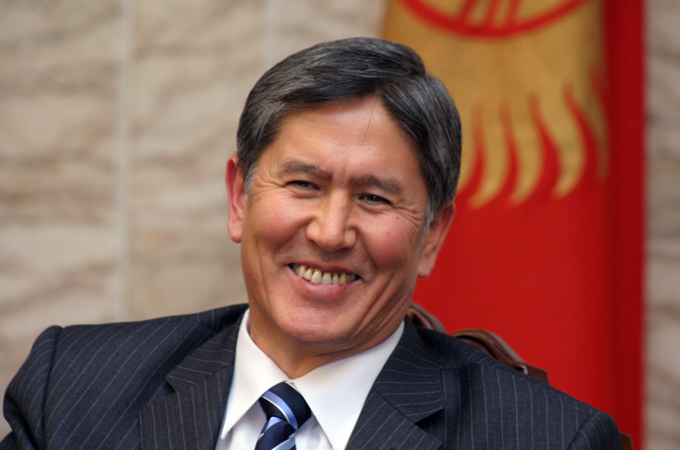
President Atambayev of
Afghanistan's
neighbor Kyrgyzstan (took office on December 1, 2011)
is demanding the closing
of the American Manas air base in
his country by 2014. It was
opened in 2001 to support US military operations
in Afghanistan. Obama had the American
troops vacate the airbase in June of
2014.
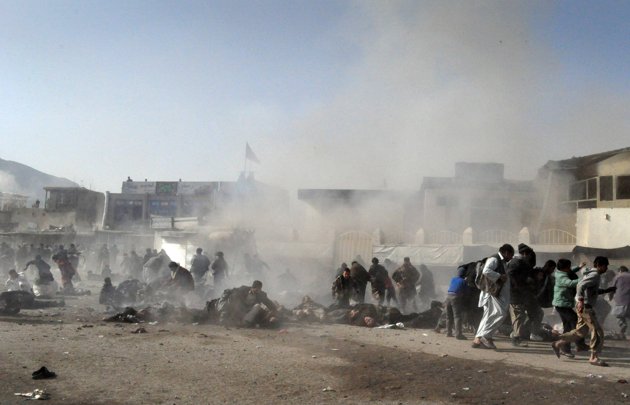
A bomb is exploded among
Shi'ite worshipers – December 6, 2011
60 people killed (20 more would
eventually die)
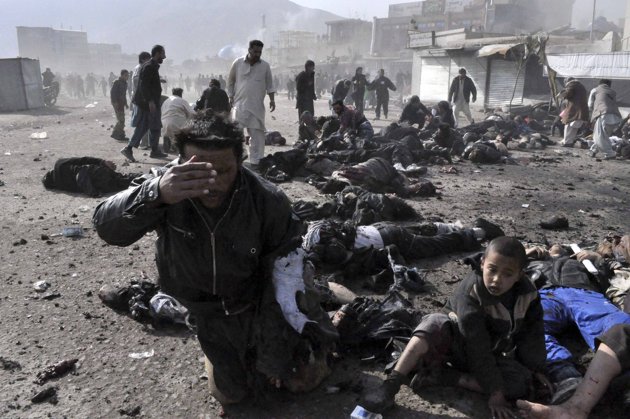
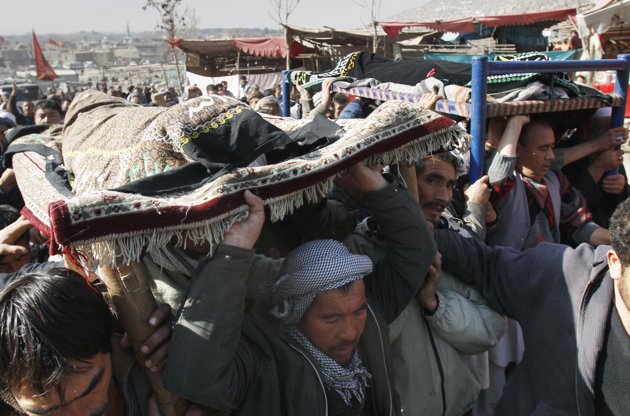
BIN LADEN IS KILLED (MAY 2, 2011) |
|
Without any warning or prior approval from
Pakistan (which the U.S. was not likely to get anyway) a team of two
dozen Navy SEALs was dropped by two Black Hawk helicopters on the
bin-Laden compound, located less than a mile away from the Pakistani
Military Academy, the compound identified earlier to U.S. authorities
by a former Pakistani intelligence officer (for the tidy sum of $25
million). The Pakistani ISI had quietly put bin-Laden under something
like house arrest, supposedly to keep him from troubling further
Pakistan's diplomatic waters. But on the other hand, ISI was not
willing to give him up to any U.S. agents looking for him.
In the surprise operation, bin-Laden was
killed on site, and his body flown out with the SEALs, and rather
quickly transferred to a U.S. aircraft carrier and, after the
performance of the appropriate Muslim burial rites, was dropped into
the Arabian Sea.
The Pakistanis were furious, but in the
end did nothing. And thus closed a major 10-year-old chapter in
American life. And ... Obama came away looking very presidential!
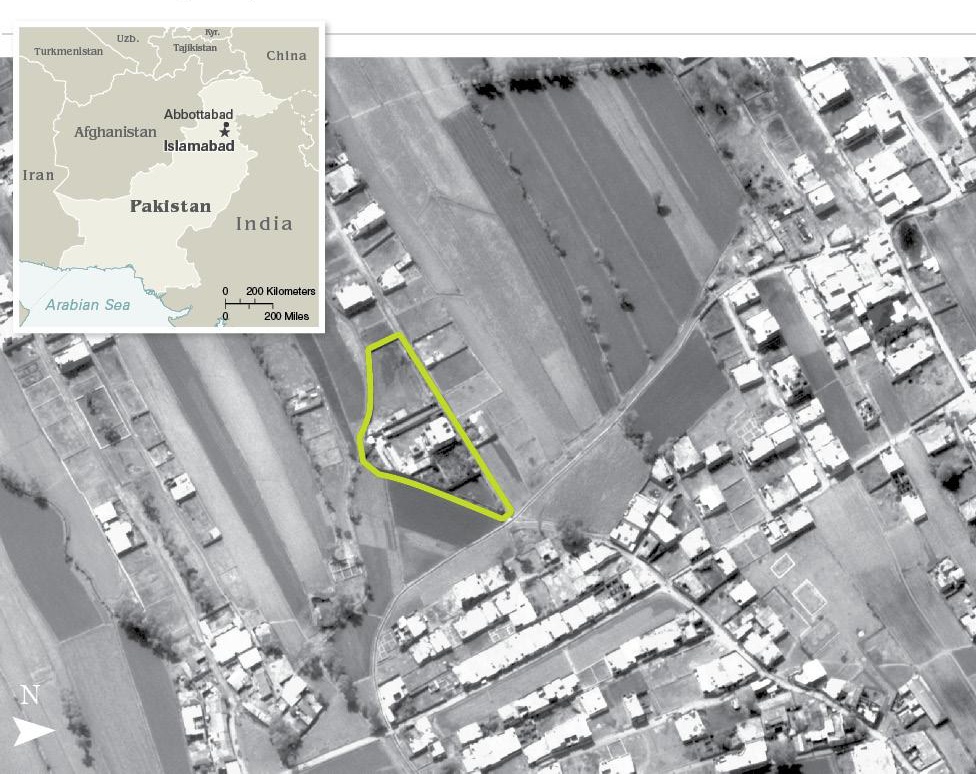
Aerial view of Osama bin
Laden's compound in the Pakistani city of Abbottabad made by the CIA
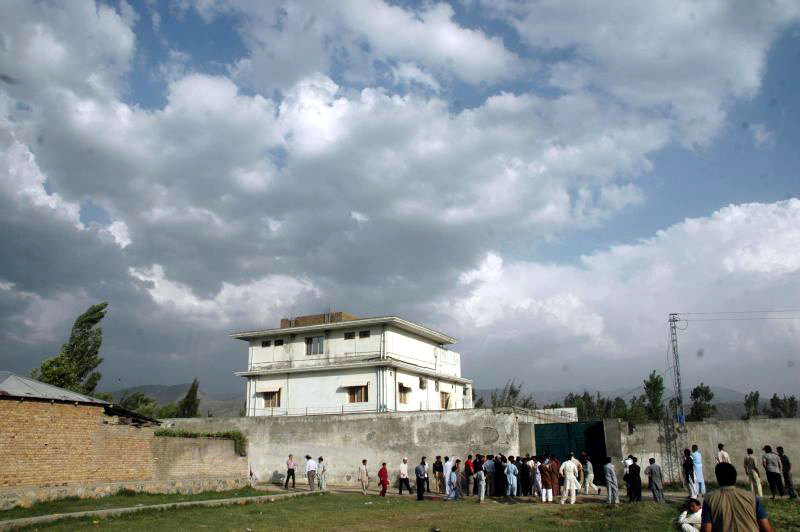 Osama bin Laden's compound
at Abbottabad
Osama bin Laden's compound
at Abbottabad
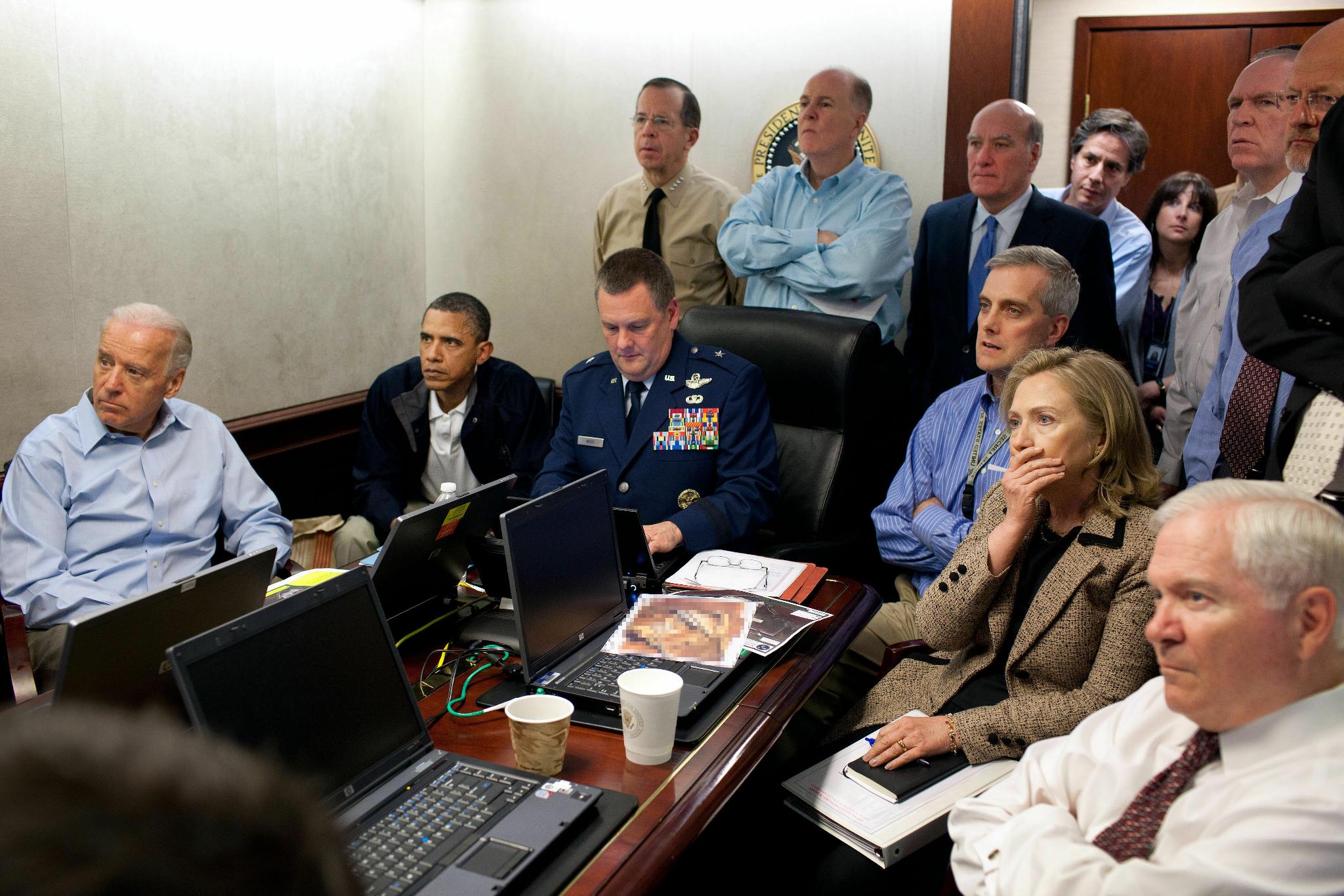
Obama and the national security team
await updates
on bin Laden
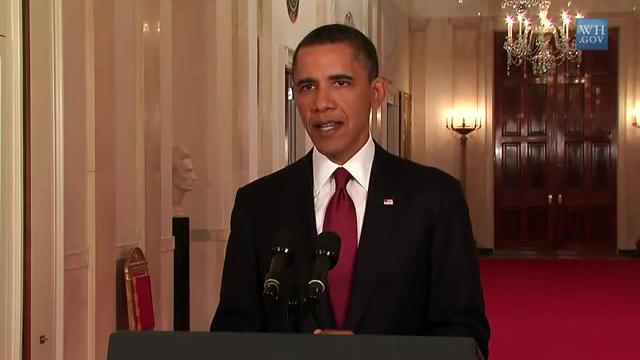
President Obama announces the death
of Osama bin Laden
– 11:00 p.m. that same night
THE NATO TROOP DRAW-DOWN IN AFGHANISTAN |
|
Obama's announcement of a huge U.S. troop
withdrawal in Afghanistan was accompanied by similar announcements
coming from America's NATO allies working with the U.S. in Afghanistan:
Great Britain, France, Belgium, Canada, Spain, Norway, etc. The
transition time was to be in the 2012-2014 time period, with whatever
Western troops remained after that date to be there only for ongoing
training purposes with the Afghan army.
In May of 2012 Obama flew to Kabul to
sign an Enduring Strategic Partnership Agreement pledging continuing
American support for the Kabul government, although what that meant in
specific terms was not entirely clear. Only time would reveal the real
meaning of this new American-Afghan alliance.
Not surprisingly, the withdrawal of
American and NATO combat troops led to a large increase in Taliban
attacks on Afghan troops and government-aligned villages, as well as
insurgency attacks on Kabul itself.
Nonetheless, the end of 2014 arrived and,
with great ceremony, the last of the Western combat troops were
withdrawn from Afghanistan, although some 17,000 multinational (mostly
NATO) counter-insurgency troops would be sent to Afghanistan beginning
in 2015 (as well as "private" contract soldiers, made up largely of
veteran U.S. and NATO troops) under the Resolute Support Mission
agreement issued by NATO officials and even supported by the United
Nations Security Council. Their purpose was to train and otherwise
support the Afghan Army in its effort to combat activities of the
Taliban, and other insurgency groups operating from Afghanistan.
THE "ARAB SPRING" BREAKS OUT IN TUNISIA (December
2010) |
|
In early 2011 (actually getting a start in late
2010 when a young Tunisian set himself on fire in protest against
police corruption), street protests swept through the Middle East,
country after country, as if on signal Arab youth got the message to
hit the streets in revolt. Actually, the same spirit soon infected
other youth around the world (Greece, Italy, England, America, Japan)
inspiring them to take up the same cause: to oppose the injustice of
the political and economic systems they were living under. They
demanded, often quite violently, justice to reign throughout their
lands. What that meant was not always very clear, except it usually
meant the toppling of the current governments or their societies'
leading economic and social institutions, and their replacement
(somehow) with more "progressive" political and economic regimes.
Blame cannot be laid at the feet of
Obama, although one of the first acts of his presidency was for him in
June 2009 to fly to Cairo (Egypt) and there deliver a speech entitled
"A New Beginning," widely covered around the world. He was intending to
mend the "severely damaged" Muslim-American relations caused by the
previous Bush, Jr. presidency. He indicated that not only would he take
a quite different stand with respect to the Israeli-Palestinian issue
than had been the American case previously, but that he was going to
work to improve relations with the Iranians. He talked about seeking a
new partnership with the Muslim world, especially to bring greater
democracy, personal freedom, and economic development to that part of
the world. Certainly it sounded as if America would therefore be
willing to take a stand in support of those seeking a new realm of
Western-style "justice" in the Middle East.
Actually, this speech to the people of
the Middle East by-passed a number of allied governments in the region
which had long been working closely with America in trying to keep Arab
tempers from flaring into crisis mode, especially the Egyptian
government which had been strong supporters of at least something of a
working relationship with Israel. Also the West needed no more oil or
energy crises resulting from political disruptions. Indeed, the West
depended on very strong (some would even say authoritarian or
dictatorial) allied Arab regimes to keep matters under control. This
was true in a number of cases, especially Saudi Arabia and Egypt, with
which America had been working closely to keep the Middle East settled
down.
But now it seemed that Obama was sending a message to the Arab world
that America's position was about to change. Indeed it would, but with
much wavering along the way (much like America's years under Carter).
Thus the Arab world soon found itself in confusion as to the exact
nature of America's Middle East policy.
The Arab Spring starting in Tunisia spreads abroad quickly
Unemployment (especially dangerous when
occurring among well-educated and thus highly-expectant youth), high
inflation rates, the hoarding of the society's wealth by a small number
of families, and widespread government corruption, finally brought
young Tunisian protesters out in huge numbers in January of 2011. The
fact that these protests were well-covered by the media and immediately
visible to the youth of the Arab world with their full access to that
media via their computers and cell phones, made these protests develop
an intense energy not only in Tunisia but also across the Arab world in
general, where political perceptions of the Arab youth were very
similar in nature.
By the middle of January, the Tunisian
Government of Zine ben Ali had collapsed, with ben Ali fleeing the
country to avoid arrest. By the end of that month street protests were
hitting hard in Algeria, Egypt, and Yemen (among others) and in
February protests spread further across the Arab world, most notably to
Libya and Syria.
In Tunisia itself the protests continued
on and off as coalition governments were formed and then dissolved in
the weeks and months ahead. Elections were finally held in October for
representatives to a new Constituent Assembly pledged to writing a new
constitution for Tunisia, the new constitution finally presented for a
vote in January of 2014. In parliamentary elections held that October,
most notably the Islamist political groupings that had grown during the
period of protest received a major setback, when the secular Nidaa
Tounes party took the lead instead. The Tunisians clearly indicated
that they did not want their country to turn itself into some kind of
Iran-like Islamic Republic.
|
Obama's earlier "New Beginning" Speech (June 4, 2009)
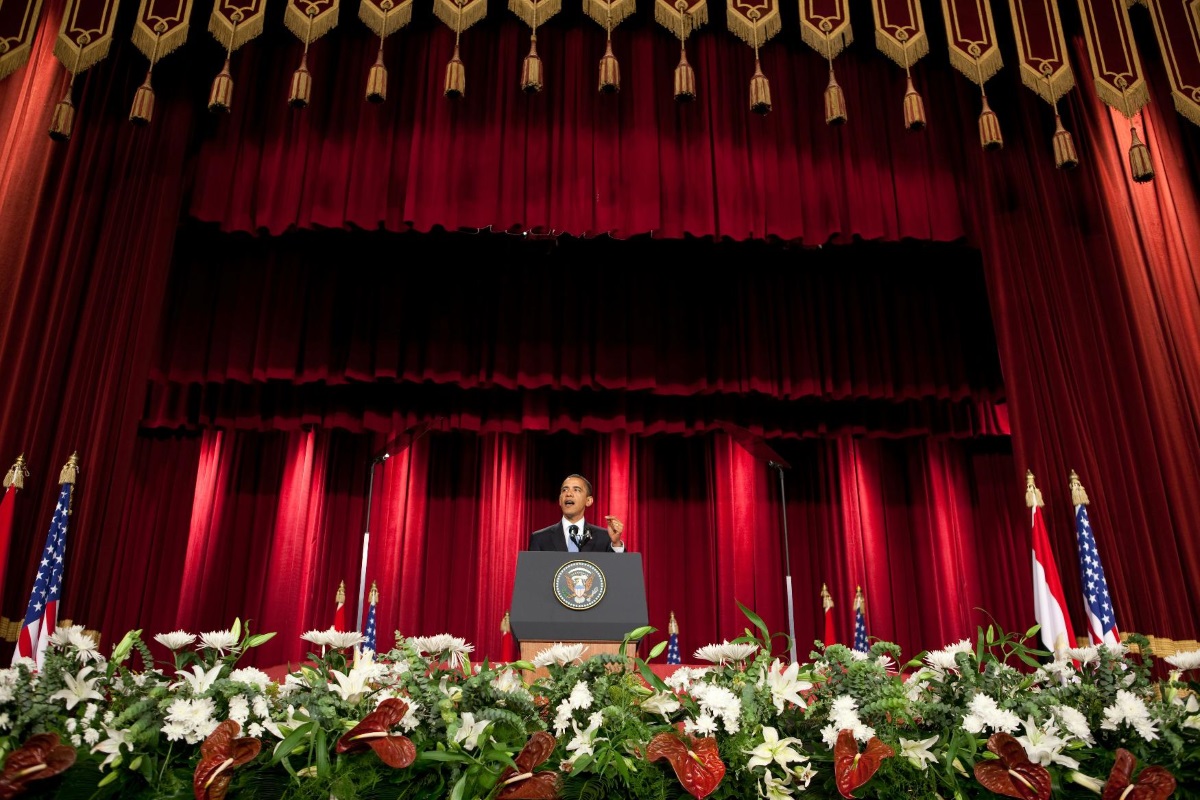
Obama's Cairo speech to the
Muslim world inviting the Muslims to seek a "new beginning"
... citing his own Indonesian experience and personal family background in Islam and
noting the distinction between peaceful Muslims and violent extremists,
declaring that "this
cycle of suspicion and discord must
end"
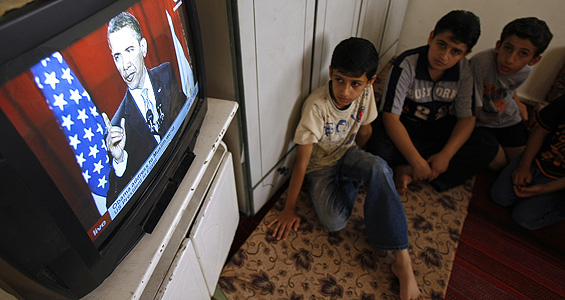
But that "New Beginning" seems to come from the Arabs' own initiative:
The "Arab Spring" of 2011
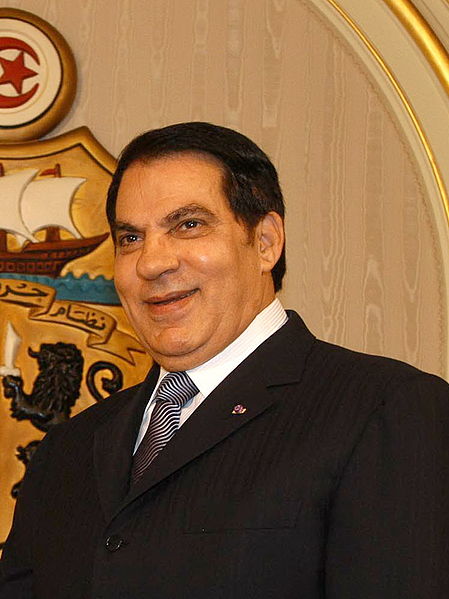
Zine El Abidine Ben Ali (2008)
President of Tunisia
(1987-2011) 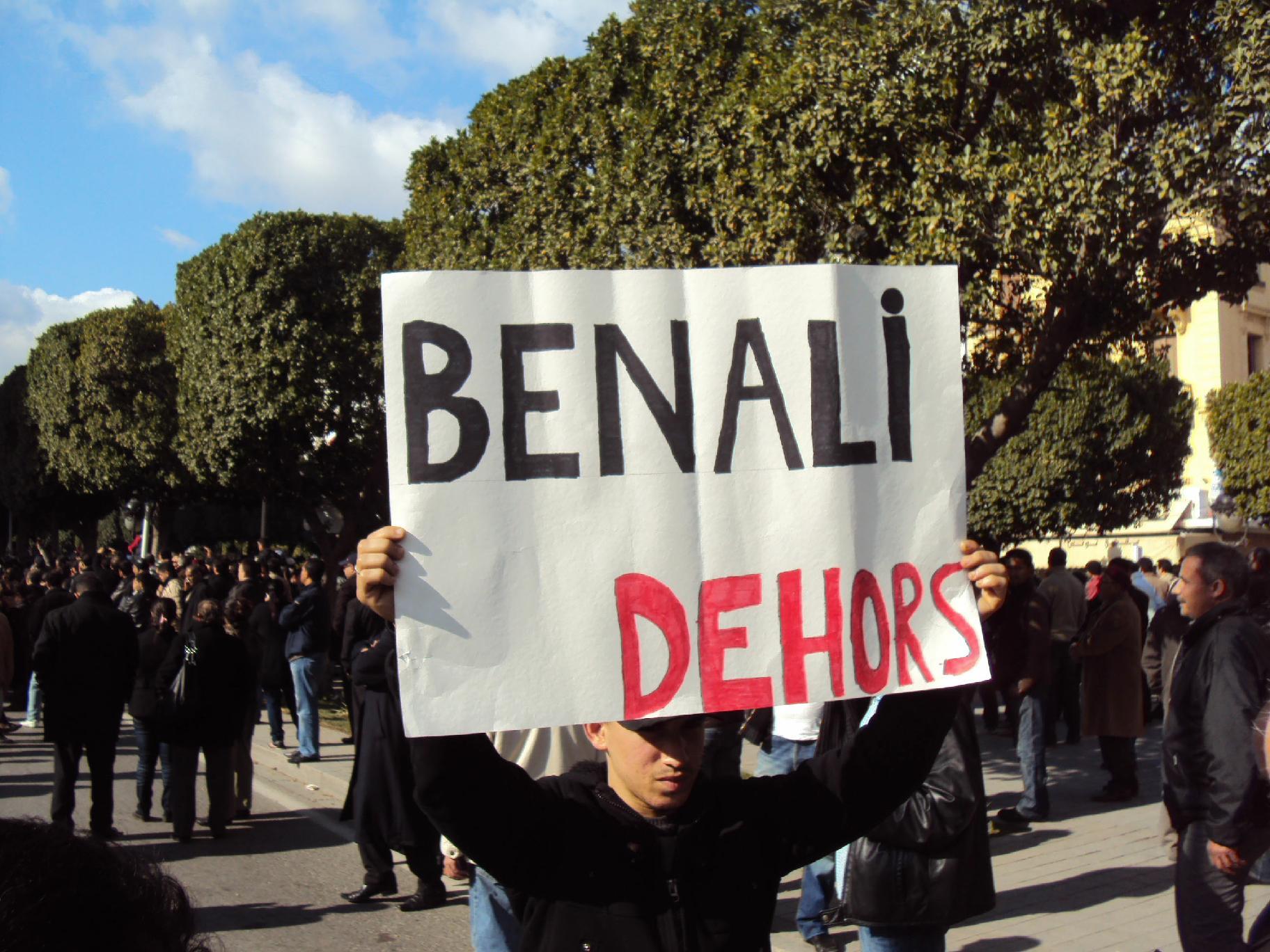
"Out with Ben Ali" (14 January
2011)
Protesting unemployment
high food prices, corruption
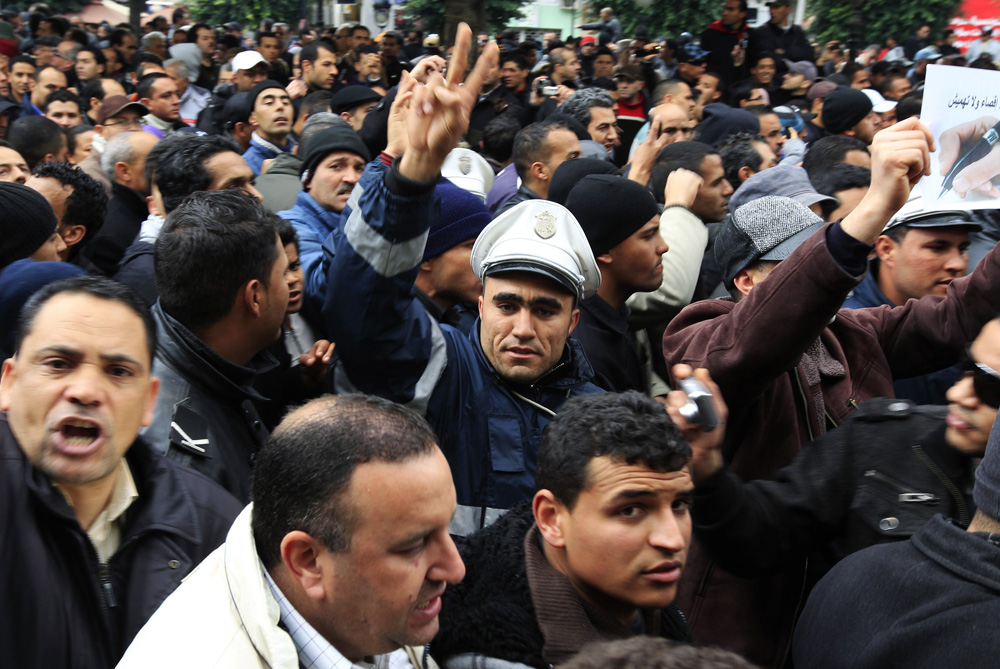
Tunisian
Protesters
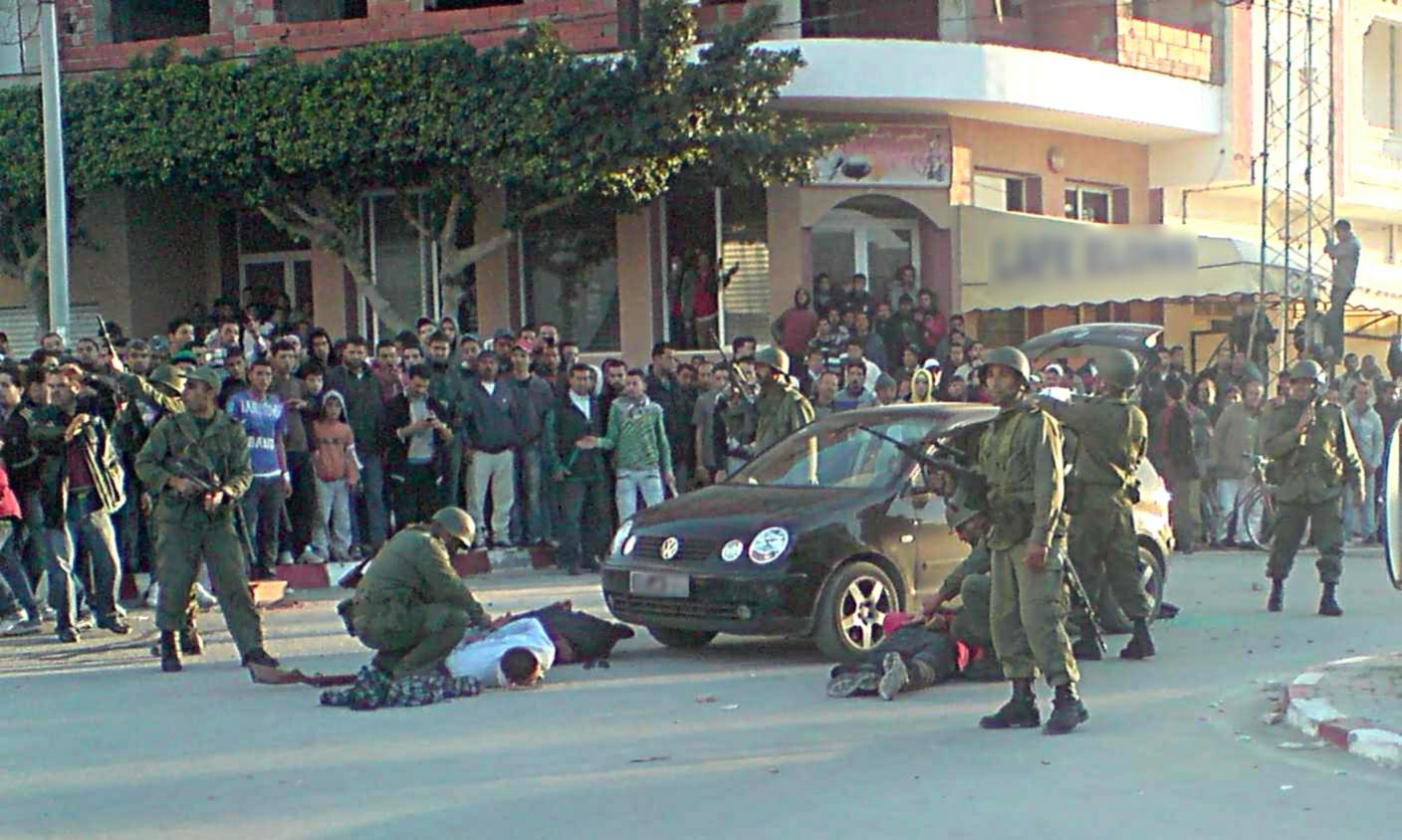
The Tunisian National Army
restored order in absence of police services.
The picture shows a civilian
who was stopped because of a weapon in his car (15 January 2011)
THE "ARAB SPRING" VIOLENCE SPREADS QUICKLY TO EGYPT (JANUARY 201) |
|
Before the end of January of 2011, the "Arab
Spring" had come to Egypt as well, when thousands of youth gathered at
Tahrir Square to protest the long-standing (almost 30 years) government
of Hosni Mubarak, and the likelihood that his son Gamal was going to
take over his father's position as the aged Hosni's health worsened.
Also, Egyptians were tired of living under the Emergency Law, which
extended to the government unlimited police powers, enacted as far back
as 1967 but in particular since 1981 when President Sadat was
assassinated by Islamic jihadists. Since that time the Emergency Law
had been justified as a means of keeping a tight grip on the militant
Islamic Brotherhood.
Mubarak responded to the protesters by
shutting down the internet (understanding how the new generation of
youth got themselves together for action), changed personnel in his
cabinet, and appointed an Egyptian Vice President. But this did not
disarm the protesters, the numbers of which continued to grow rapidly
... and then became violent when Mubarak moved the military into Cairo
to restore order. In mid-February the Egyptian military command finally
took full control of the Egyptian government (it had been the actual
basis of Egyptian national power seemingly forever), arrested Mubarak,
and promised to undertake various Constitutional reforms and hold
elections that fall.
But the protesters were not inclined to
vacate Tahrir Square, which, through the spring, the summer and into
the fall, became the scene of increasing violence as clashes developed
between those for and against the military government, that is,
basically secular versus Islamist Egyptians. At the same time the
atmosphere of violence spread through the whole city, as Muslims now
attacked Christian churches (Coptic Christians made up about 10 percent
of the country's population). By the end of November, the violence
reached horrible proportions, just as the process of holding elections
for the new People's Assembly was put in place. Then the following May
(2012), the first round of the elections were held for the presidency
under the new Constitution. And in June, with legal questions of all
varieties being fought out in the Egyptian courts, the final round in the
presidential elections was held, with the Muslim Brotherhood's
candidate Mohamed Morsi winning the election with 51.7 percent of the
vote, and the secular candidate Ahmed Shafik winning 48.3 percent. It
was a very close race, representative of the secular-Islamic cultural
divide of Egyptian society itself. There were, of course, claims and
counter-claims as to the fairness of the elections themselves.
Obama was nonetheless quick to offer his
congratulations to Morsi, claiming that these elections constituted a
milestone in the country's transition to democracy. Maybe. But it would
be "democracy" Egyptian (or Muslim) style. Obama also announced that he
was looking forward to working with Morsi on the basis of mutual
respect and shared interests. But there was little likelihood that
America was going to have many shared interests with Morsi's Muslim
Brotherhood, an organization that stood solidly behind the bringing
down of the Twin Towers in New York City in 2001. Was Obama serious, or
were these just nice words of diplomacy?
Shafik meanwhile understood clearly what
his electoral loss to Morsi meant for him personally, and immediately
left Egypt for the United Arab Emirates. Soon thereafter Morsi issued
an arrest warrant for Shafik, on charges of "corruption." So much for
Egyptian democracy.
In any case the protests in Tahrir Square continued, for the youth were
looking for secular reform, not life under fundamentalist Islam. At the
same time, work on a revised constitution took a sharp political turn
when secularists walked out rather than see the country come under a
fundamentalist Islamic constitution. The situation worsened when that
November Morsi issued a Declaration authorizing himself to take
whatever powers necessary "to protect the revolution." The resulting
reaction between protesters and police turned extremely violent.
By the next spring (2013), Egyptian youth
had drawn up a petition with 22 million signatures calling for a new
round of presidential elections. Then on the day marking the
anniversary of Morsi's inauguration (June 30th) not just Tahrir Square
but street after street of Cairo was filled with angry protesters
calling for Morsi to step down. After a warning to Morsi by the
Egyptian military to do just that – which, not surprisingly, Morsi
refused to do – the Egyptian military under General Abdel Fattah
el-Sisi declared martial law and removed Morsi from power, putting Adly
Mansour in place as Egypt's interim president. The next year (2014), in
a new round of elections (boycotted by the Muslim Brotherhood), Sisi
would himself be elected by 96 percent of Egypt's actual voters as
their new president.
Obama was very upset at the June 2013
setback to Egyptian "democracy" (although softened a bit in his ire by
the widespread demonstration of Morsi's unpopularity in Egypt), and
made the decision simply to cease further sales of strategic materials
(such as the F-16 fighter jet) to the Egyptian military, as a
demonstration of America's (or just Obama's) resentment against the
fall of Egyptian "democracy" with the military takeover of Egypt.
What Obama seemingly failed to realize
was that there were really only two serious options in the governing of
Egypt, as there were only two social groupings well-enough organized to
take political control of Egypt. And one of those was not some secular
political party, such as the kind that used to give some degree of "centrist" order to American politics1
(namely, once upon a time, the Democratic and Republican Parties). In
Egypt there existed only the well-organized Muslim Brotherhood on the
one hand and the rather Secular Egyptian military on the other, neither
of which were ever likely to take on the "democratic" character that
Obama presumably dreamed of.
Sadly, Obama's decision to cut back
American support of the Egyptian military simply sent Egypt off in new
directions in the quest for strategic allies, principally to France and
Russia. Consequently, America would lose significant positioning in the
Middle East because of this move against Sisi and the Egyptian military.
1Actually,
thanks to Obama's policy of deep, deep social-moral "change," America
itself would divide into two very hostile groups, those supporting
traditional American culture, and those wanting it overthrown in every
way possible. Thus the "center" of American politics would simply
disappear during those eight years of the Obama presidency ... and
certainly not reappear as America entered either the Trump or the Biden
eras.
American politics itself would take on a "Third World" character – as a
mob assault on Capitol Hill on the day of certifying national election
results ... or as Congressional attempts to convict a president of some
crime in order to throw him out of office (even have him carried off in
arrest) have become part of the political game played in Washington ...
not quite yet successful in operation, but certainly gladly attempted
as a now-acceptable response to electoral dynamics. American politics
and Egyptian politics are thus taking on similar qualities.
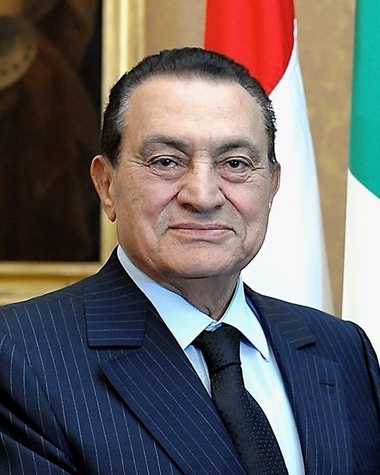 Egyptian President Hosni
Mubarak in 2009
Egyptian President Hosni
Mubarak in 2009
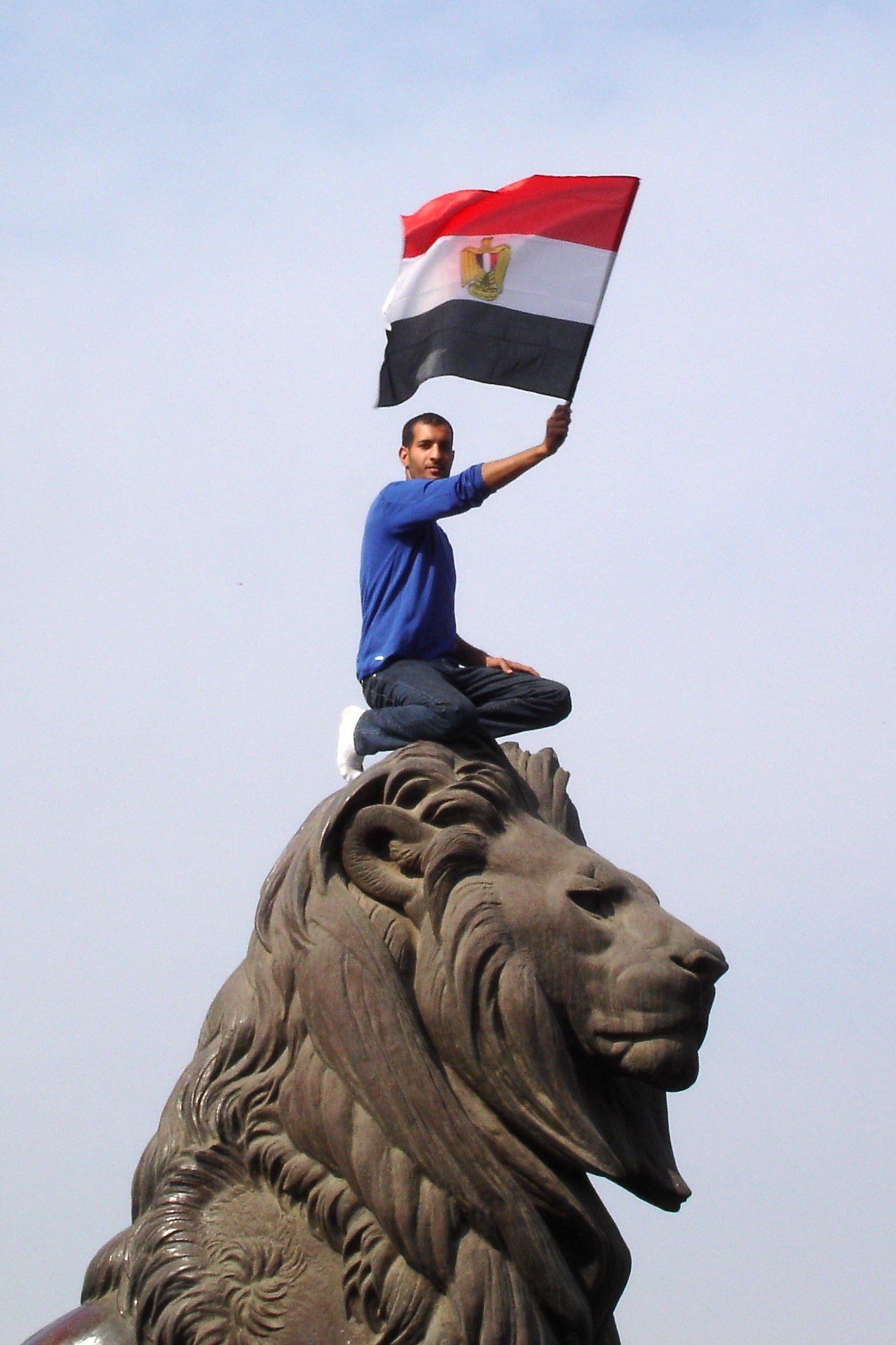
A picture of an Egyptian
protester holding the Egyptian flag – February 1, 2011
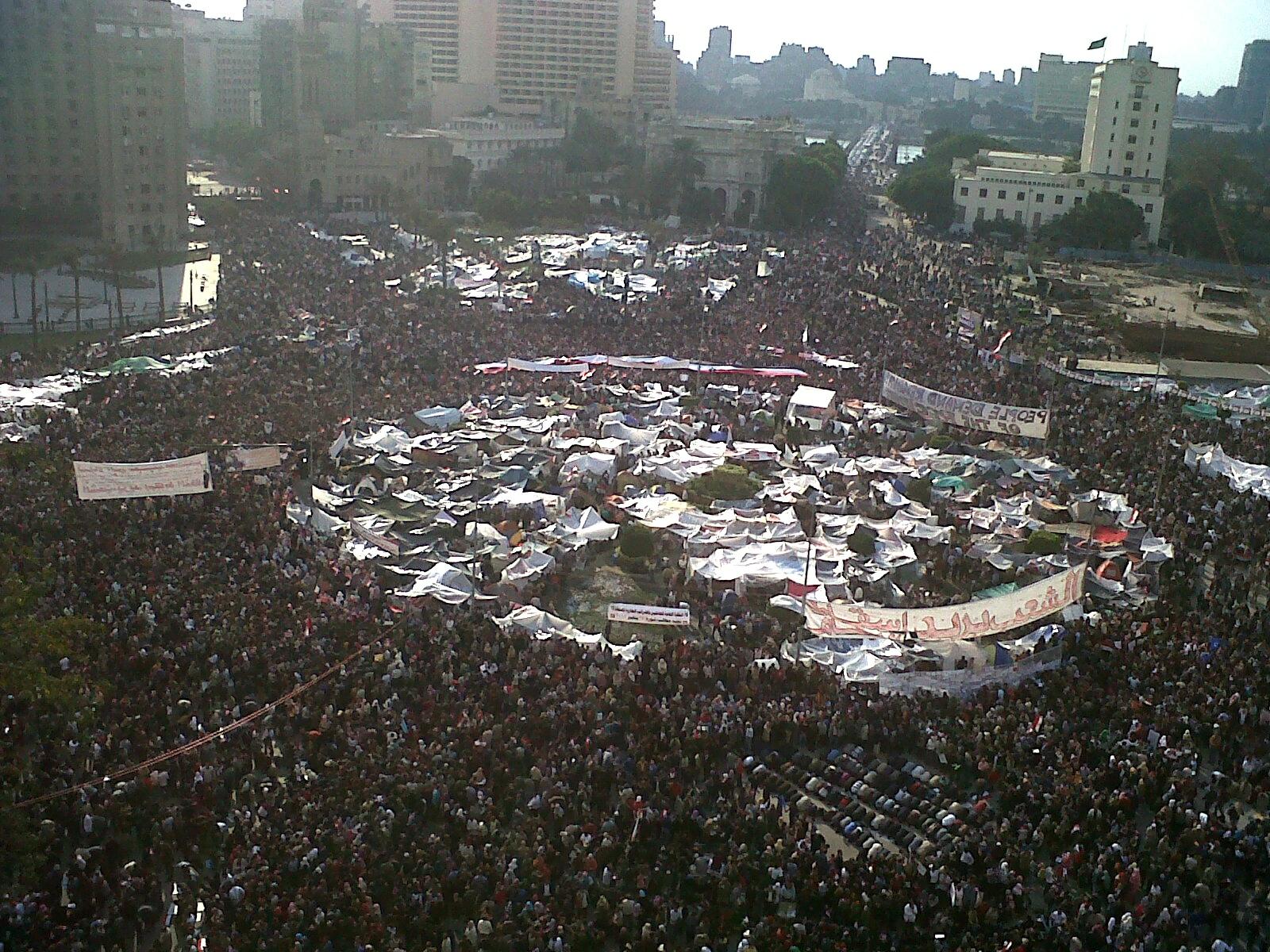
Demonstrators in Cairo's
Tahrir Square on 8 February 2011
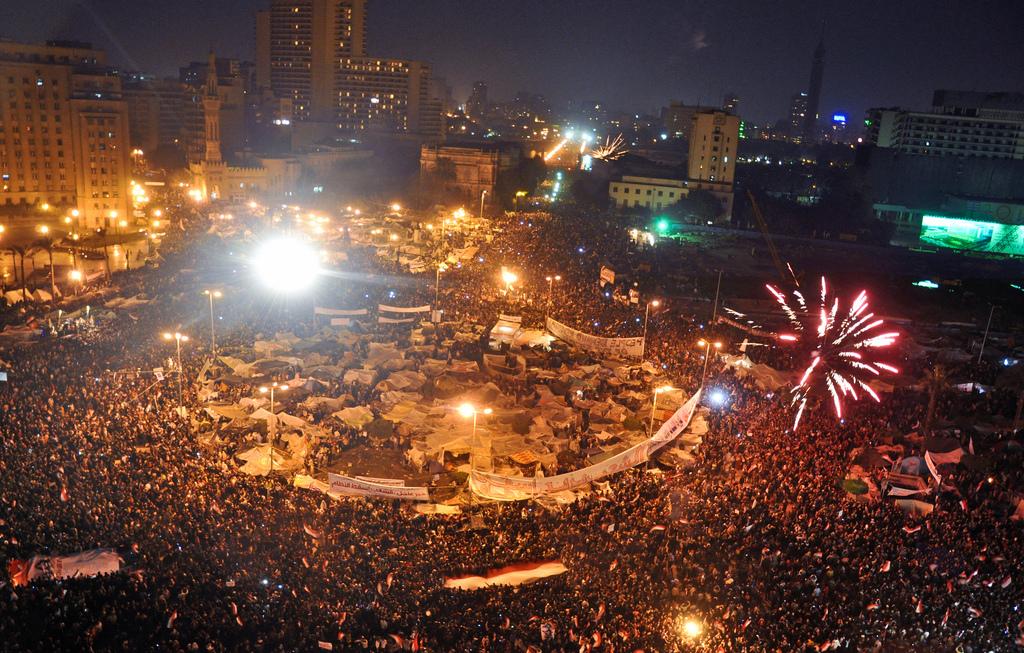
Celebrations in Tahrir Square
after Omar Soliman's statement
that concerns Mubarak's
resignation. February 11, 2011 – 10:15 PM
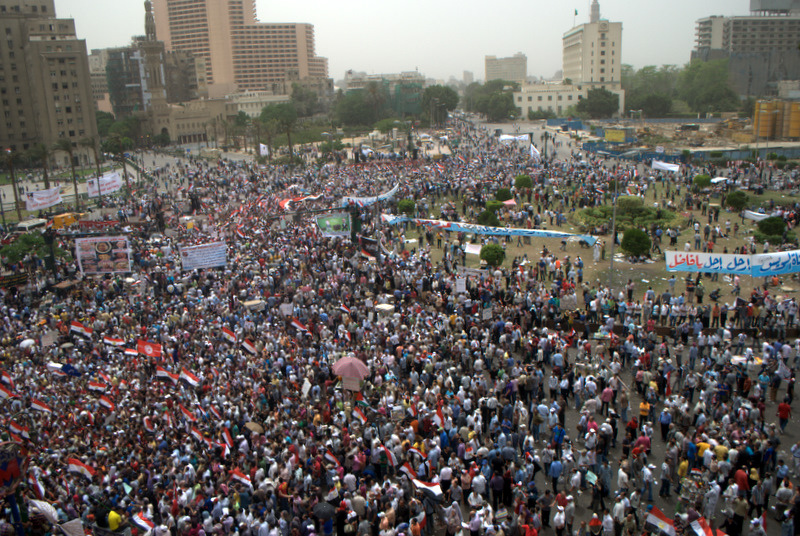
The "Second Revolution of
Anger" – people protesting in Tahrir Square on 27 May 2011,
demanding food, jobs, and
punishment of the former government officials
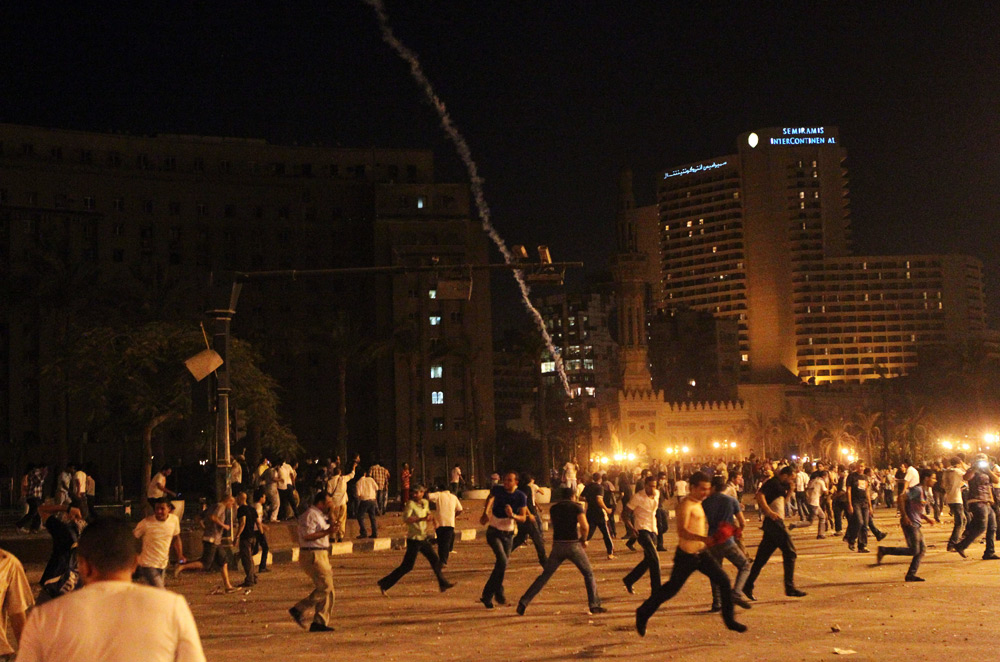
Another round of protests
at Tahrir Square beginning the evening of 28 June, 2011
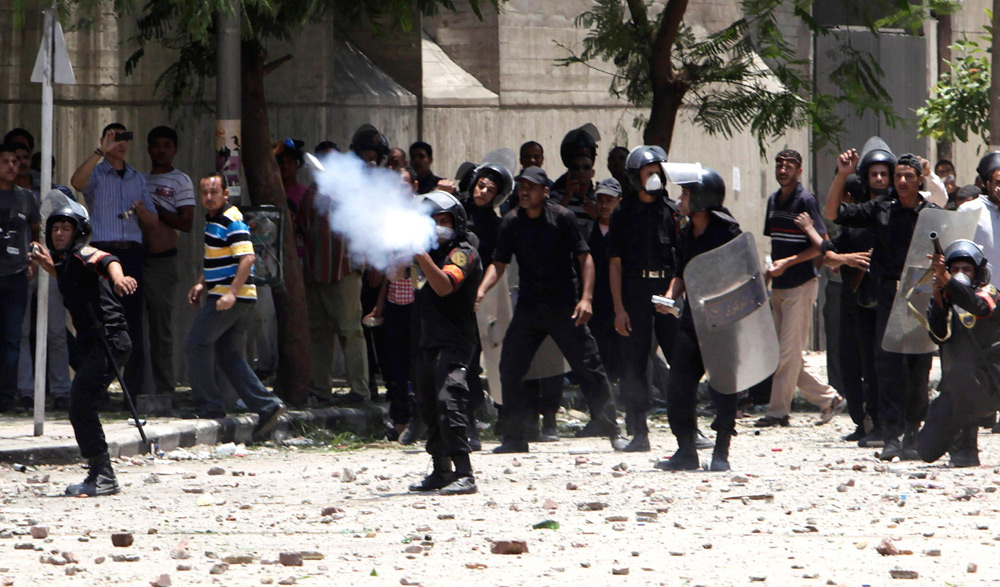
The protests continue the
next day – June 29 2011
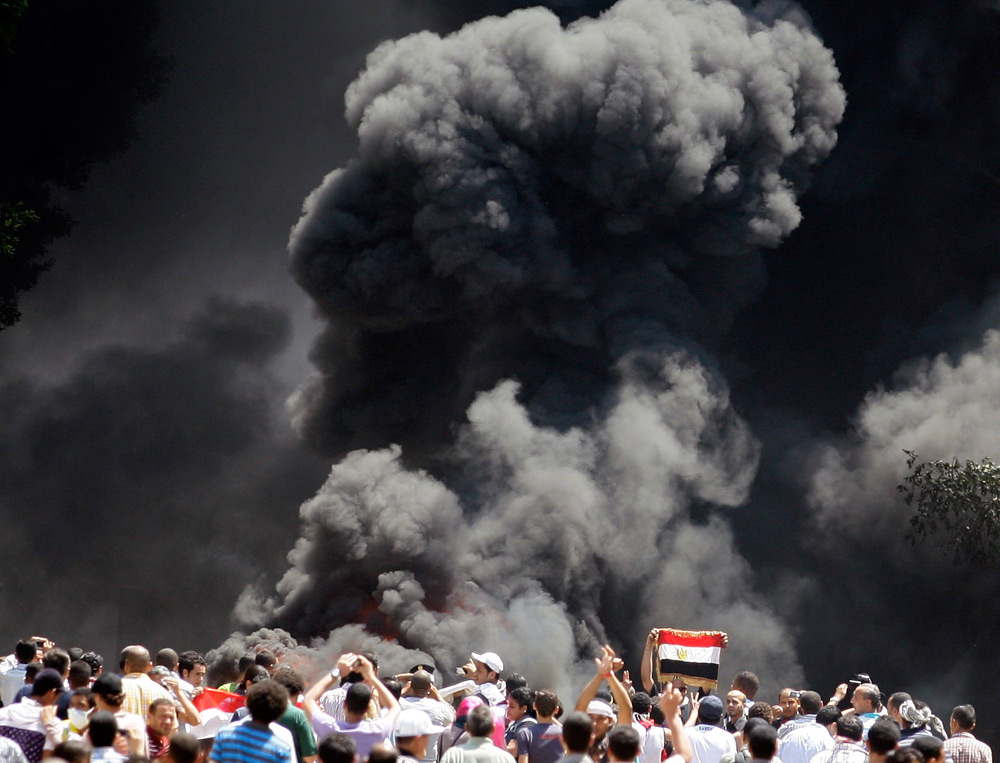
Protesters are seen in front
of smoke burning from a destroyed police booth – June 29 2011
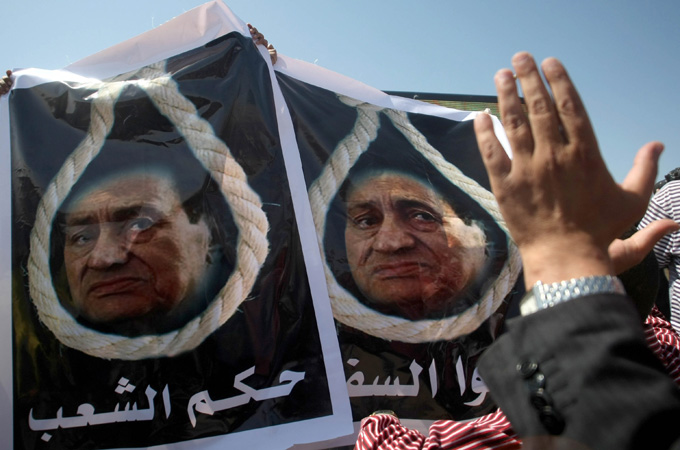
Some demonstrators that
gathered
outside the court demanded
the death penalty for the ousted president
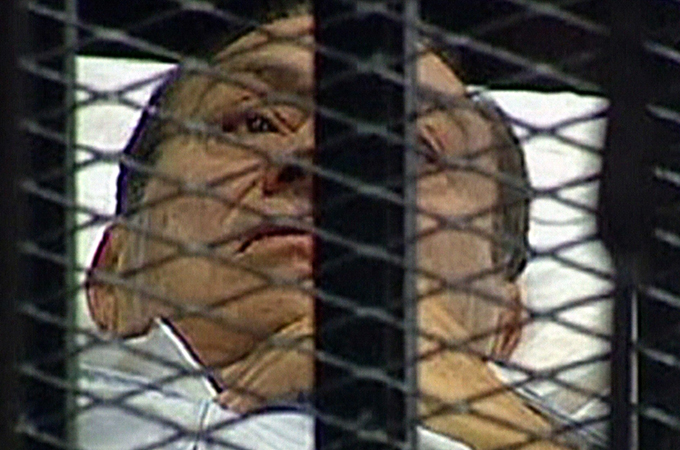 A caged Mubarak on trial
in Egypt – August 6, 2011
A caged Mubarak on trial
in Egypt – August 6, 2011
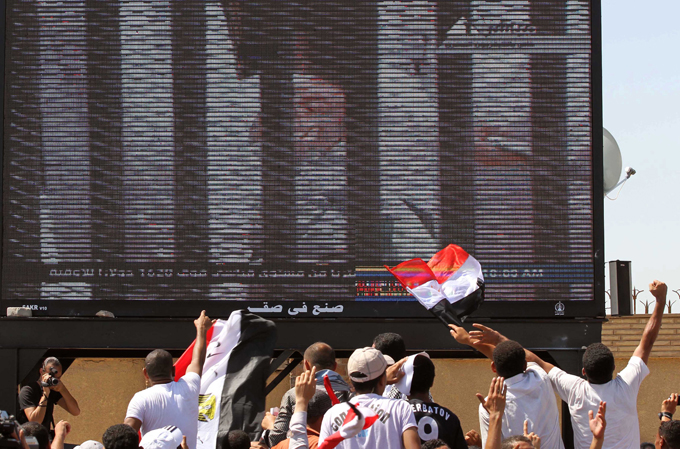
Human rights standards may
not be met in this trial,
but the more essential purpose
is to prove there's no going back.
Finally, Obama gets the good news that Egypt has scheduled elections for Egyptian President (May-June 2012). Hooray! Egypt can now join the ranks of the world’s "democracies."
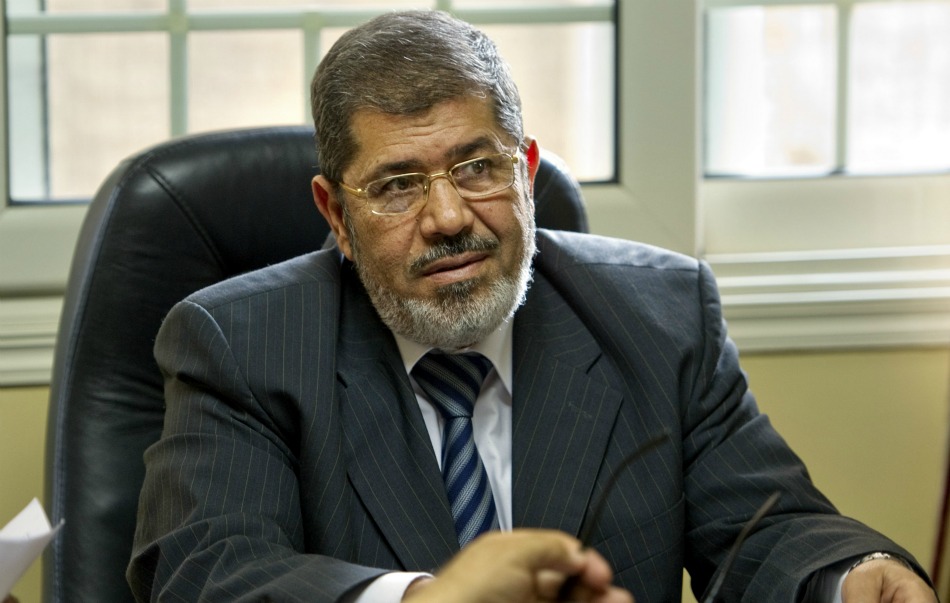
The New Egyptian President,
Mohamed Morsi,
He was elected with 51.73
% of the vote – on the basis of Muslim Brotherhood support,
and took office at the end of
June 2012.
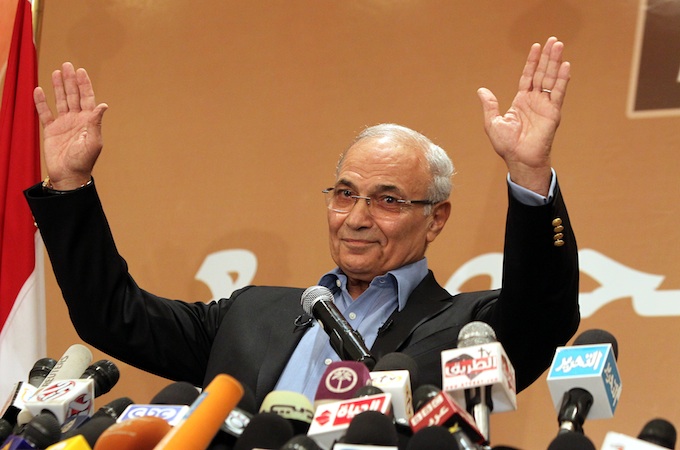
His opponent Ahmed
Shafik
Shafiq flees the country … and chaos mounts in Egypt as Islamists battle Secularists
and Christian Copts.
By
June of 2013 tens of millions of Egyptians had taken to the streets to
protest
the policies of Morsi ... and the chaos that was tearing Egypt
apart.
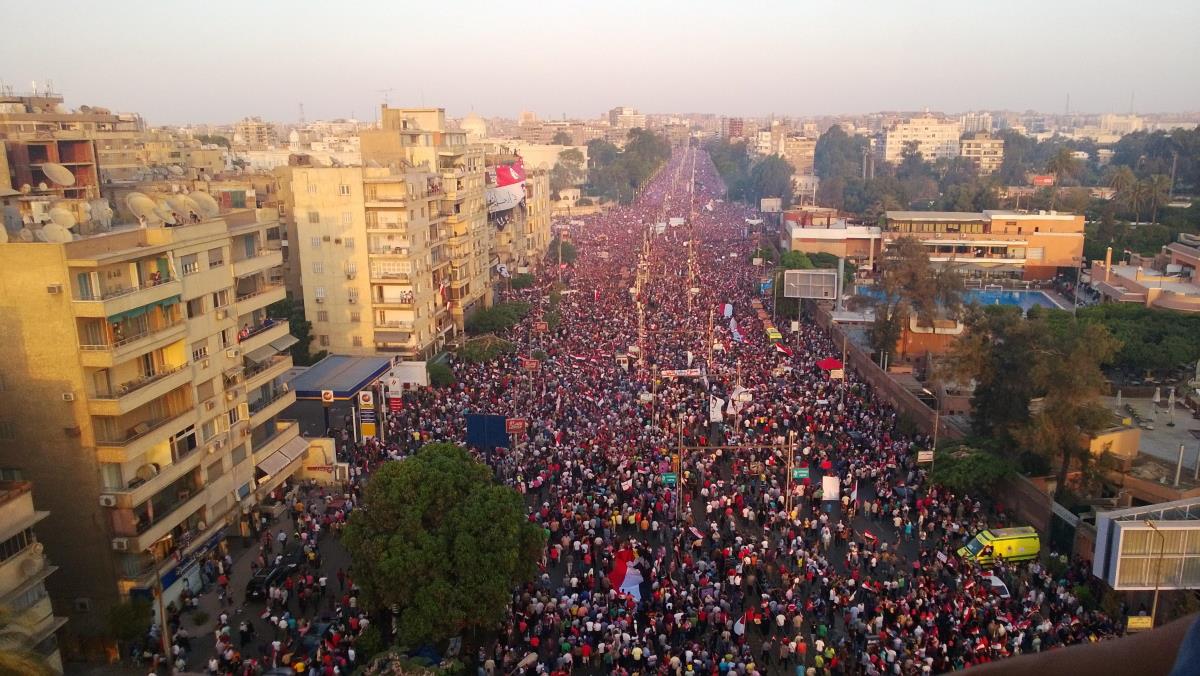
The
military put out a warning that if the contending political parties did
not come to some kind of agreement within 48 hours, the military would
be forced to intervene to restore order in Egypt.
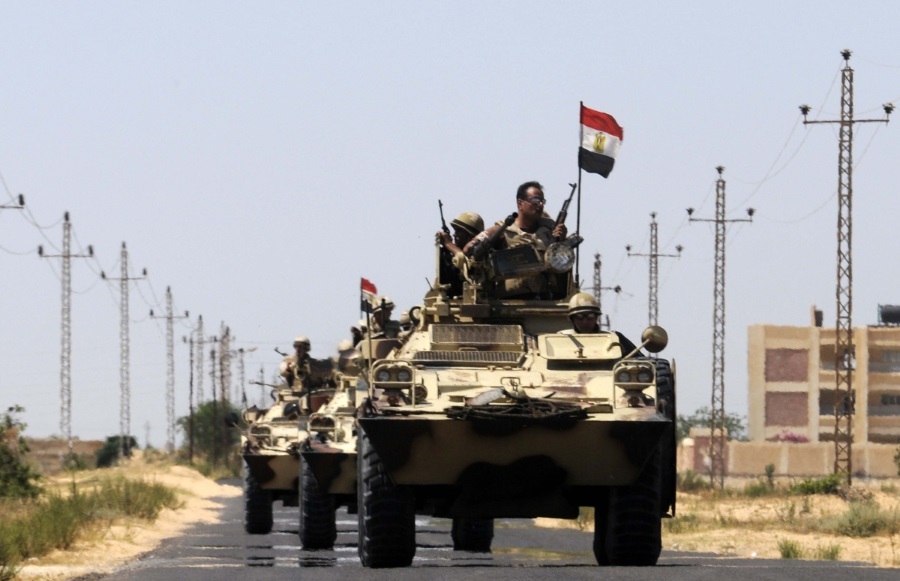
Ultimately the military, under Egypt’s Defense Minister General Abdel Fattah el-Sisi took over … and arrested Morsi.
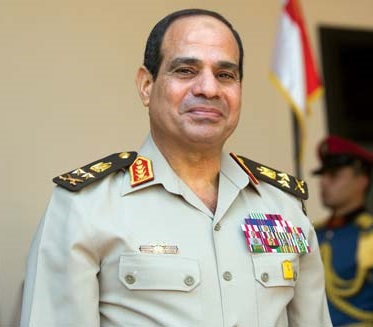
The
Muslim Brotherhood staged protests around the country … but the
pro-Sisi supporters did the same. Little by little the military
gained the upper hand … and the Muslim Brotherhood was forced to back
down at the same rate. Something resembling peace and order
finally descended on Egypt.
The
following year (2014) Egypt held another round of Presidential
elections … which the Muslim Brotherhood boycotted … helping deliver a
96% win to Sisi for a four-year presidential term (until new elections scheduled for 2018)
THE "ARAB SPRING" THEN SPREADS NEXT DOOR TO
LIBYA |
|
When the spirit of the Arab Spring hit Libya in
February of 2011, it tended to take the form of regional and tribal
hostilities rather than the kinds of urban protests of disenchanted
youth characteristic of the Tunisian and Egyptian (and simultaneously
the Syrian) Arab Spring uprisings. There were elements of that of
course. The largely oil-based Libyan economy had seen major rises and
falls, in particular a nasty decline in the 1980s following the
spectacular rise of oil prices in the 1970s – which had the Libyan
dictator Muammar Gaddafi back and forth in his political policies in
his effort to stay on top of things.
Then by the beginning of the 2000s,
Gaddafi was ready to attempt friendly relations with the West,
especially the Europeans. By that time Libya had seen fit to admit a
kind of general complicity to the Lockerbie bombing and offered up to
$2.7 billion to the families (and their lawyers!) in compensation,
largely to get the country out from under both a U.N.-ordered sanction
and a Western boycott. Gaddafi had come to new agreements with the
West, ceasing further nuclear development, and helping to slow the
illegal immigration into Italy from Africa. By 2006, Libya was taken
off the American list of terrorist-supporting states. But even then,
Gaddafi could not resist the occasional swipe at the West for its
"imperialism" before such audiences as the United Nations General
Assembly in 2010. Thus he was still held in deep suspicion on the part
of Americans and Europeans.
Thus when the Arab Spring hit Libya in
mid-February (unemployment was running at 30 percent at the time), and
Gaddafi took his usual tough response to Libyan protesters, Obama and
his NATO allies decided to get tough on him, for his "violation of
Libyan civil rights."
Actually, what was happening was a
regional war in which anti-Gaddafi protesters, based primarily in the
Eastern city of Benghazi and led by a group which formed immediately
under the name National Transitional Council (NTC), found themselves up
against equally pro-Gaddafi Tripoli-based supporters, also in the
streets, but protesting against the Benghazi NTC! Basically, Libya's
Arab Spring had become a tribal war of the Eastern tribes against the
Western tribes, although some variance in this tribal pattern made this
not quite a completely East-versus-West phenomenon.
But oddest of all was how Obama and his
NATO allies sided so completely with the NTC, not just diplomatically
but ultimately militarily as well. At first it looked as if Gaddafi was
going to bring the Libyan Arab Spring to a quick close as his troops
advanced quickly on Benghazi. But America, Britain and France
(supported by Russia and China) got the United Nations Security Council
to pass unanimously a resolution which called for military sanctions
against the Gaddafi government, and the immediate presentation of
criminal charges against Gaddafi in the International Criminal Court
(ICC) as well. The Security Council sanctioned a no-fly zone over
Libya, to prevent Gaddafi from offering air support to his ground
troops. Meanwhile France was illegally supporting the NTC group by
air-dropping weapons to anti-Gaddafi troops, at the same time not only
"enforcing" the no-fly zone but actually bombing pro-Gaddafi positions,
a NATO airstrike at Tripoli killing members of Gaddafi's family in the
process.
This strange intervention on the part of
NATO (most all NATO members were involved in one way or another) under
U.N. sponsorship seemed to serve the protection of civil rights most
unusually in its one-sided involvement in what was actually a Libyan
civil war. Even Amnesty International pointed out that anti-Gaddafi
forces were also violators of civil rights, and that much of the claim
of Gaddafi's gross violation of those same rights appeared to be mere
propaganda put out by the NTC in its effort to undercut Gaddafi.
But somehow Obama and the West felt that
they had some great "democratic" moral crusade to promote, and, little
by little through NATO air cover, were able to help the NTC reverse the
fortunes of war and push the pro-Gaddafi forces into retreat. Finally,
the Arab Spring came to its end on October 20th when NATO bombers
destroyed a convoy trying to help Gaddafi escape to the desert, and
Gaddafi and numerous supporters were thus seized by rebel forces and
executed on the spot.
Supposedly now (supposedly to Obama and
the European leaders anyway) Libya had been brought to a new beginning,
a path to freedom and democracy. But that was hardly likely to happen.
Tragically, and rather ironically,
Benghazi, the city that was the center of the anti-Gaddafi forces, the
same forces that America and its NATO partners helped to depose
Gaddafi, would become the source of a major American catastrophe less
than a year later. On September 11th 2012, amidst a Muslim sectarian
war still raging across the country, Muslim militants of the group
Ansar al-Shari'a attacked and torched the American consulate and the
nearby CIA annex in Benghazi, in the process killing the American
Ambassador to Libya, Chris Stevens, and three other Americans.
This caught the Obama Administration off
guard, despite the fact that requests for additional security in
Benghazi had been previously sent to Washington. At first the State
Department announced that this attack had been a spontaneous response
to a particular video offensive to Islam. But in short order the
careful preparations that went into the attack were revealed, and the
"spontaneous" characterization of the event had to be dismissed. At
this point (with presidential elections only weeks away) the matter of
responsibility became a Republican-Democrat campaign issue.
Thus an investigation into the whole
affair was put into place. Consequently, as a result of its report,
Secretary of State Hillary Clinton was criticized for the poor handling
of the crisis, and that December a number of department of state
officials were suspended or pressured to resign. Also Obama announced
that he would soon (February 2013) be replacing Clinton with Senator
John Kerry as his new secretary of state.
In 2014 Libya was plunged into yet
another round of civil war when the Libyan Army moved against various
militant Islamist groups (including principally Ansar al-Shari'a),
driving them from Benghazi, but thereby sending most of the militants
off to Iraq and Syria to join the Islamic State (ISIS) militants
seeking to overthrow the governments of those two countries.
In retrospect, one has to ask the
question as to why NATO members were so eager to get so involved in
Libya's Arab Spring. Surely they did not expect democracy to sweep
Libya as a result of the collapse of the Gaddafi government. Or did
they? Were they really that politically naïve?
Tragically, Libya has been under only the
weakest of national governments since Gaddafi's fall, and communitarian
strife (i.e., civil war) continues to deeply trouble the country to
this very day.
The matter of social order
One also wonders, had they been around in
the 1860s, what the Liberals of the United Nations and NATO would have
done about President Abraham Lincoln's "dictatorial" behavior during
the American Civil War. At what point does a government have the right
to protect itself against rebellion, thus "violating the civil rights"
of the rebels? This was exactly what the American president Lincoln did
in sending his federal army into the South in order to force it back
into the American Union – minus its slaves … which was why the
rebellion of Southerners intent on maintaining the horrible institution
of slavery occurred in the first place. What Lincoln did is widely
agreed on today as a very good thing. But it involved a political
dynamic that Liberals instinctively (or just religiously) oppose
strongly (as was the case of Kennedy and Johnson in Vietnam, Bush, Jr.,
in Iraq, and Obama in Egypt and Libya … and soon Syria as well).
When will Liberals ever allow themselves to understand the grim
requirements of social power necessary to maintain social order – power
maintenance hopefully conducted by the common members of society
themselves so that a society does not have to rely on a repressive
government operating above the people (usually in the form of a
dictator backed up by a very strong military or police organization or
both) to maintain that order?
The maintenance of a social order such
that allows human life to thrive never happens "naturally," as Liberals
believe as a matter of religious faith, but is the result of strong
social training – a process starting always at the all-important level
of a strong family – a training that produces a social self-discipline
among the people themselves. Such social self-discipline is what then
qualifies a society as a democracy – the ability of the people to
govern and direct their own behavior to healthy social purposes.
Boomer and Gen-Xer flight from such
self-enforced social responsibility (as in "do your own thing") is the
least likely of paths to produce either social cohesion and stability
or true democracy. This is clearly demonstrated in the rapid growth
since the mid-1960s of the Washington political establishment, called
on to fill the social void created by the inability of self-focused
citizens to work together to direct or govern the broader life of their
own society.
|
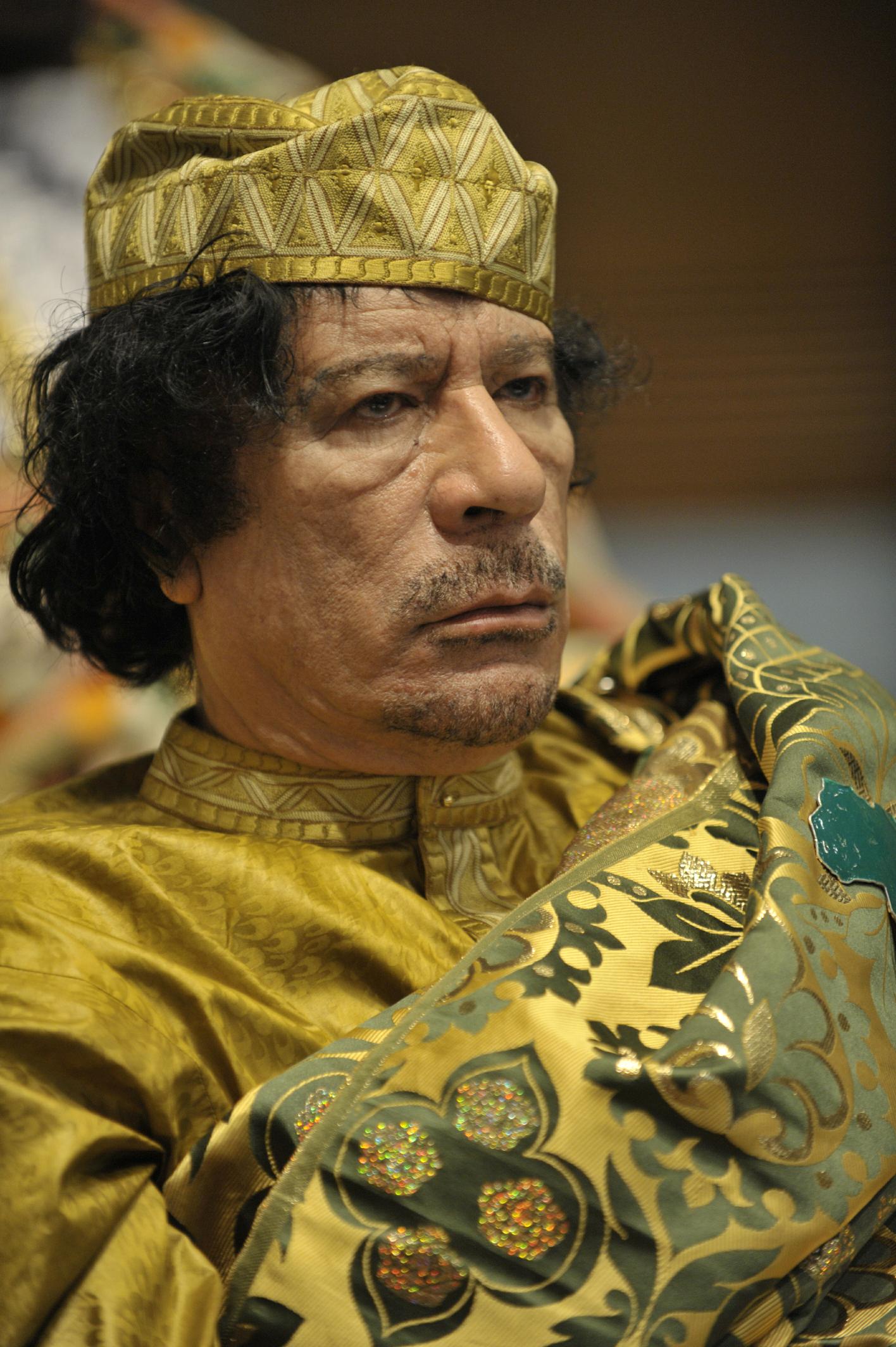
Muammar al-Gaddafi at the
12th AU summit, February 2, 2009, in Addis Ababa
President of Libya (1969
- 2011)
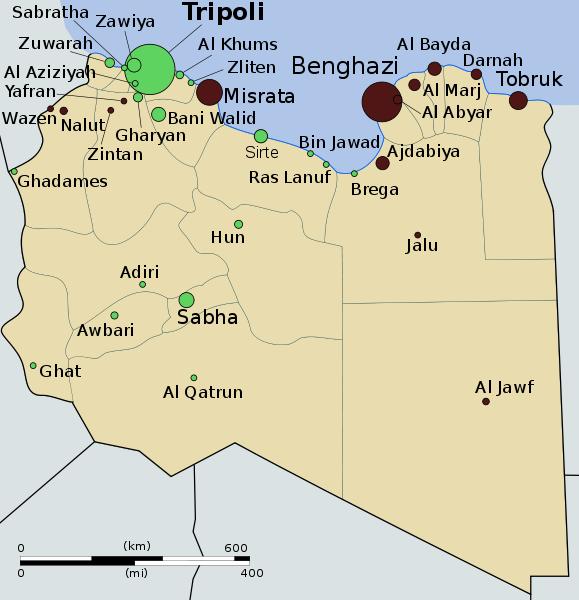 (Green) Cities controlled
by pro-Gaddafi forces (as of July 1, 2011);
(Brown) Cities controlled
by anti-Gaddafi forces (supported by coalition forces)
(Green) Cities controlled
by pro-Gaddafi forces (as of July 1, 2011);
(Brown) Cities controlled
by anti-Gaddafi forces (supported by coalition forces)
Wikipedia – "2011
Libyan civil war"
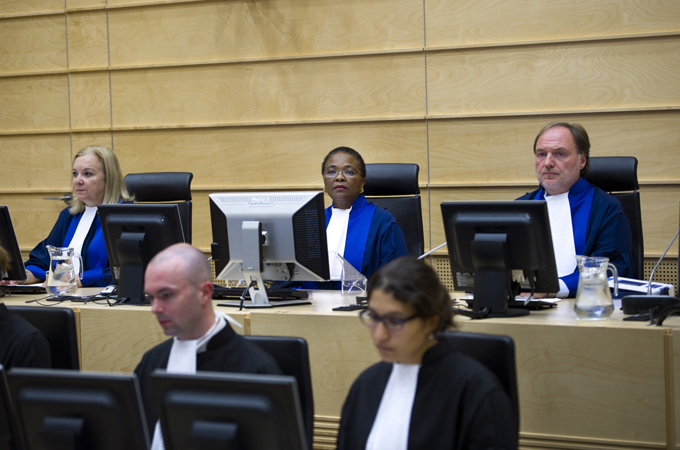
The International Criminal
Court has accused Gaddafi of crimes against humanity
and of ordering attacks
on civilians
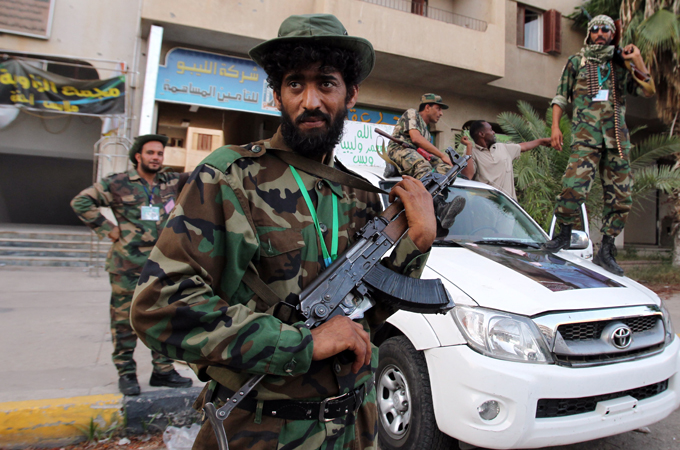
Forces loyal to Gaddafi ... located mostly in the western portions of the country
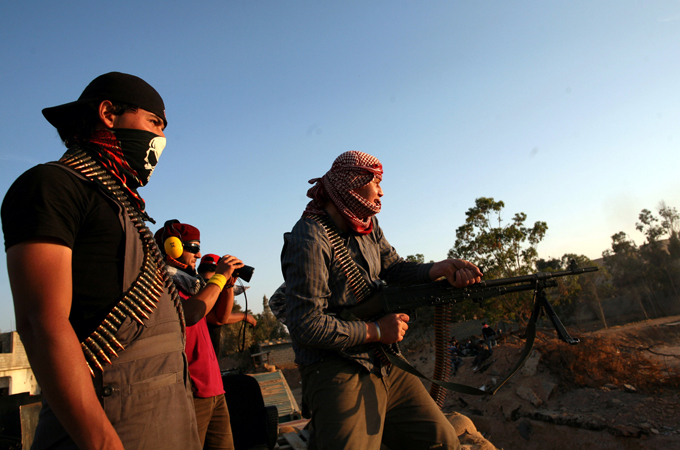
Forces opposing Gaddafi at Brega (the eastern portion of the country)
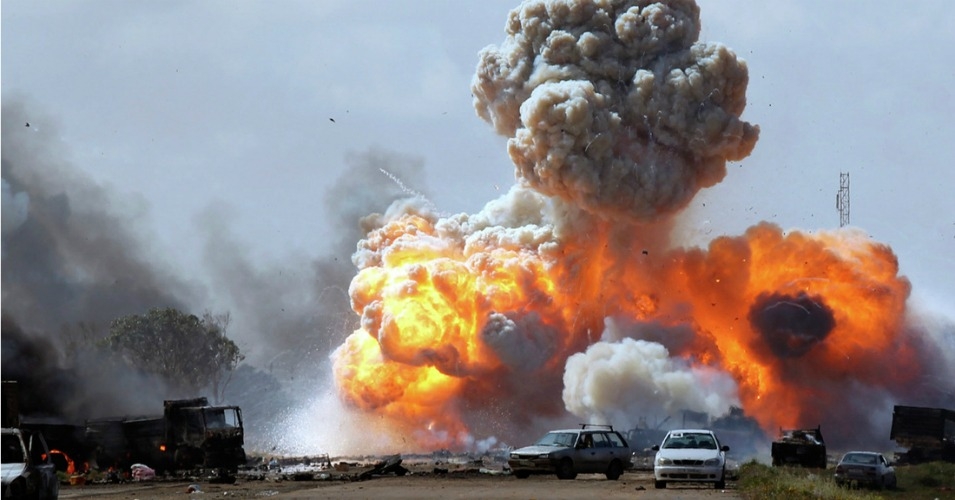
A NATO airstrike directed at the pro-Gaddafi forces
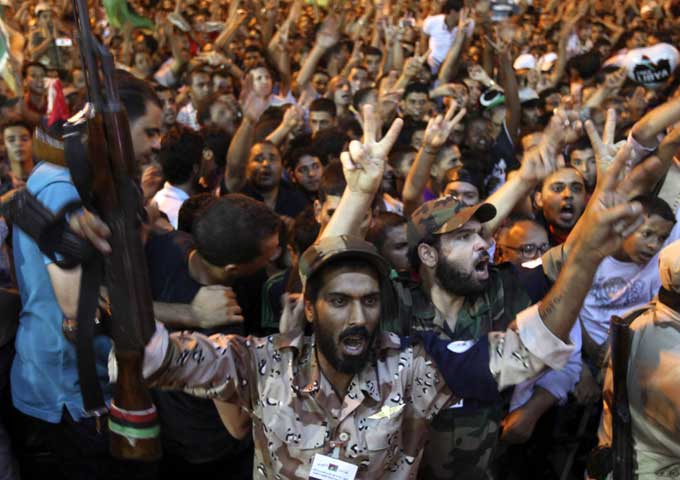
At news that Gaddafi was
losing his grip on power, celebrations erupted in cities across Libya
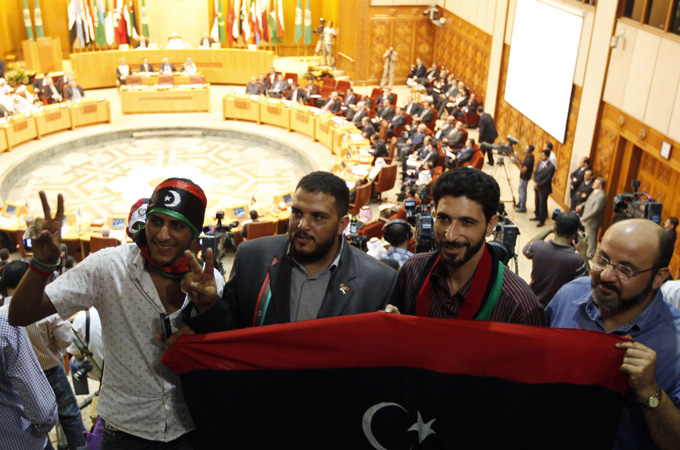
Libyan citizens hold a Kingdom
of Libya flag as they attend the Arab League meeting
in its headquarters
in Cairo
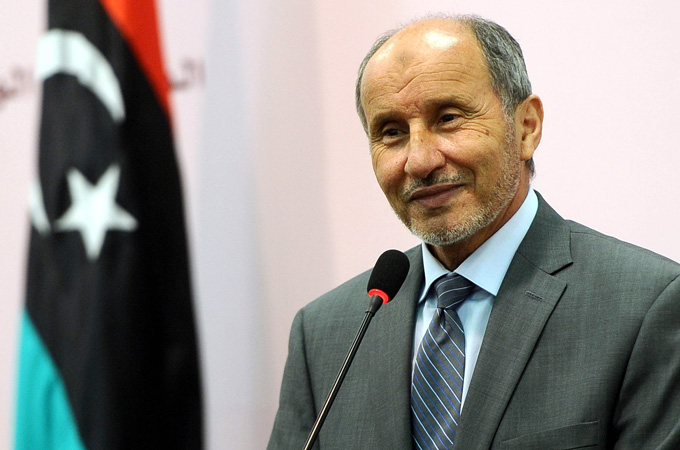
Libya's National Transitional
Council is led by Mustafa Abdel-Jalil,
Gaddafi's former justice minister
(Mahmoud Jibril, Chairman
of the NTC's Executive Board, is another key NTC leader)
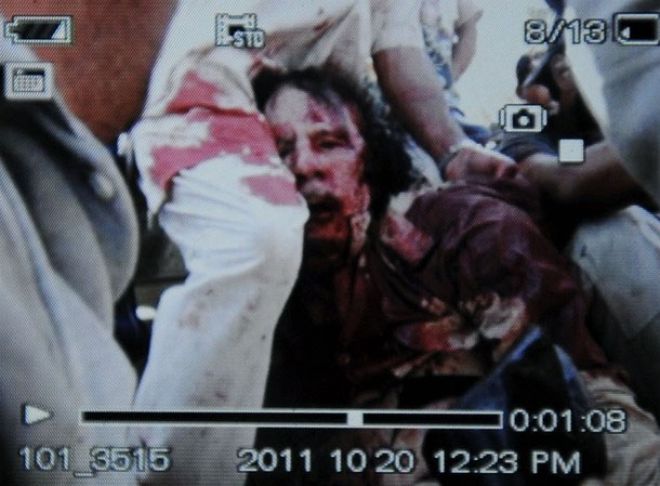
An image captured by cellphone showing a battered Qaddafi just before his on-the-spot execution
October 20, 2011
A year later (September 11, 2012) ... the Benghazi killing of American officials
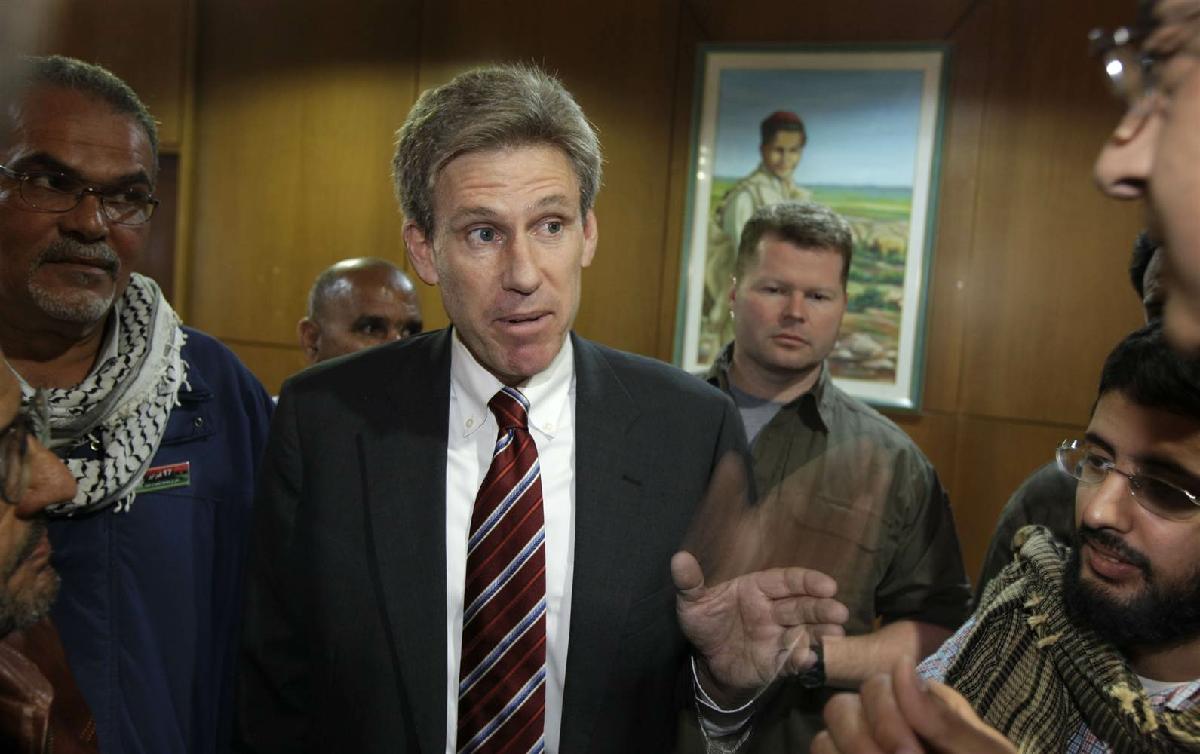
U.S.Ambassador Chris Stevens in Benghazi -
2011
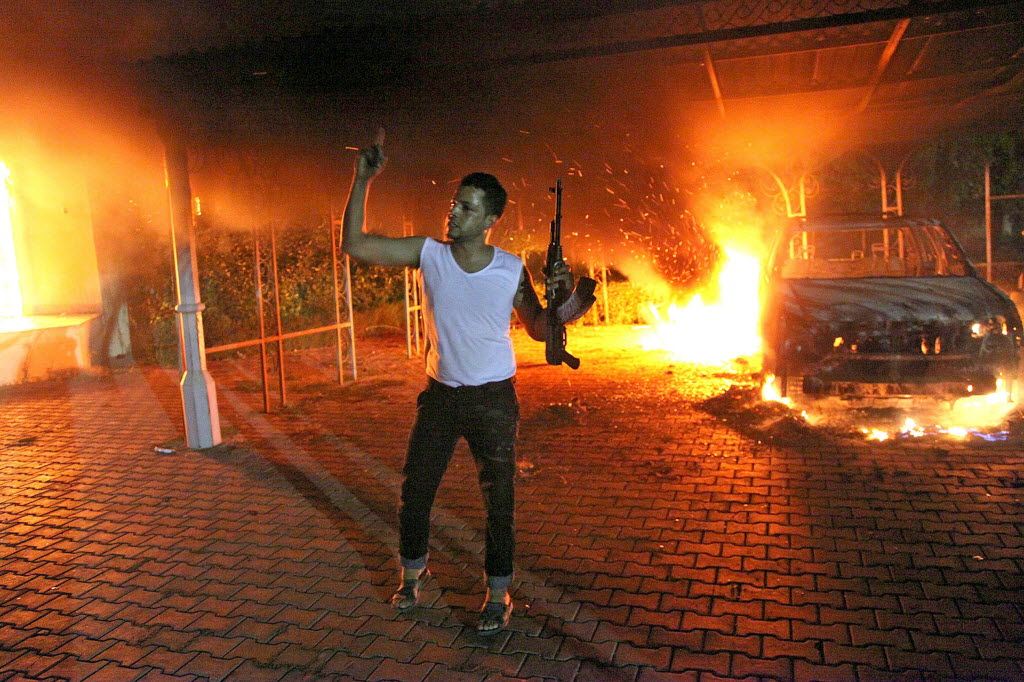 One of those who assaulted the unprotected
American compound in Benghazi
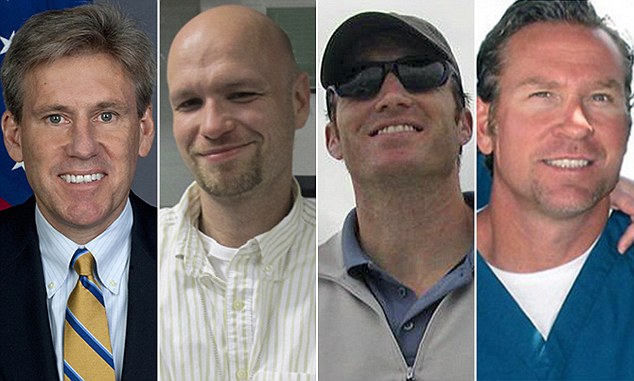
U.S.Ambassador Chris
Stevens, Sean Smith, Glen Doherty and Tyrone Woods
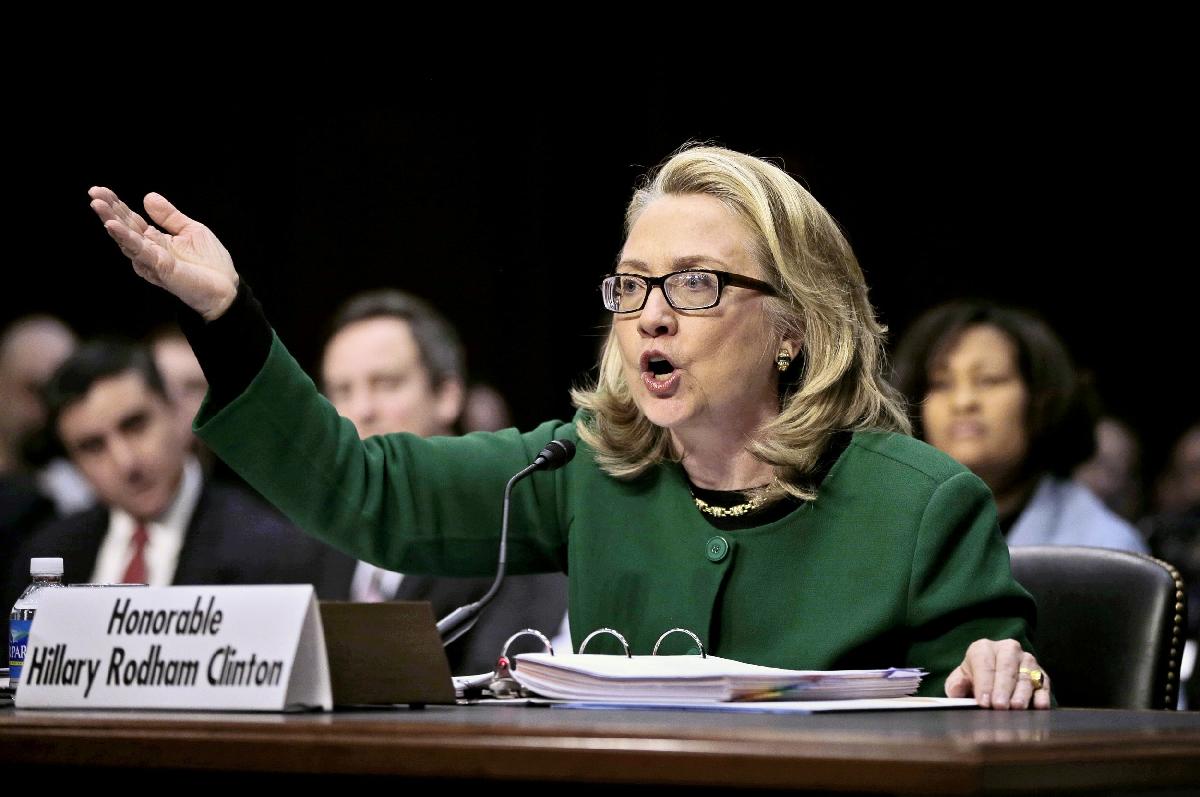
Secretary of State Hillary Clinton
at Congressional
hearings held in 2015
as to what went wrong in Benghazi
THE "ARAB SPRING" ALSO SPREADS TO SYRIA |
|
This question of the rights of those most
responsible for the unity and harmony of society to protect and
maintain that very unity and harmony would be a legitimate question
that would arise as well in the way the Arab Spring impacted
multi-ethnic Syria, another Arab society held together only through the
tight grip of its central authority.
Like Iraq, Syria was a country (never a
nation) carved out of the old Ottoman Empire by the "victors" of World
War One, France creating Syria as one of its League of Nations mandates
(as well as Lebanon) and Britain doing the same with Iraq, Trans-Jordan
and Palestine – ultimately for their own French and British imperial
purposes. However, twenty-five years later, after World War Two, France
sent Syria off on its own journey, always a turbulent experiment in
multi-cultural politics. Military coups were constant, one military
regime overthrowing yet another. The cycle had hopefully come to an end
in 1961 when Ba'athist military officers (including Hafez al-Assad)
took control of Syria, in order to pull it out of the Arab Union with
Nasser's Egypt that Syria had joined three years earlier. But political
turmoil would continue to rock the country with yet more military coups
changing the leadership within the Ba'athist Party itself. Finally in
1970, Assad took full control of the Ba'athist Party and thus the
country and the coups came to a halt.
Slowly but steadily Assad built up his
personal power over Syria (basically outlawing all political activity
other than what Assad himself allowed), with Arab Sunni, Shiite, Alawi,
Druze, Sufi, Salafi Muslims, Kurdish Muslims, Arab Orthodox and
Catholic Christians, and tribal groups of all varieties making up the
wide and often contentious diversity of the Syrian population. During
this time, Syria was also caught up in wars next door with its neighbor
Israel, as well as with Muslim militants at home (principally the
Muslim Brotherhood). Thus it was that in the early 1980s an Islamist
uprising against the rather secular Assad regime had to be put down
harshly by the Assad military.
However, also during this time Assad
attempted to preserve good working relations with America and the West,
even joining the West in the 1991 Gulf War against Saddam Hussein.
In June of 2000 Hafez al-Assad died, and
his son Bashar was elected the next month as Syria's new President (he
ran virtually unopposed).
There was hope that with the younger
Assad in power, Syria might experience a "Damascus Spring." But
troubles grew quickly over demands for deep change by reformers,
mounting demands finally (the next year) countered by Assad's military.
Additionally, Syria's peace continued to be shattered by problems with
jihadist militants, whose camp, in 2003, Israel felt compelled to
attack with its fighter jets. Then in 2004, serious fighting erupted
between Syrian Kurds and Arabs. And in 2007 Israeli jets bombed a
nuclear reactor under construction in Syria.
But the crisis that hit Syria with the
2011 Arab Spring would turn out to be the worst event ever experienced
by Assad's Syria. At this time Syria was suffering from a long drought,
and massive farm failures. Refugees had poured into Syria to escape the
Iraq war next door, straining Syria's thinning social resources and
adding to the growing unemployment rate and the slowness of the Syrian
economy to grow (in comparison to other Arab states).
Spurred on by the revolts in Tunisia,
Egypt and Libya, in mid-March Syrian protesters filled Damascus's
streets demanding various political and economic reforms. It was
confusing, as some wanted simply secular reforms, but many others
demanded the move of the Assad regime to a more conventional Sunni
Muslim character (Assad himself was Alawi, not Sunni). In response,
Assad ordered his military to disperse the protesters and arrest the
leaders. But over the next days, and then weeks, the protest marches
continued to build. Eventually some of the protesters took up the call
for Assad himself to step down from power.
But this commotion now involved all sorts
of different groups coming out to protest, not only to protest against
the Assad regime, but also to march in support of Assad. Thus Syrian
groups increasingly found themselves in violent opposition to each
other. In short order, Syria was falling into a full-blown civil war.
Then at this point the international
community (Russia, America, Iran, Turkey and others) decided to
intervene in the chaos, to bring "justice" to Syria. Obama, for
instance, in August of 2011 denounced Assad for his blocking of
democracy in Syria, and declared that it was time for Assad to step
down. However, such international moral assistance was absolutely
guaranteed to make the Syrian chaos worse, much worse (how was it that
Obama missed this critical understanding of things?). Russia and Iran,
however, took the path of support of Assad in his efforts to crush the
rebellion. At the same time, America, Britain, France, Turkey, Saudi
Arabia (even Israel) decided to support one or another rebel group – on
the part of the Americans, principally a group that called itself the
Syrian National Coalition (but actually hardly a national coalition!).
Thus international reactions varied
depending on how a country viewed the matter of Assad trying to break
the spirit of the rebellion: was his strong use of various weapons
(chemical weapons, some major missiles and bombs) warranted or not? In
August of 2012, Obama declared that Assad's actions violated all
standards of humane treatment of his people. He threatened Assad,
warning him that America would react strongly (???) if he crossed a
"red line" in continuing to use such means of repression, especially
the chemical weapons. But this did not slow up Assad, who continued
their use, and forced Obama into an embarrassing retreat when he failed
to deliver on whatever punishment he had in mind to back up his threat.
At first Russia's President Putin agreed to step in to try to mediate
between Assad and Obama (supposedly to get Assad to give up tons of his
chemical weapons), but ended up instead moving closer in support of
Assad (who managed to keep some of his chemical weapons anyway).
It was
at this point that America (in concert with Saudi Arabia) began
secretly to ship arms, even tanks, to Assad's opponents, thus heating
up the civil war. Saudi Arabia of course did so in the hopes of
strengthening the position of the Sunni Muslims hoping for a new Sunni
Muslim Fundamentalist government in Syria. Is this also what Obama
wanted by undercutting the Secular government of Assad and his
Ba'athists? Had America learned nothing from the Iraq disaster?
|
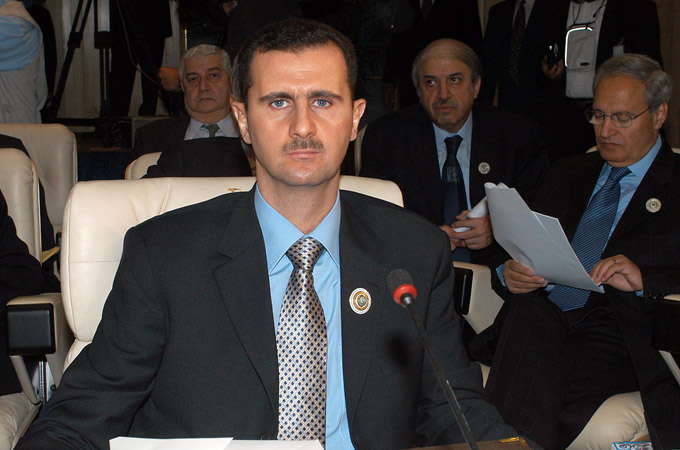
Current president of Syrian,
Bashar al-Assad, second son of Hafez al-Assad
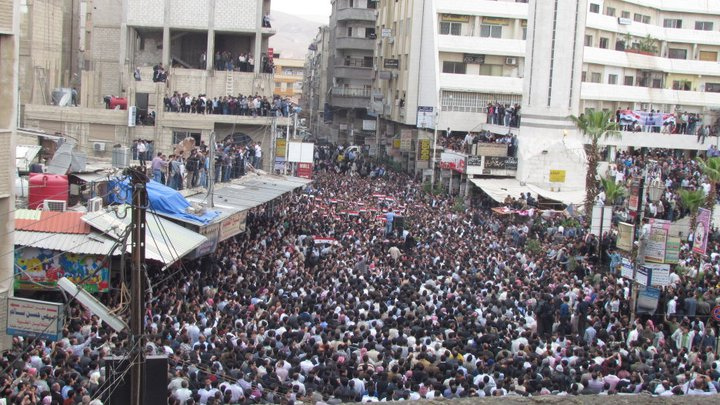
Protest in Duma, a city
near Damascus, Syria (5 April 2011)
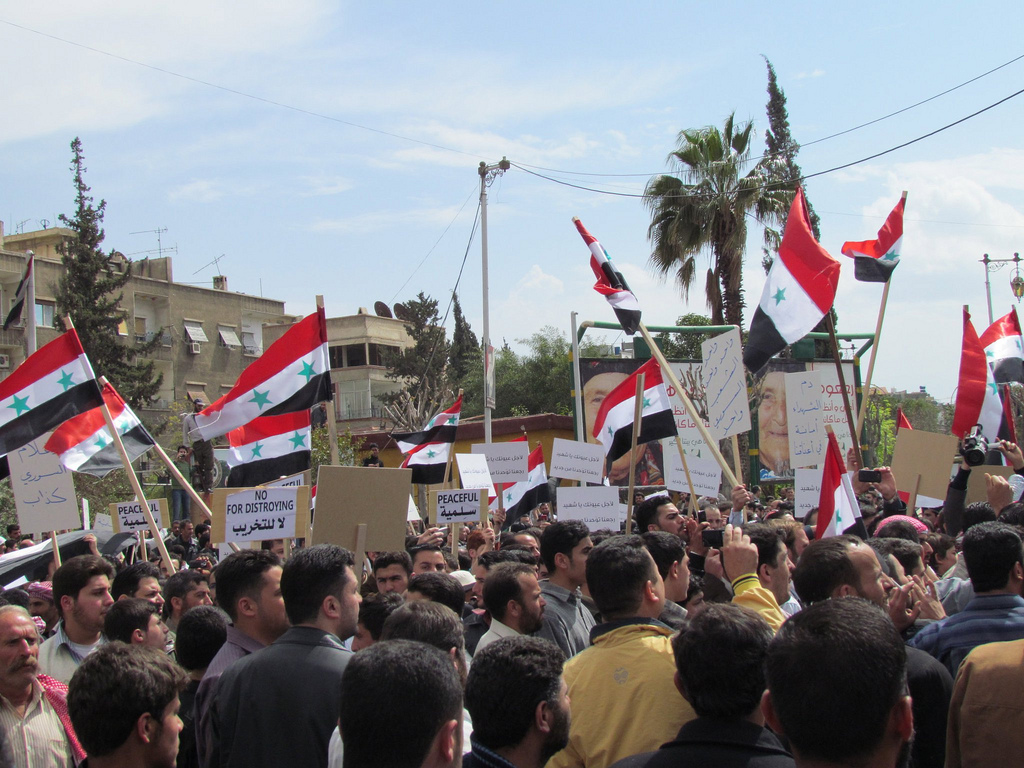
Protesters in Duma (8 April
2011)
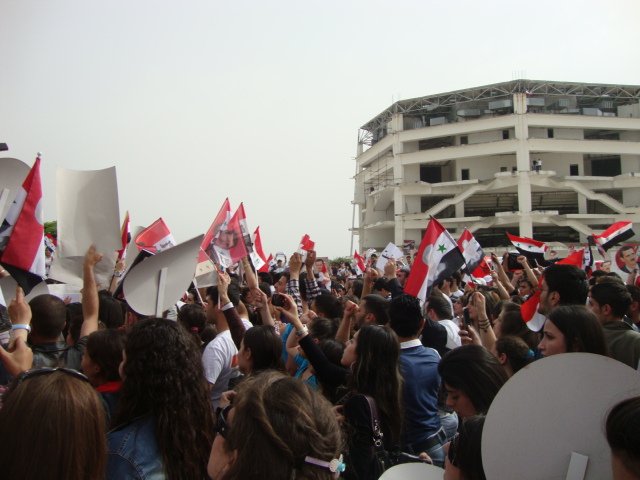
A pro-Assad student
rally at Tishreen University, Latakia, Syria
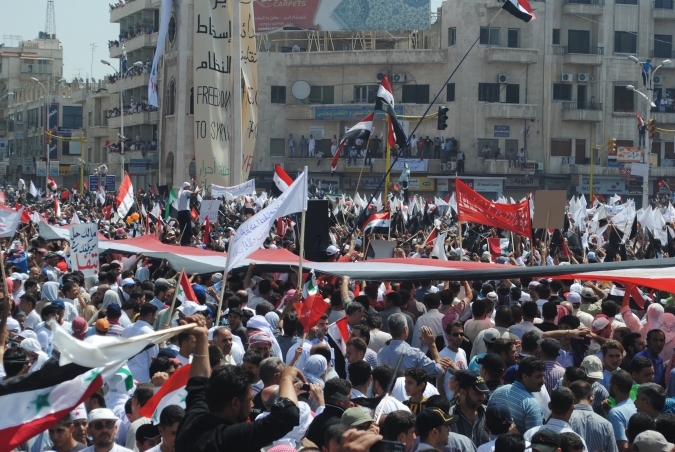
Thousands continue to take
to the streets across Syria, despite the bloody crackdown on
protests. Activists say that thousands
of civilians have been killed by security forces.
EVEN EUROPE AND AMERICA SOON SUCCUMB TO THE OUTHFUL THRILL OF TAKING TO THE STREETS TO PROTEST AGAINST "SOCIAL INJUSTICE" |
In the summer of 2011 Greek youth take to the streets to protest the economic austerity measures undertaken by the Greek Parliament in order to bring the nation's horrible finances back under control. 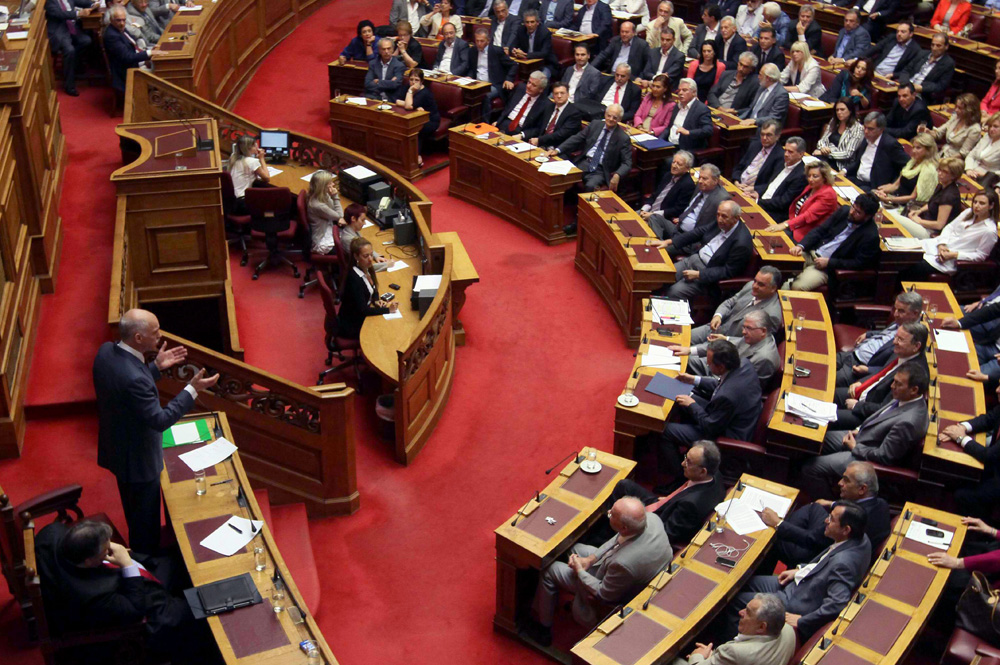
Greek prime minister George
Papandreou addresses lawmakers on June 29, 2011
after voting in parliament
passed an austerity package amid angry street protests 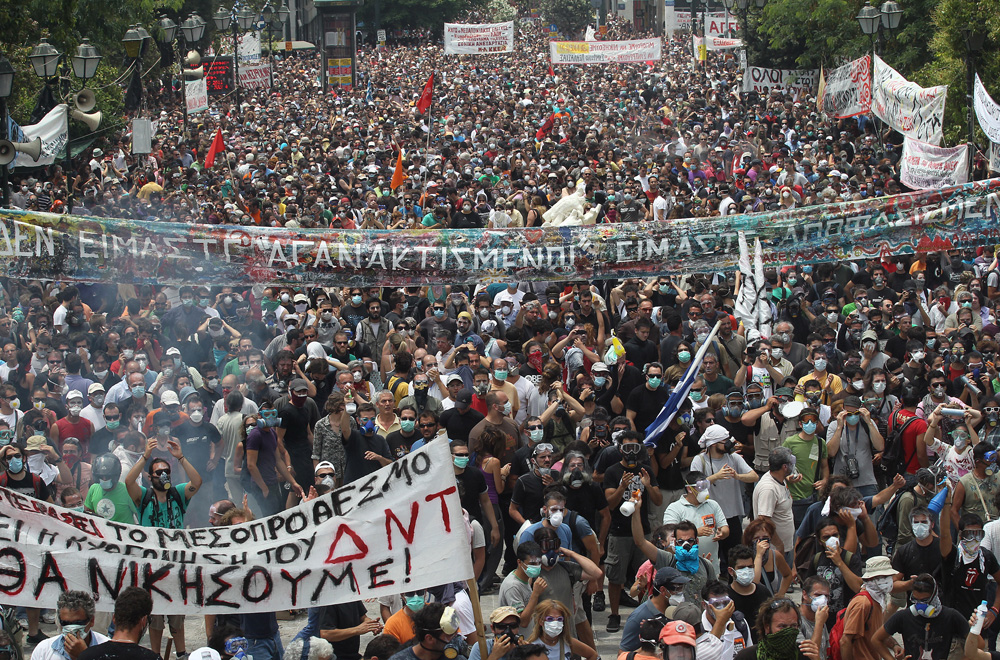
Demonstrators carrying banners
march towards the Greek parliament in Athens during mass protests
on June 29, the second day
of a 48-hour general strike against proposed austerity measures
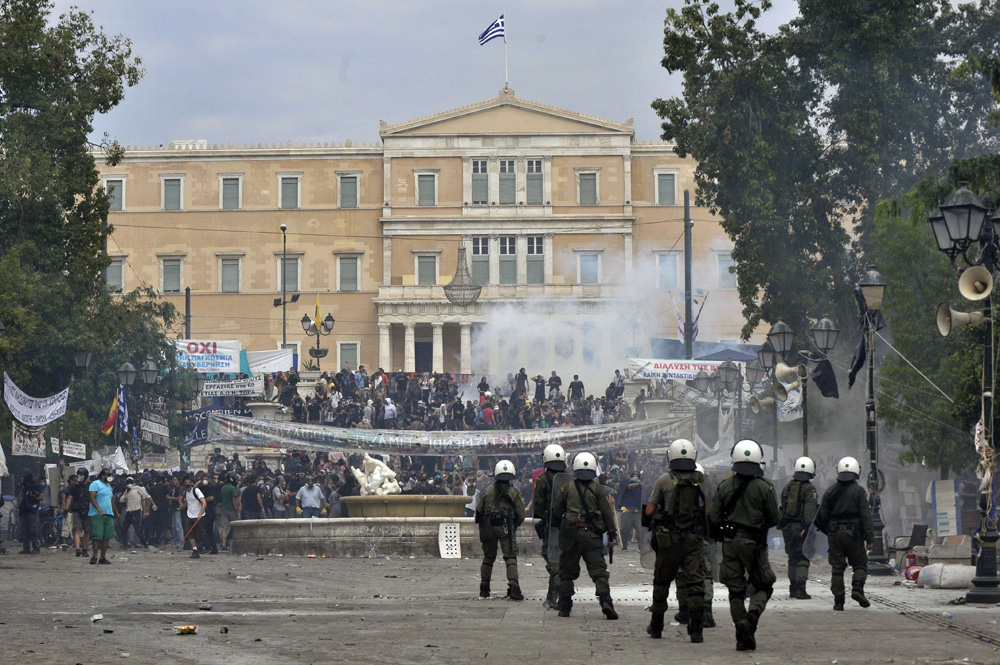
Riot police enter Syntagma
square during the 48-hour general strike 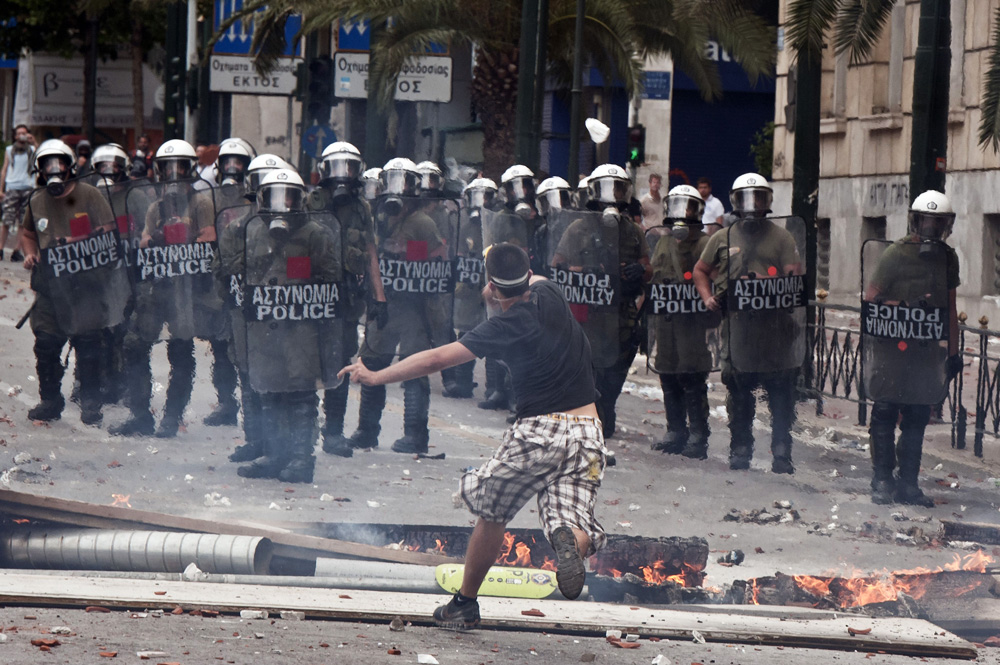
Protests quickly turn very violent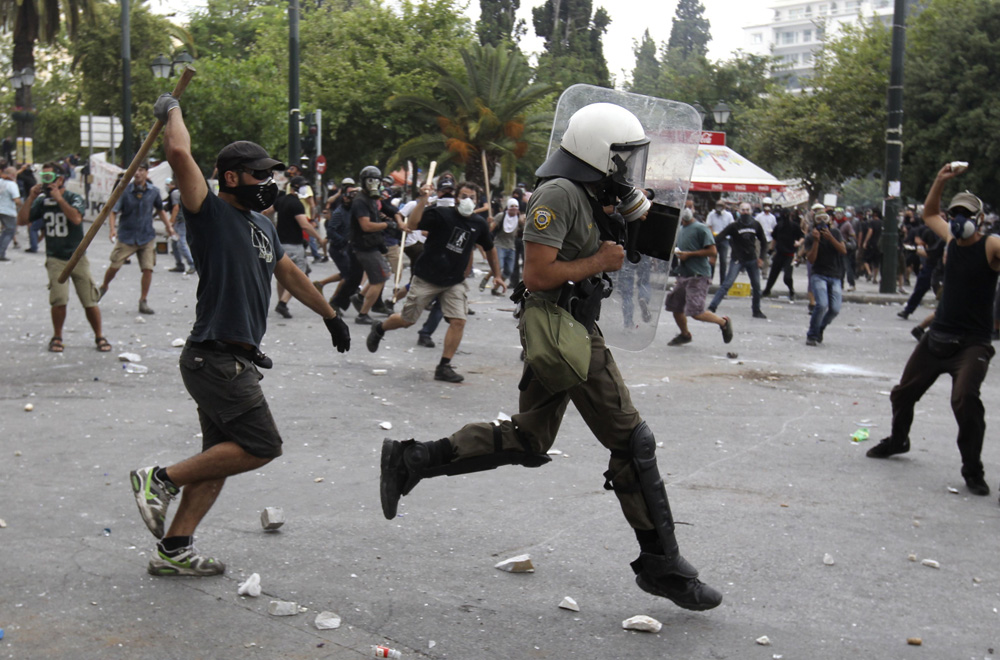
Protesters attack a policeman
during protests around Syntagma square in Athens on June 29
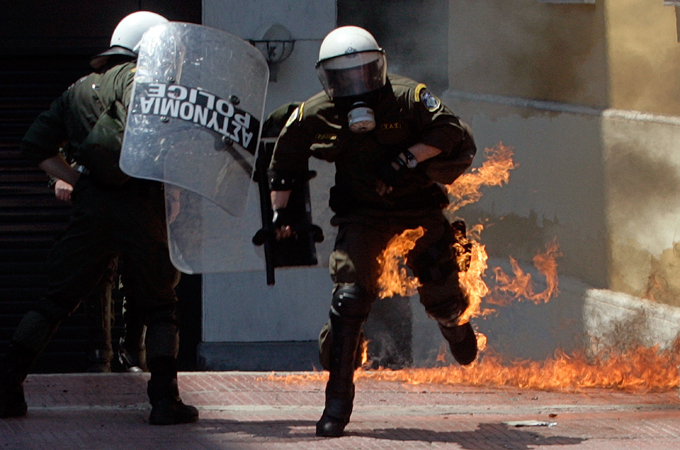 A policeman in trouble
A policeman in trouble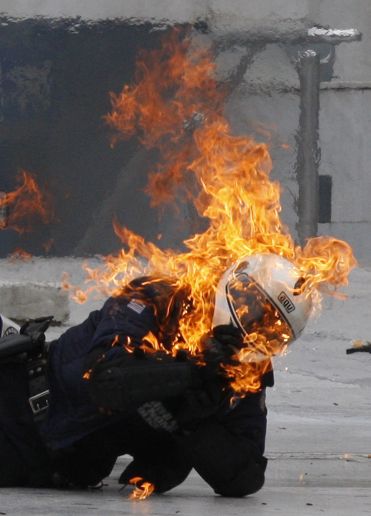
A motorcycle policeman tries
to remove his helmet as he burns after protesters throw a petrol bomb in
Athens
This spirit is quickly picked up the youth of Britain's huge ethnic "minority" population
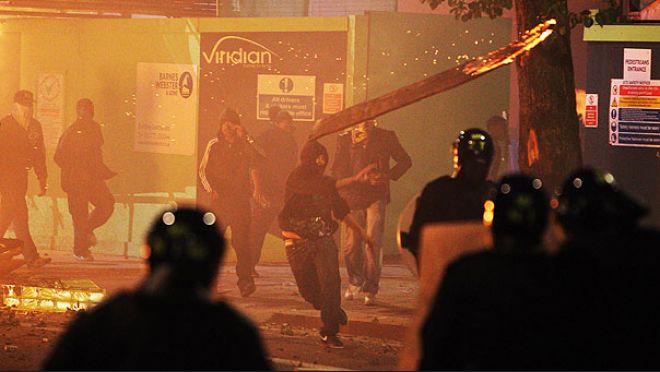
In Pictures: London's burning,
day 3 – August 9, 2011
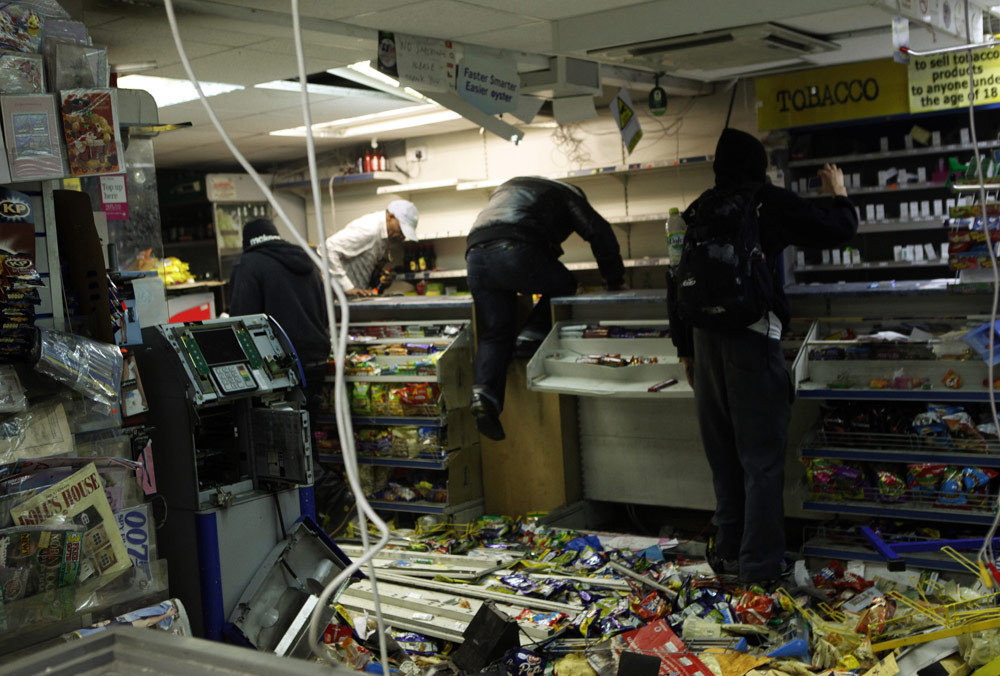
Hackney, East
London
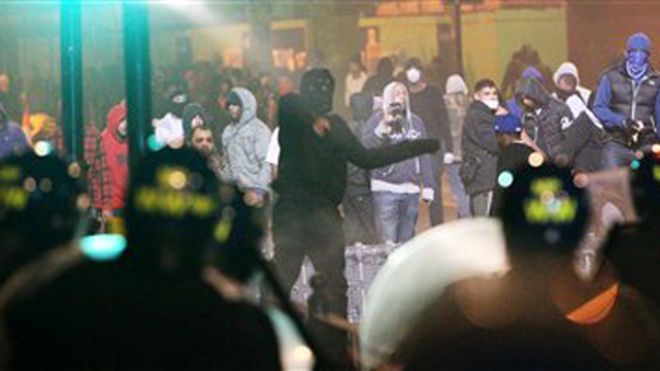
Peckham, South
London
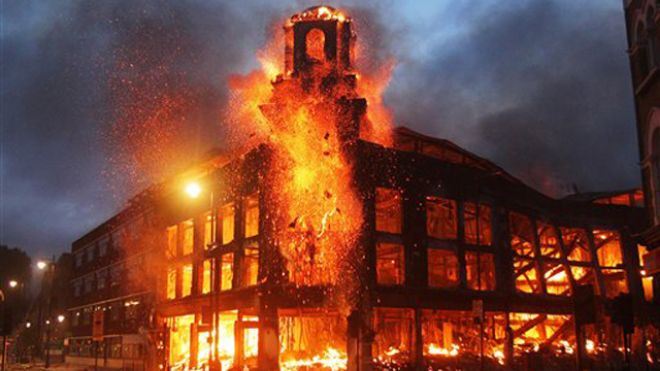
Croydon, South
London
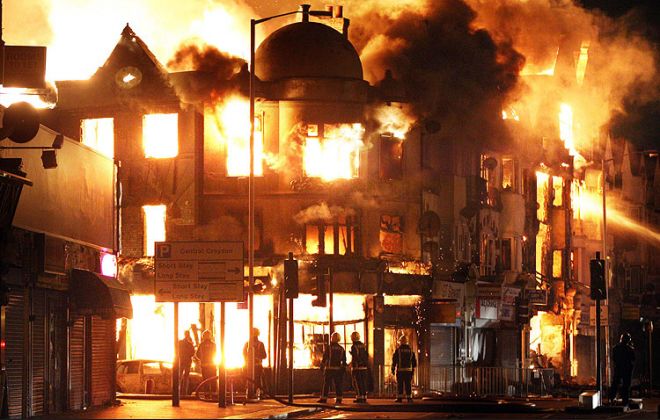
Sporadic violence continued
for a third day in parts of London and spread to other cities 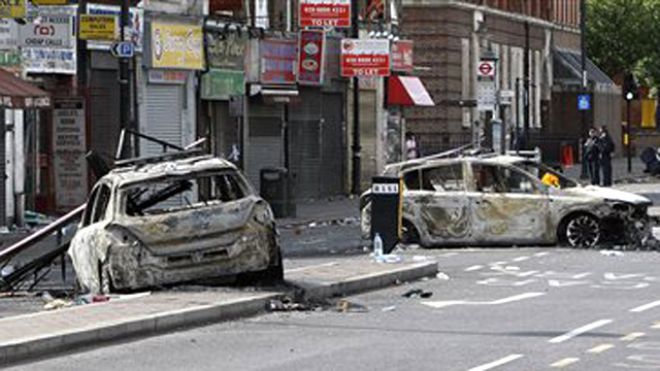
Even the "Occupy Wall Street" movement in America
seems somehow connected to this 2011 spirit of protest sweeping the world
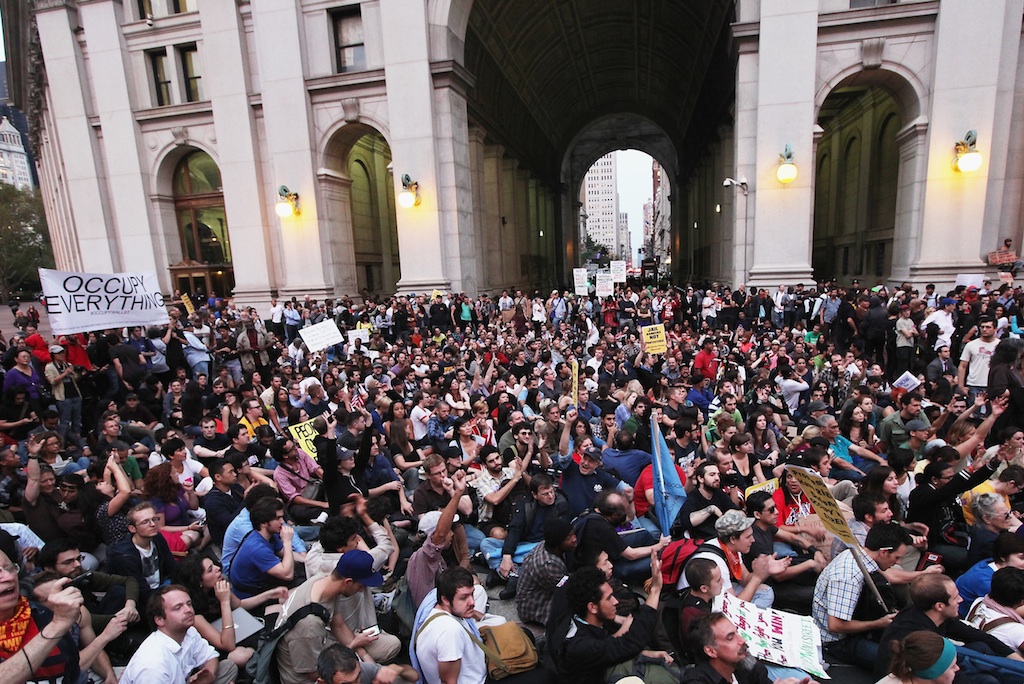
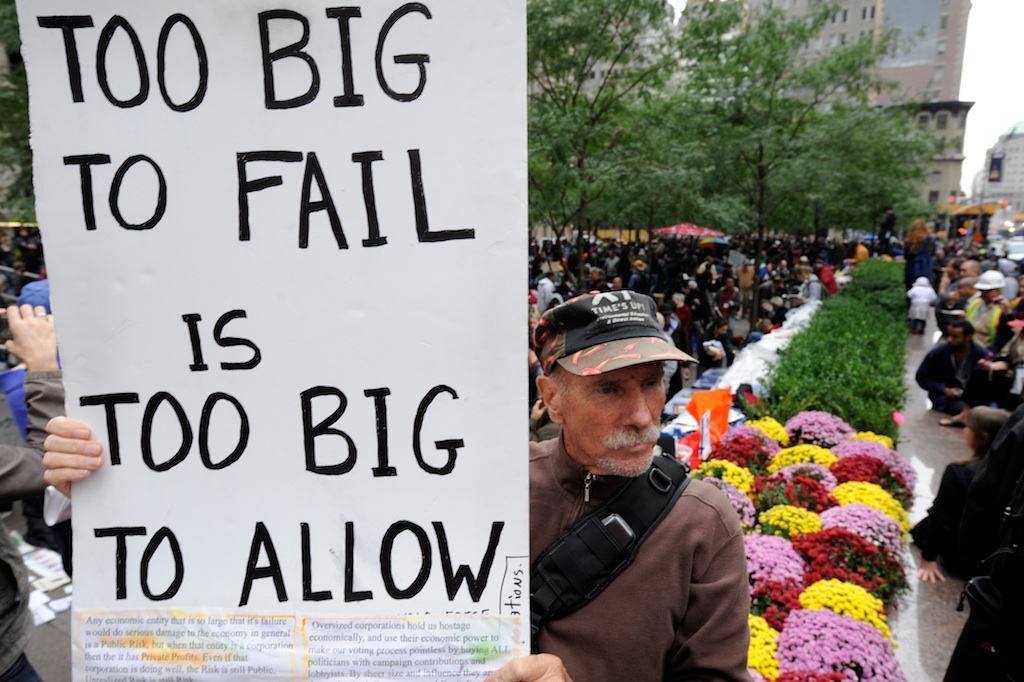
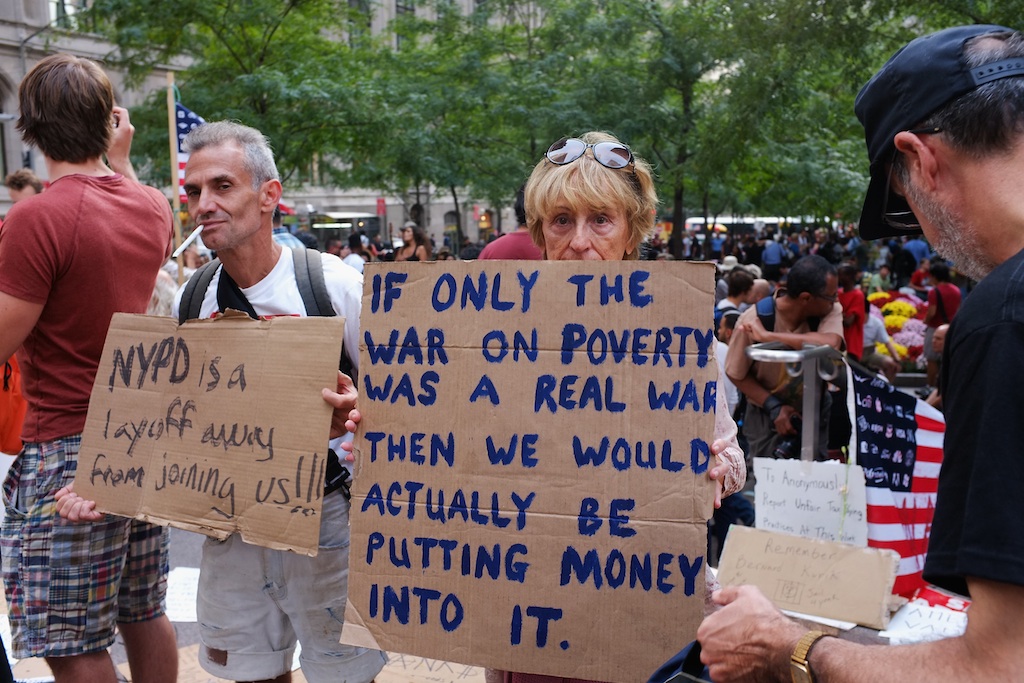
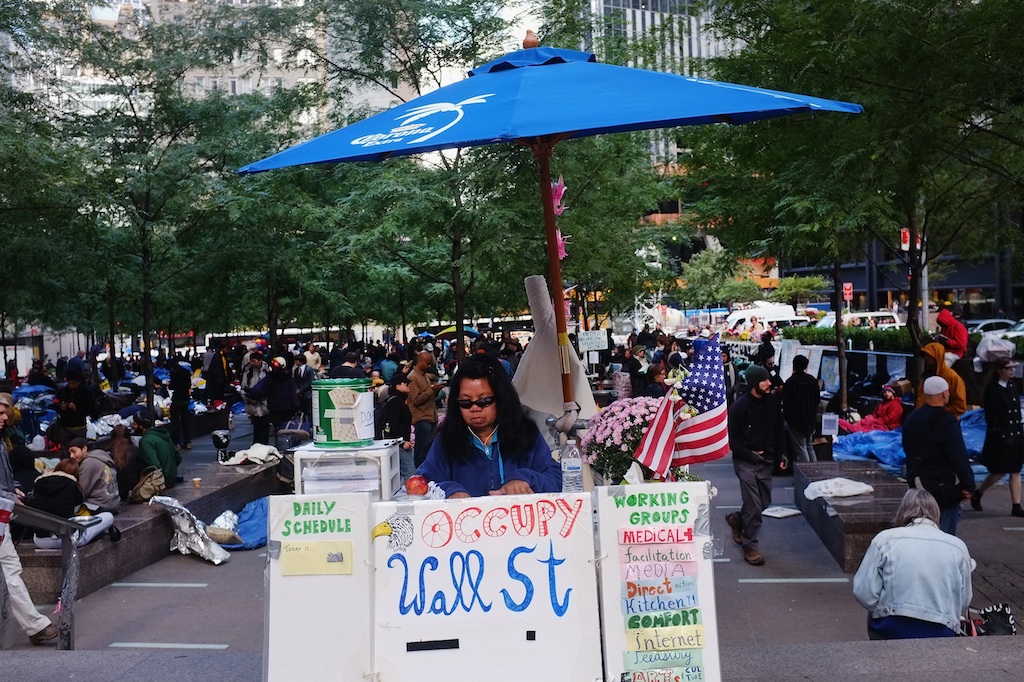
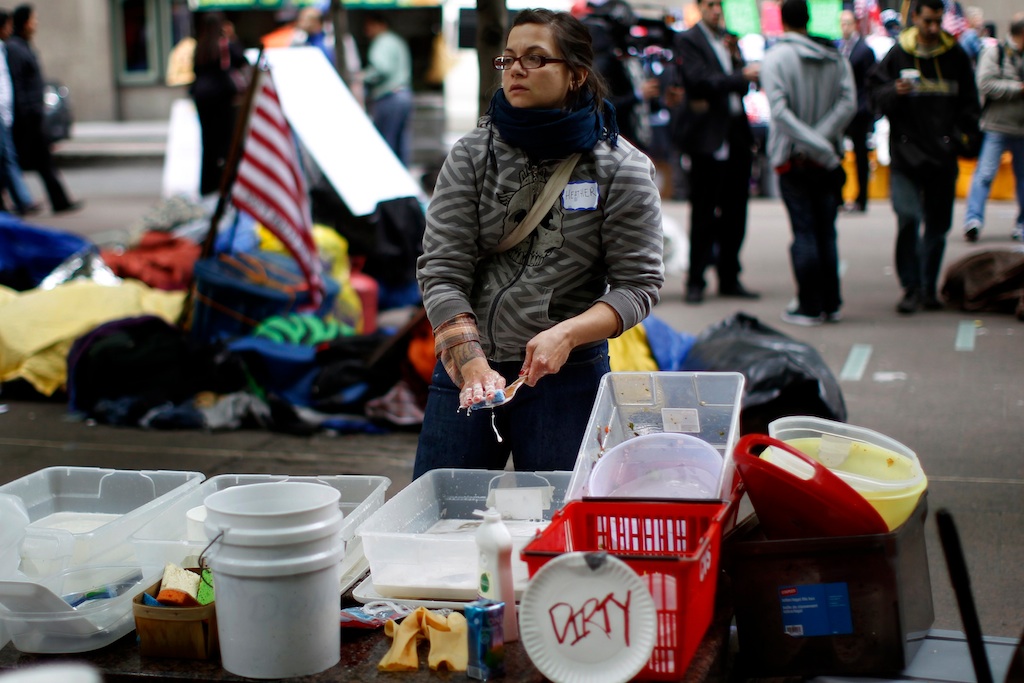
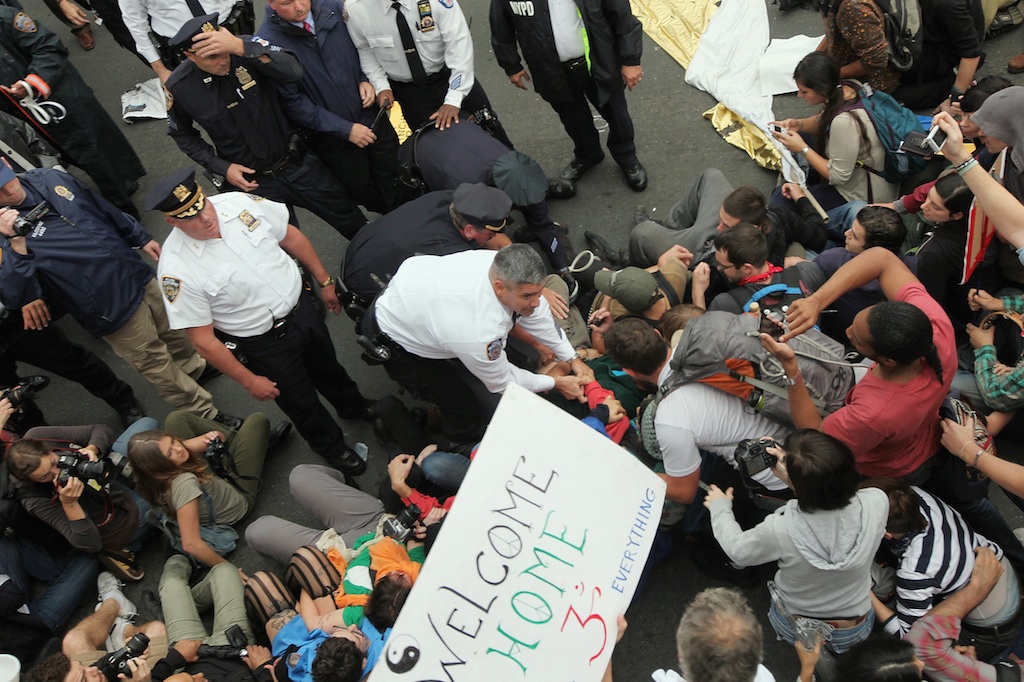
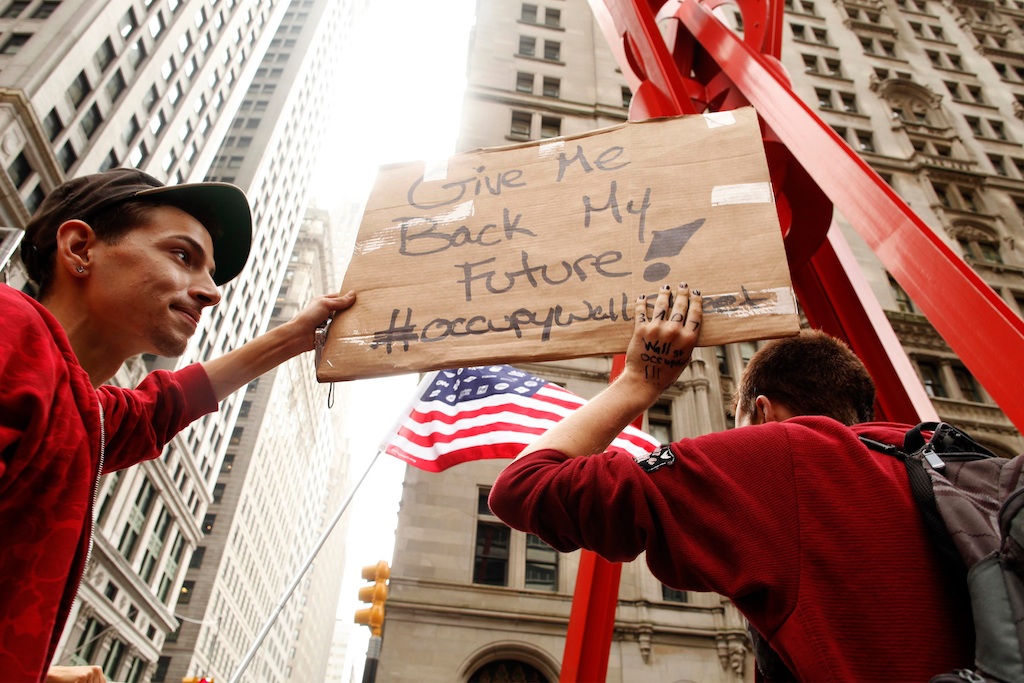
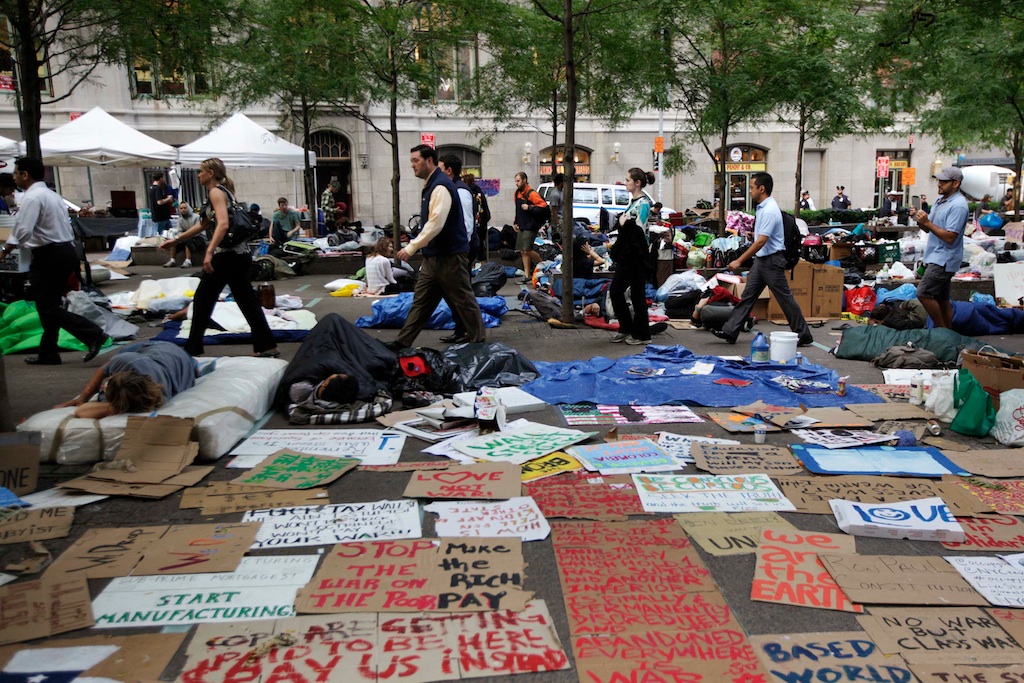
And
Italian youth … not wanting to be left out of the fun … gather in
Rome in October (2011) to protest against economic injustice. As
in Athens and London, things turn violent.
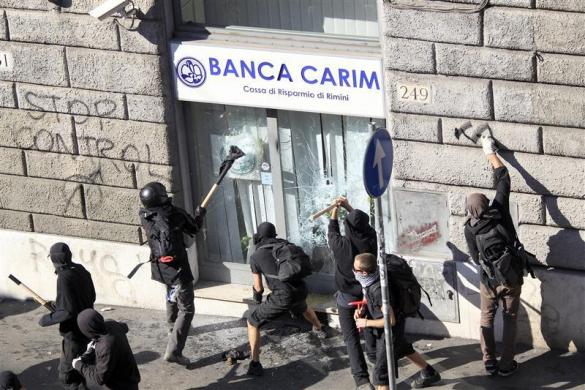 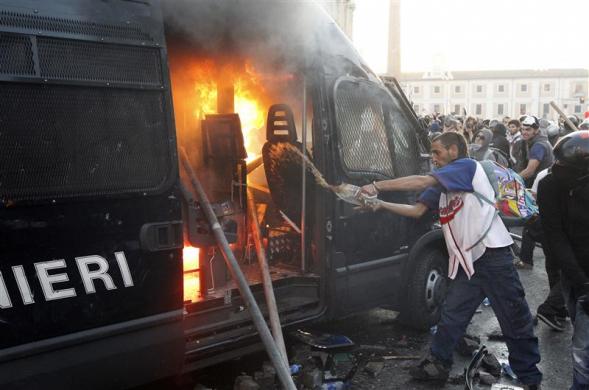
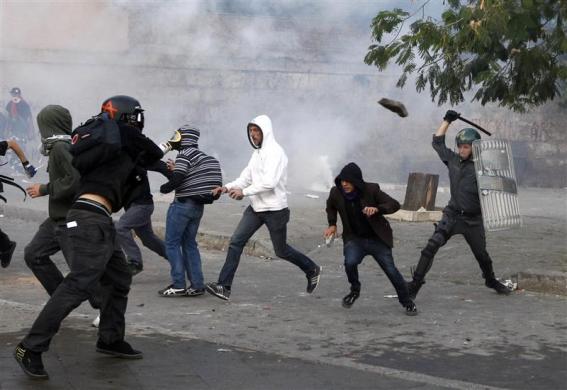 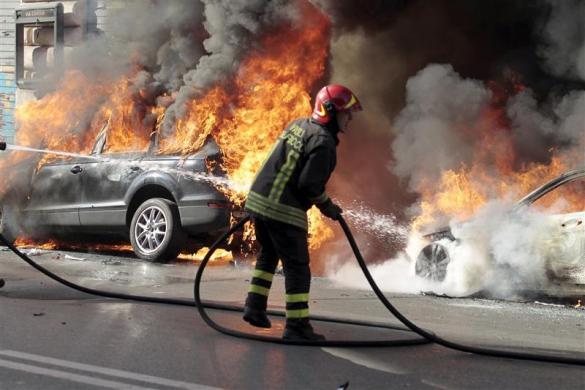
THE SITUATION IN SYRIA WORSENS |
|
The founding of the Islamic Caliphate or ISIS
Meanwhile, individual Sunni Muslims from around
the world came to chaotic Syria to support a new Islamic Caliphate
(also known as the Islamic State of Iraq and Syria, or ISIS) that,
because of all this social chaos, had succeeded in establishing itself
in the heavily Sunni border region of Eastern Syria and Northwestern
Iraq. This founding and rapid growth of ISIS under Abu Bakr al-Baghdadi
(chosen by a special Shura council as Caliph in 2014) was finally
proving to be a matter of great concern to Obama. The Caliphate was
attracting the following of young Sunni Muslims from around the world,
with its graphically displayed (via the internet) beheadings of
"infidels," the blowing up of Shi'ite mosques, and even the destruction
(August 2015) of the formerly well-preserved 2000-year old Roman town
of Palmyra.
The world was shocked by such behavior. But the
Muslim militants were greatly pleased to bring the infidel world to
such shock, and planned more of exactly such demonstrations of Islamic
piety.
The mounting Syrian refugee problem
At the same time, some ten million Syrians,
approximately half of the Syrian population, found themselves uprooted
by the violent civil war, and by the behavior of the ISIS fanatics who
executed indiscriminately Arabs, Kurds, Turks – even European
journalists (70 or more) trying to cover the Syrian story.
As of early 2018, some 5½ million Syrians had
left the country and taken up residence in dismal refugee camps in
Lebanon, Jordan, Turkey and Iraq. Others made their way towards Europe
– Greece, Italy, France, Germany being their destination (Germany alone
took in well over a million refugees, including some also from Iraq and
Afghanistan).
The Syrian quest for "democracy" and "civil
rights" had become a humanitarian nightmare of monumental proportions.
And America found itself unable to offer any counsel or support that
could help restore peace to Syria. Meanwhile, both Russia and Iran now
found themselves well-placed strategically in the pivotal Middle East
country of Syria as major Assad allies. America was a big loser in
this round of global competition.
|
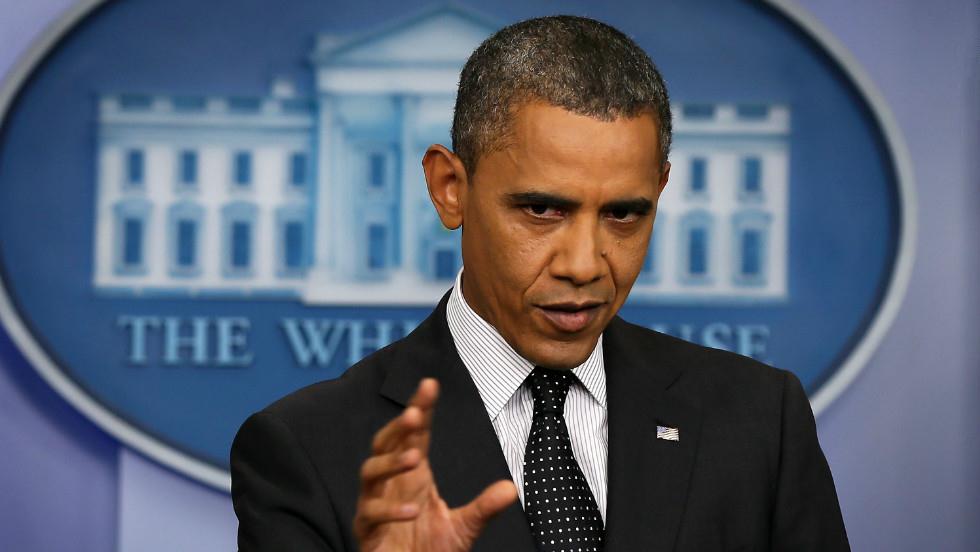
Obama warning Syria not to cross
a "Red Line" in using illegal (chemical/biological) weapons (August 20,
2012) 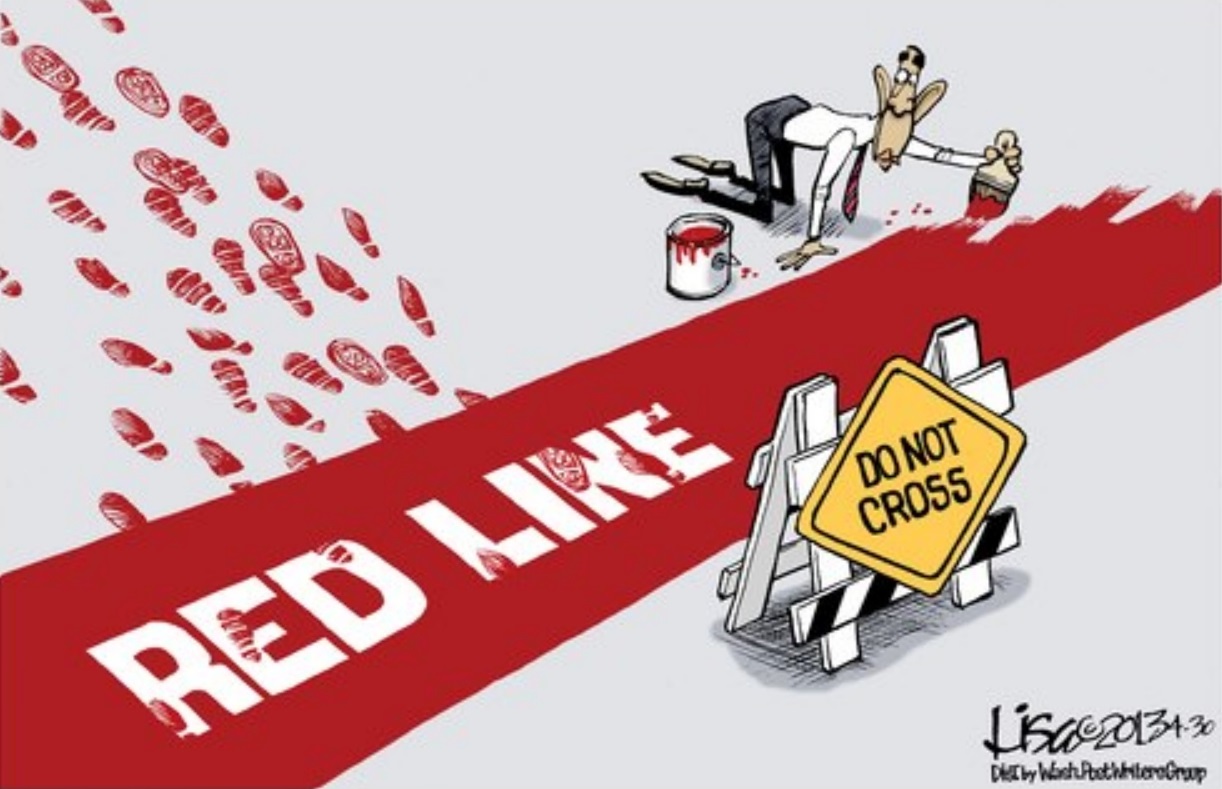 Obama took a lot of flack for his "Red Line"
threat! Obama took a lot of flack for his "Red Line"
threat!
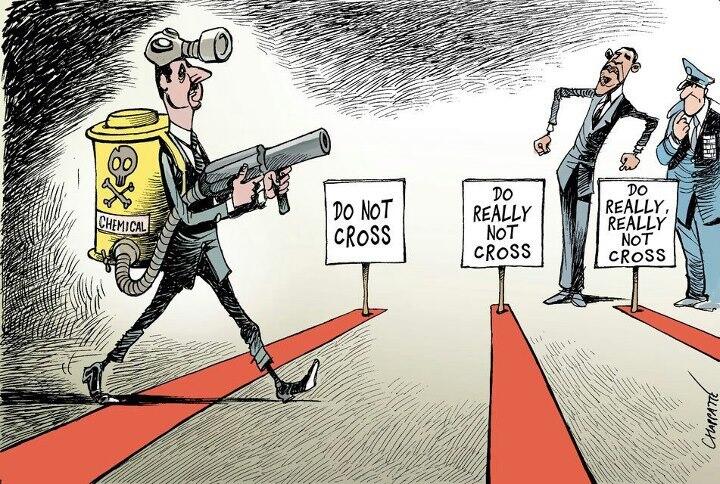 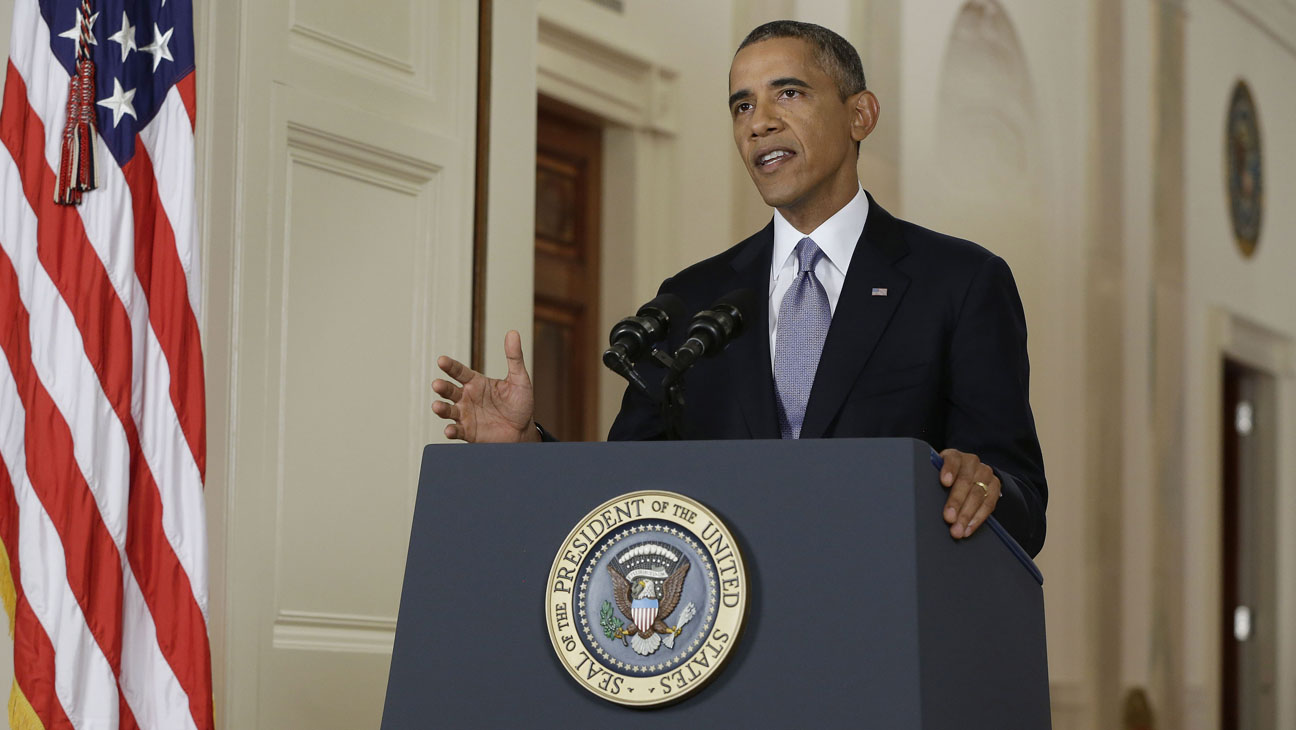
A year later (September 10, 2013) Obama goes
before the nation with a special televised address concerning the situation in Syria
... and
America's need to step into that situation to straighten things out.
The Islamic Caliphate or State
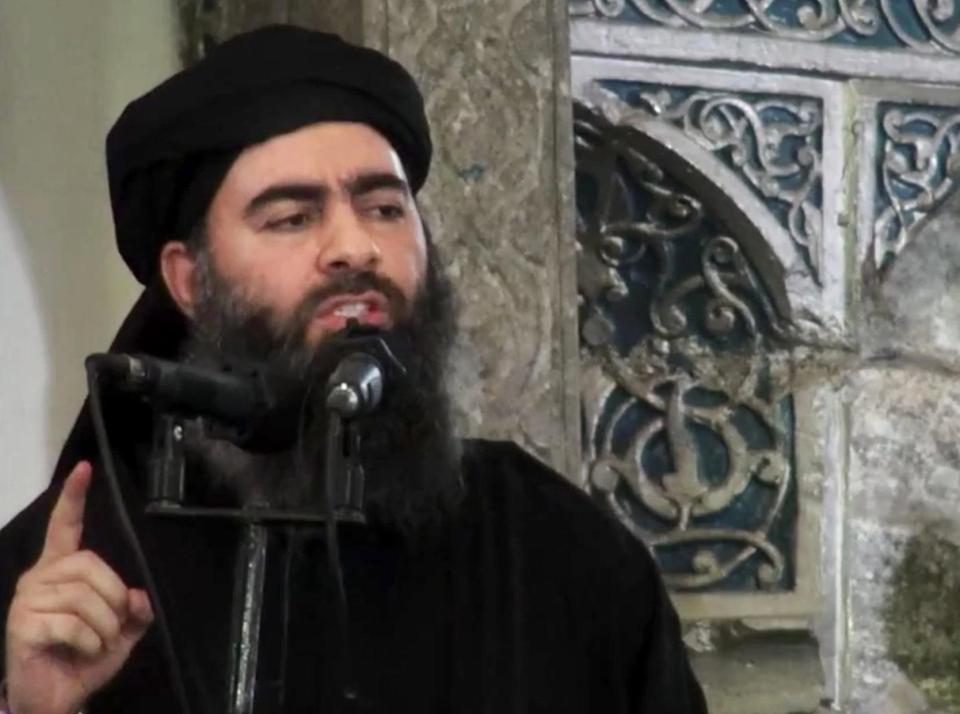
They
claimed that out
of the chaos of Syria (and a highly disenchanted Sunni Iraq in the
country’s northwest) they were going to build a new social order
founded on the strictest rules of the Islamic faith. They would
"cleanse" the society of anyone not submitting to this new regime of Shari’a (Muslim law). The beheading of men and stoning of women
became the
hallmark of the new regime, graphically presented in video
streaming … making their point … and attracting a huge number of
disenchanted Muslim youth (from even America and Europe ... as
well as the Middle East and Africa) who wanted to be part of such a
major event
as the restoration of the Caliphate.
|
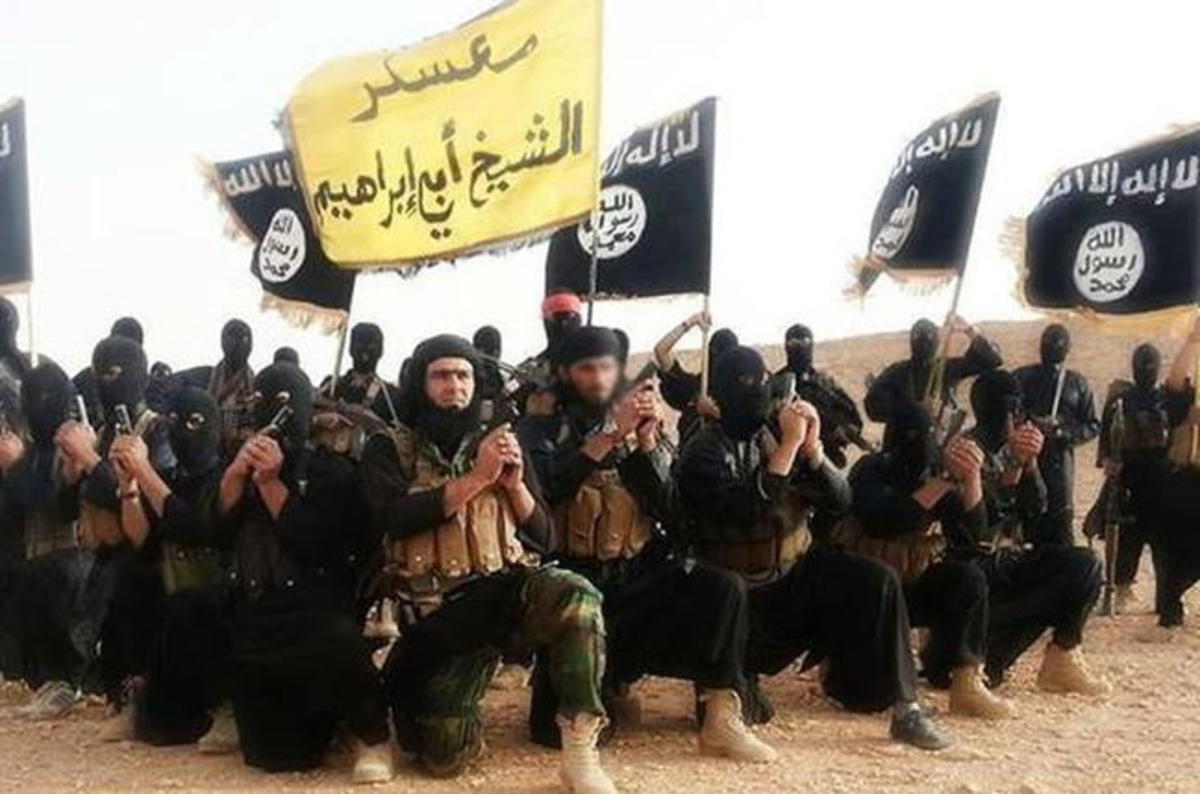
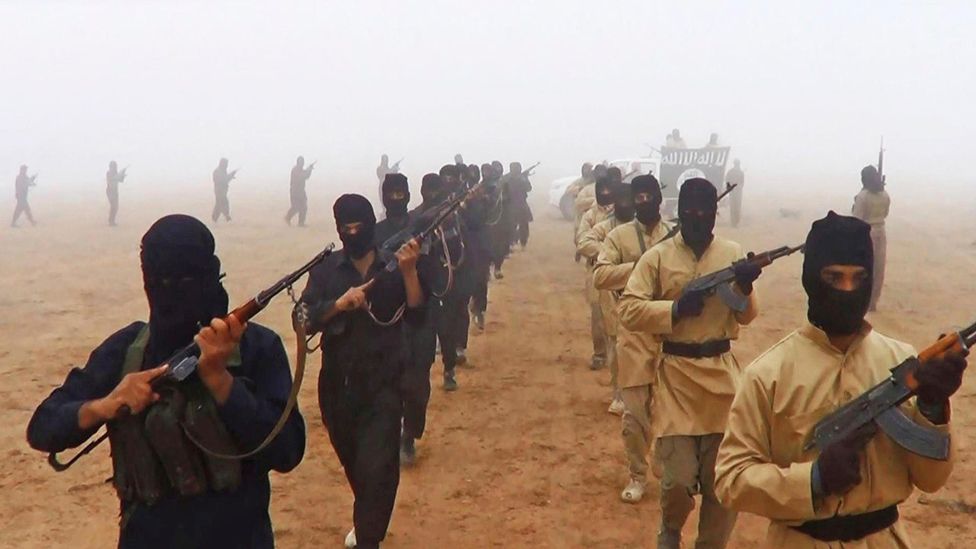 By
mid 2015 ISIS had spread its control along communication lines
connecting vital parts of northern Iraq and Eastern Syria … and were
trying to reach into Kurdish territory in the Iraqi
northeast.
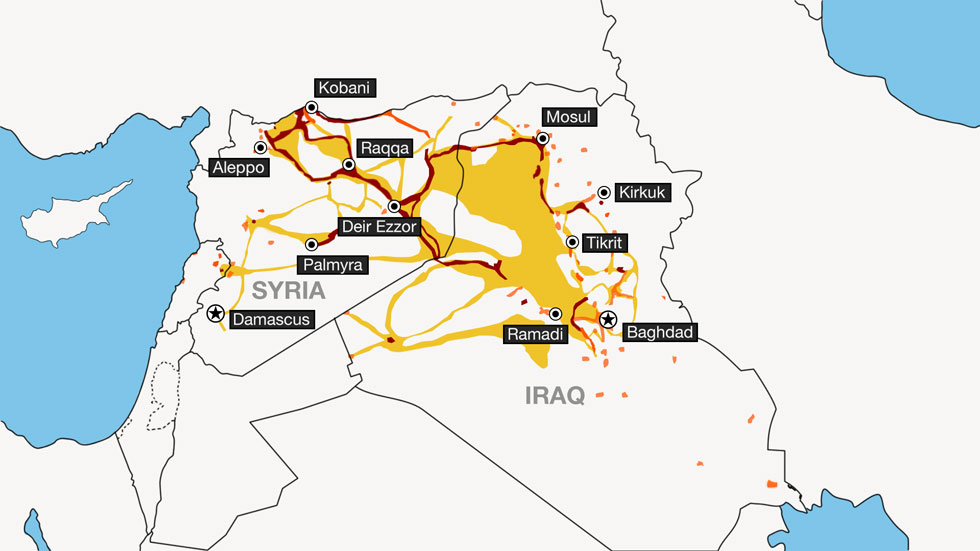

Roman ruins at Palmyra leveled by ISIS
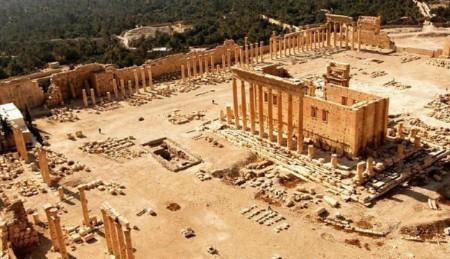
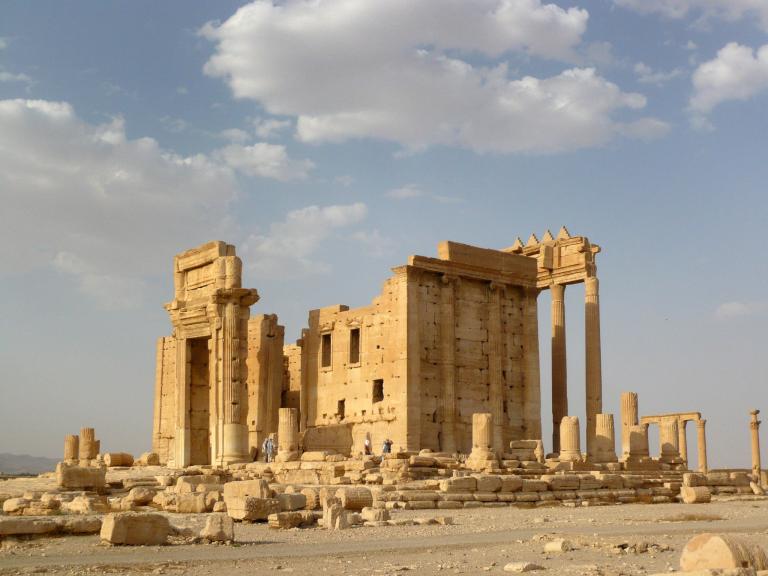
The world was shocked when ISIS displayed pictures of the
1900-year-old Roman Temple of Bel
in Syria that they had just systematically destroyed.
(August 2015)
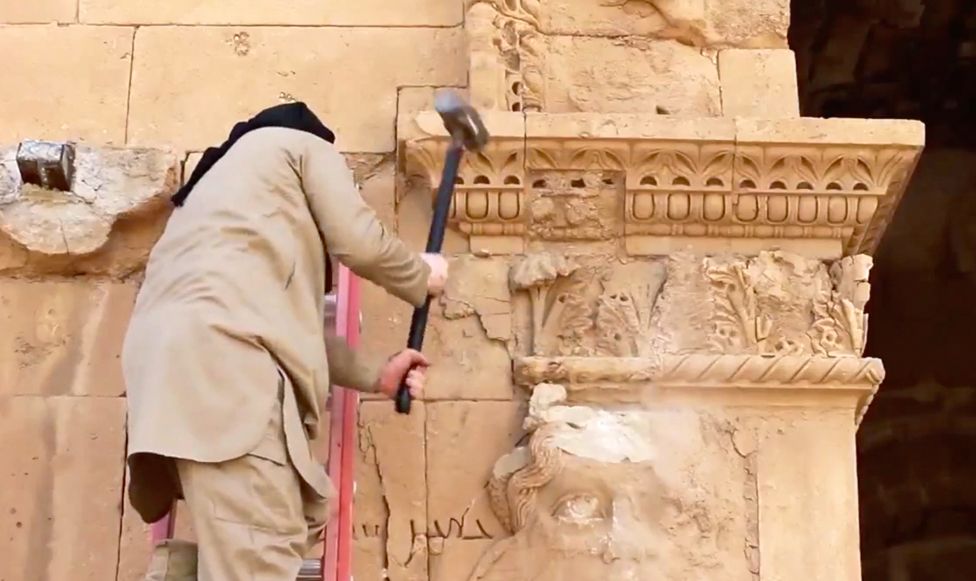
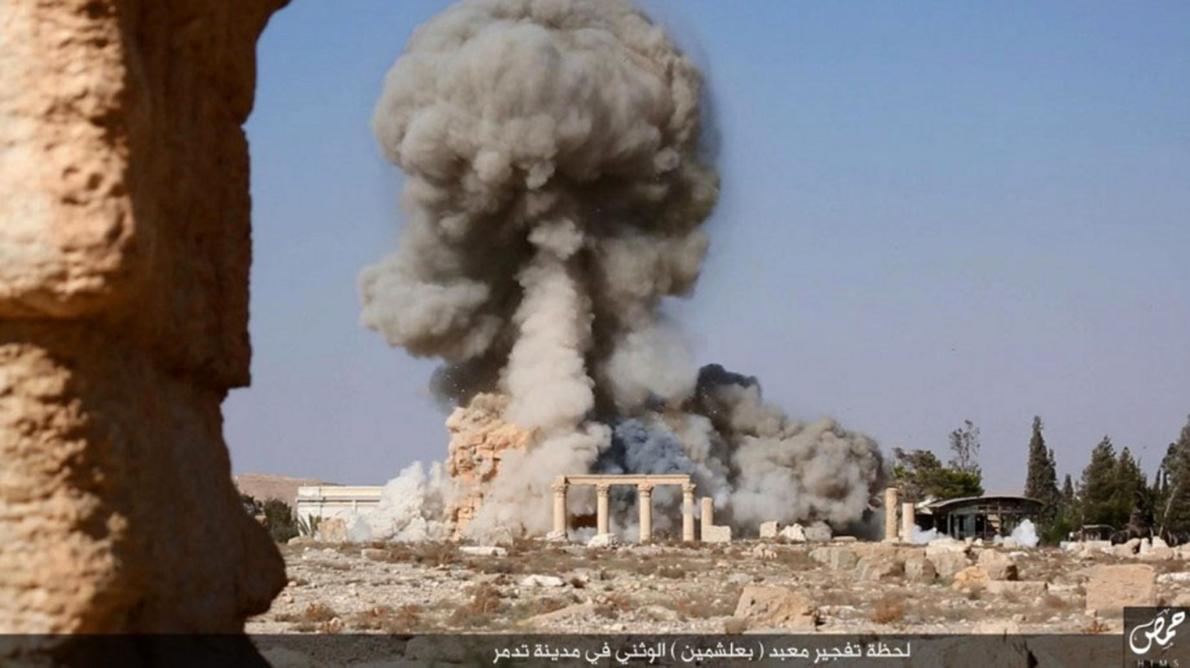
The Temple of Bel (or Baal) before /
and after ISIS had done its work
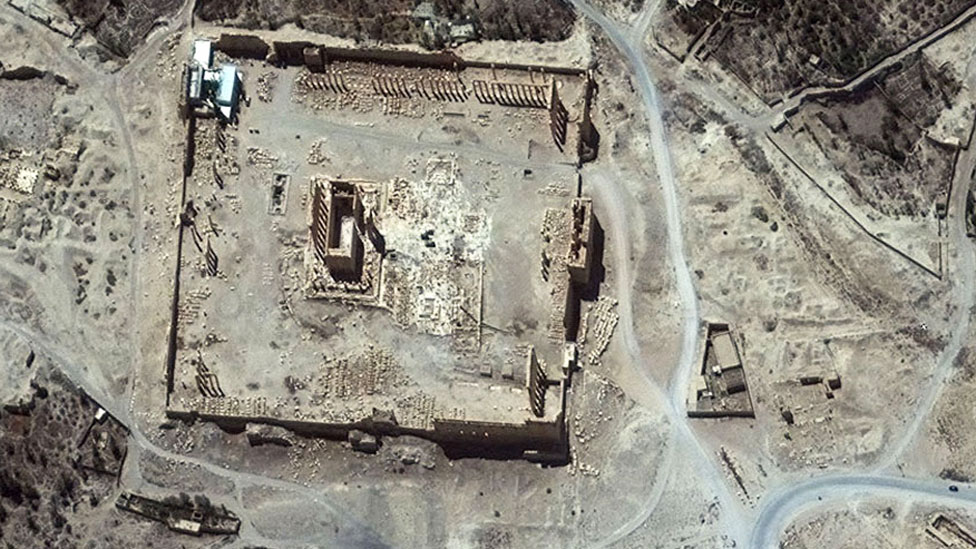
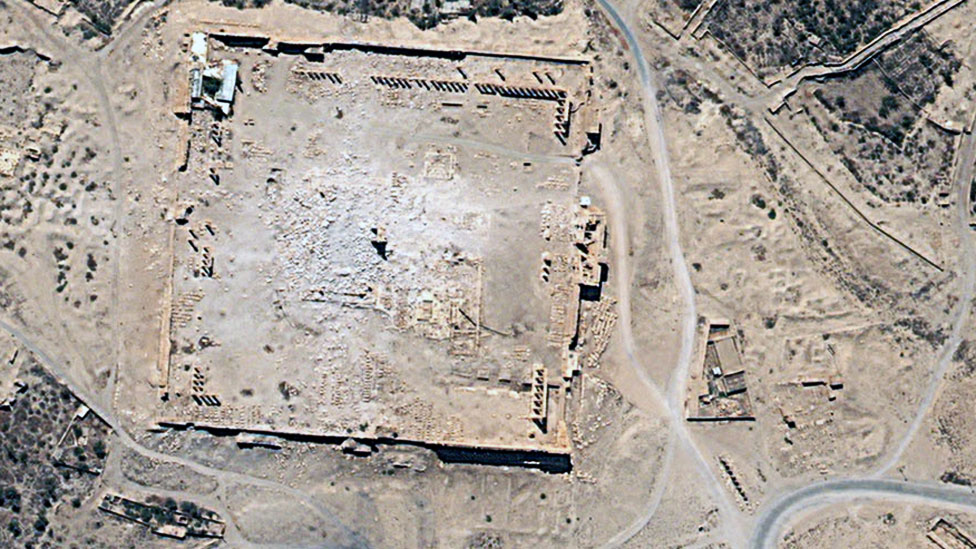
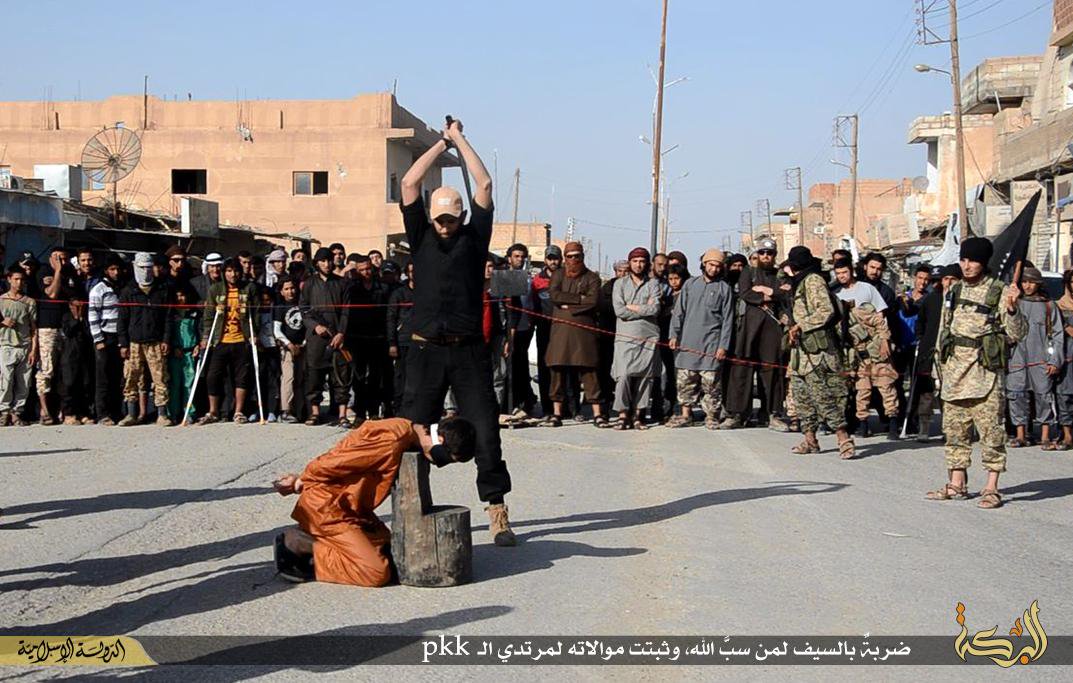
ISIS
beheadings were sent out as internet videos to frighten enemies …
and
woo budding jihadists into joining the movement (March
2015)
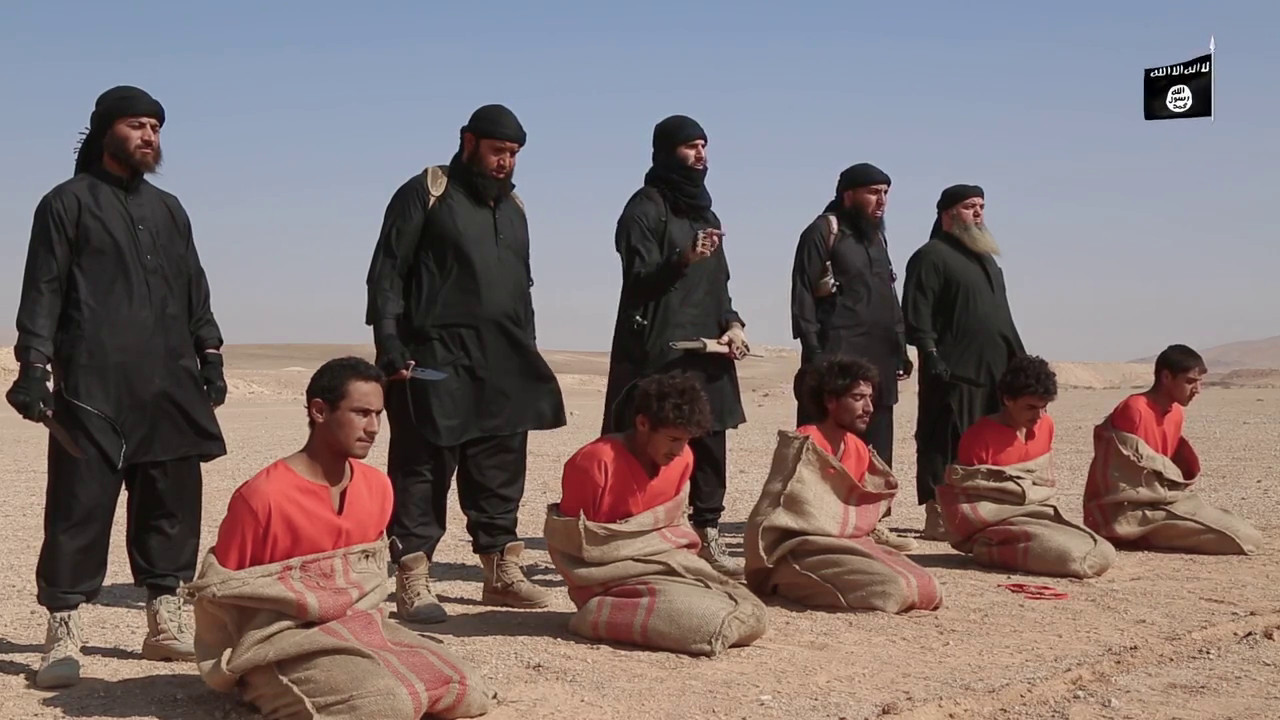 (December
2016)
(December
2016)
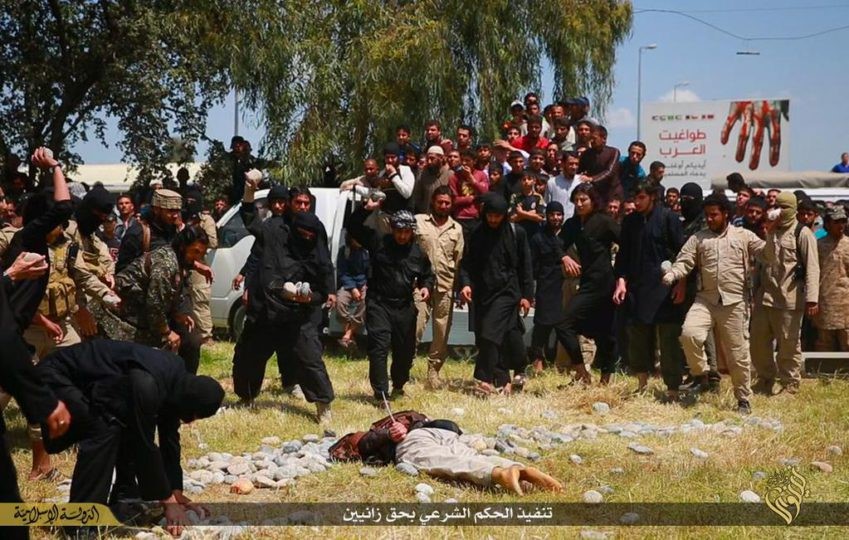
An Iraqi woman stoned to death in Mosul City …
for having
refused to marry an ISIS jihadist (Oct 2016)
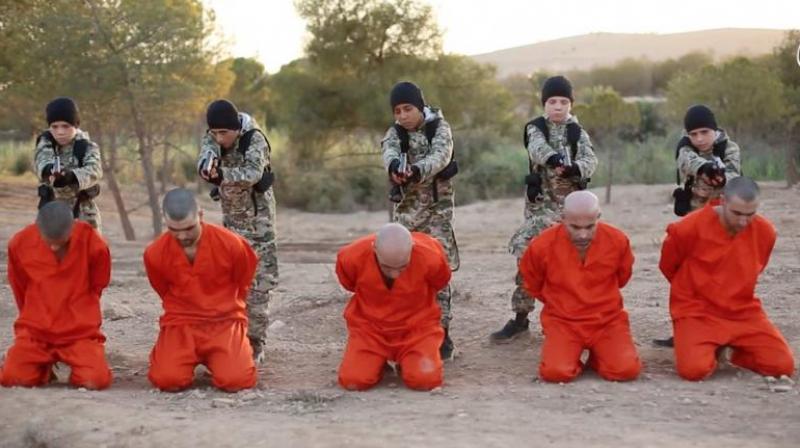
ISIS children executing Kurdish prisoners (the second from the
right is an 11-year-old English boy)
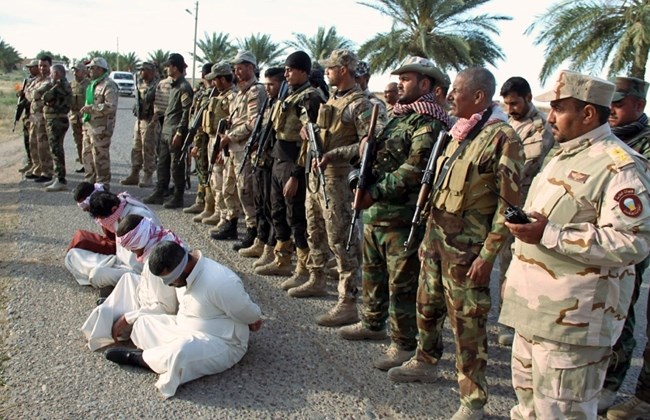
At the same time Iraqi forces (heavily Shi’ite) strike
back where they can
… in an attempt to retake territory seized by (Sunni)
ISIS.
A Syrian refugee camp – part of the 1.4 million Syrians driven from
their homes as of April 2013.
By 2017 that number will reach 7
million.
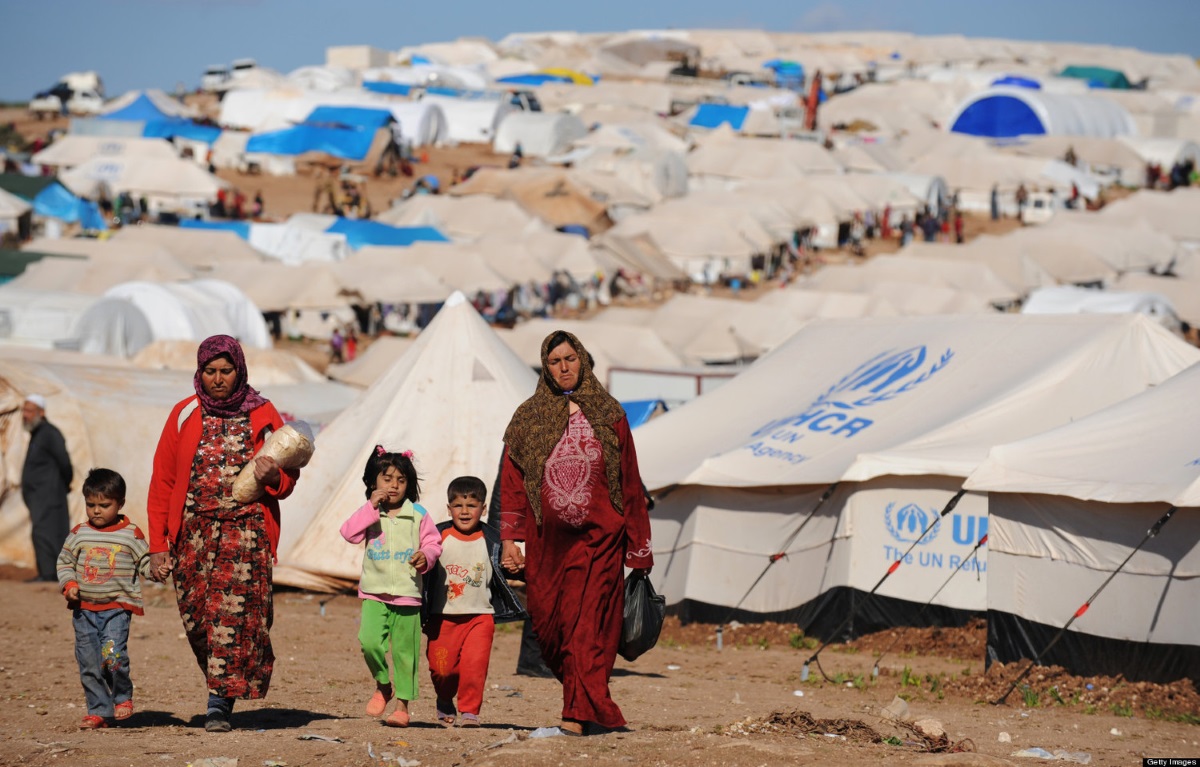
A UN-run refugee camp in Lebanon – 2013
All
of this merely increased the desperate flow of refugees … particularly
out of Syria where
ISIS was extremely cruel to non-Sunni Arabs
(including many Christians). This of course
presented a
major problem to the surrounding countries … which did not want to take
on the burden of a massive number of impoverished
refugees.
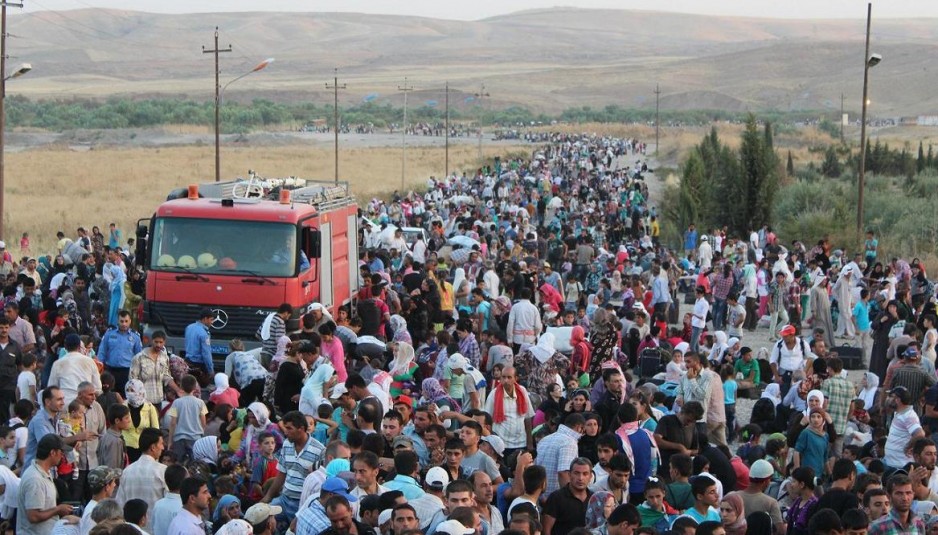
August 2013 – Refugees heading toward Iraqi
Kurdistan
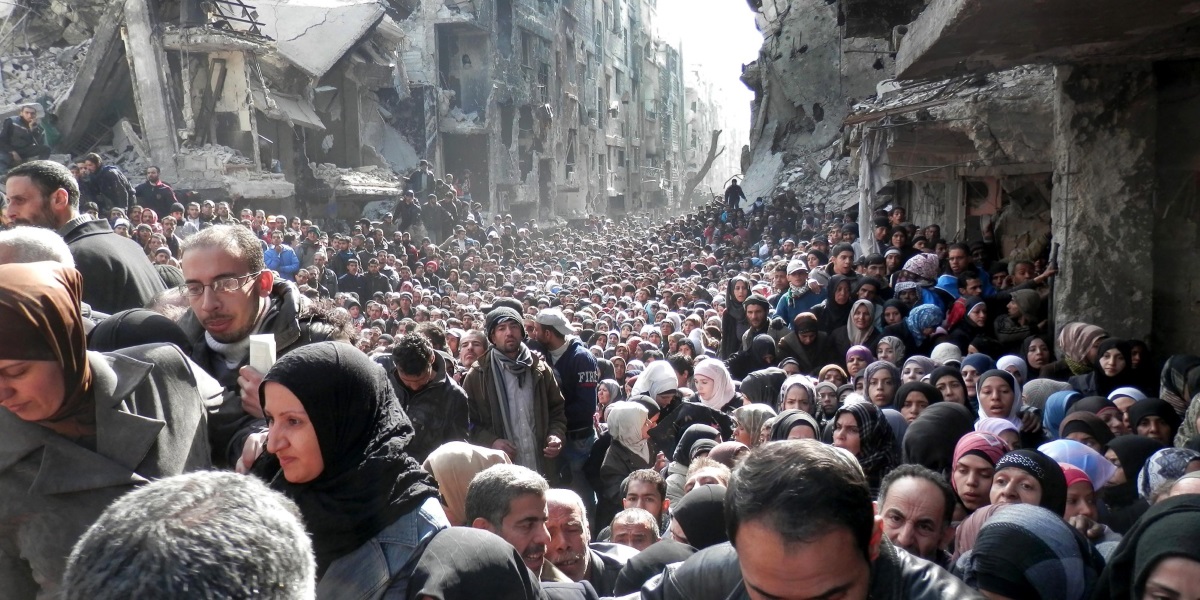
February 2014 – more Syrian refugees moving out of their destroyed
cities
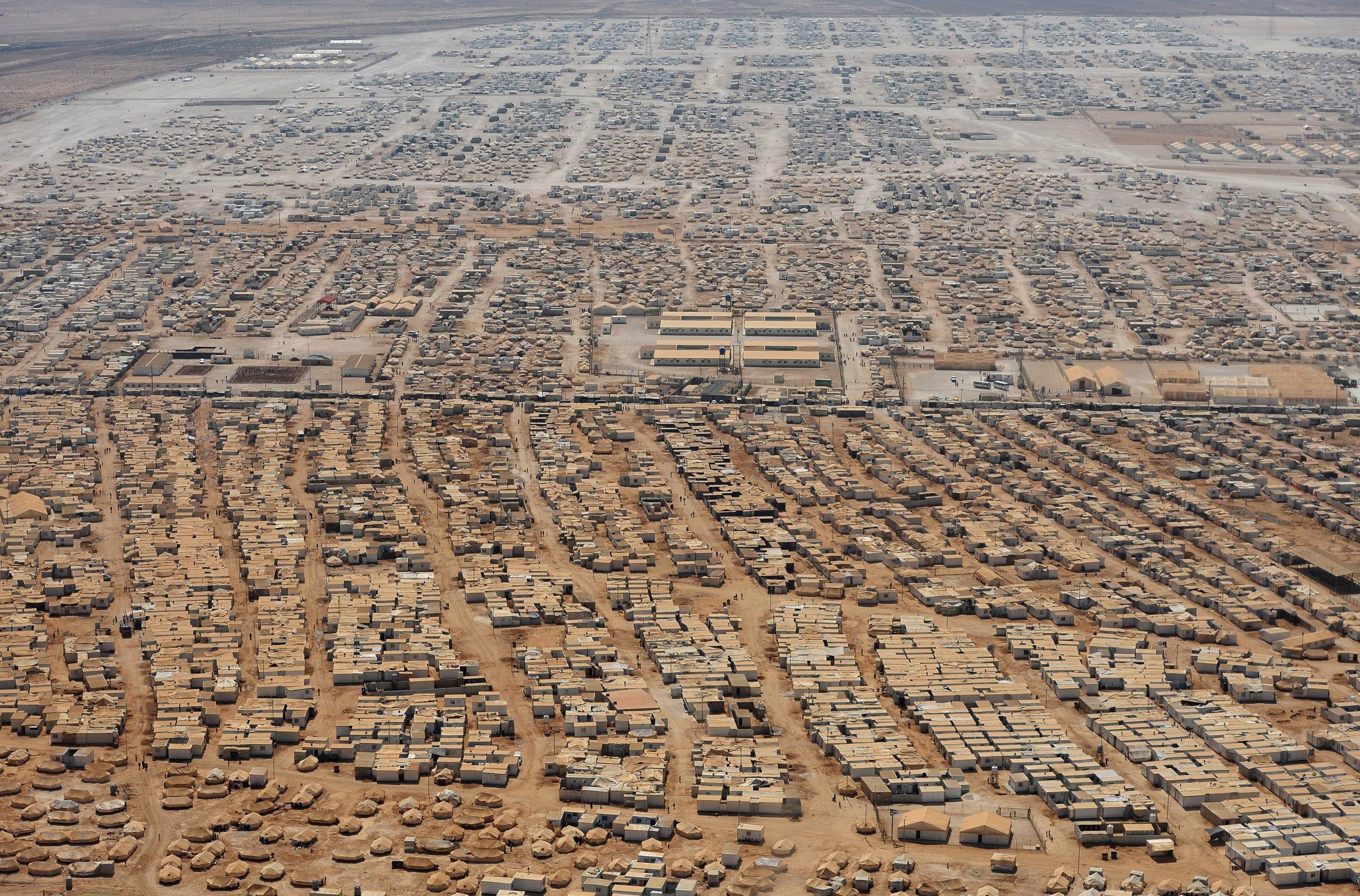
A Syrian refugee camp in Jordan with
115,000 residents. By 2015
fully 25% of the population of Lebanon was made up of Syrian refugees and 20% of the
Jordanian population ... with huge numbers of Syrians scattered all around the
countries bordering on Syria ... and even beyond.
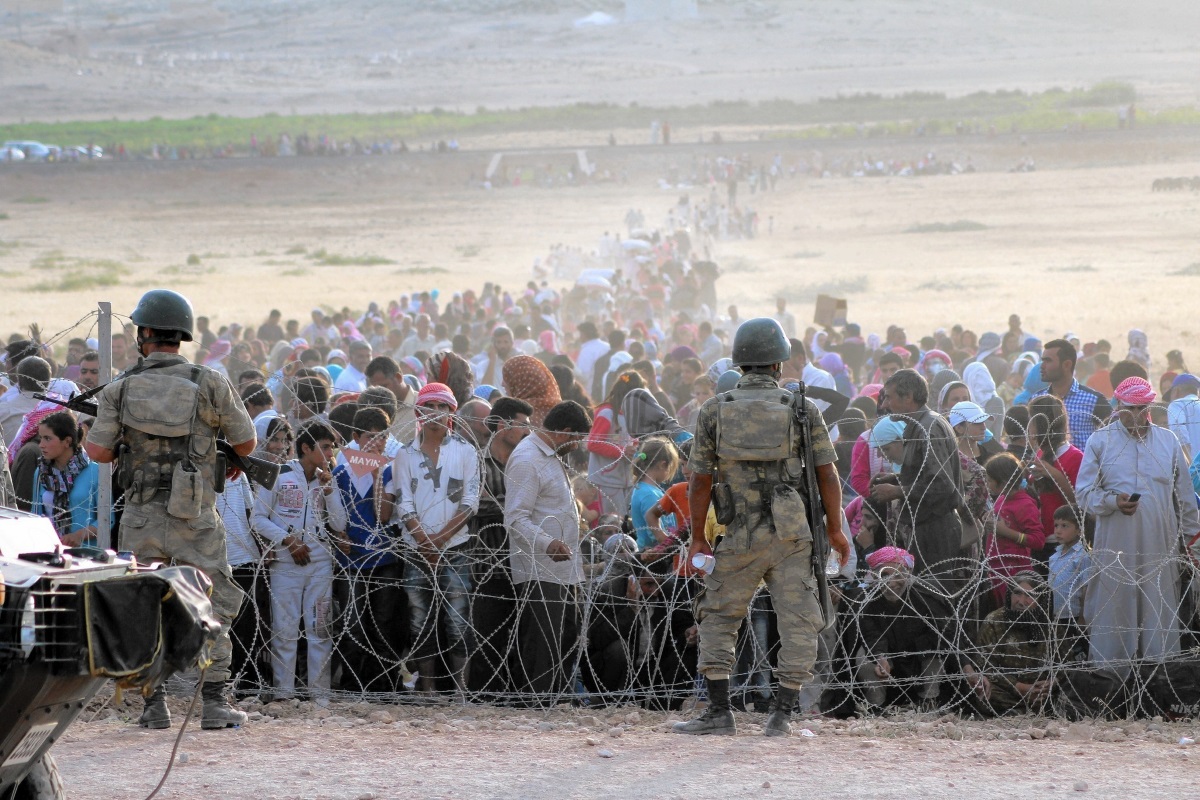
Many other Syrians have simply taken to the road
... trying to reach well
beyond the Syrian borders ... even to Europe
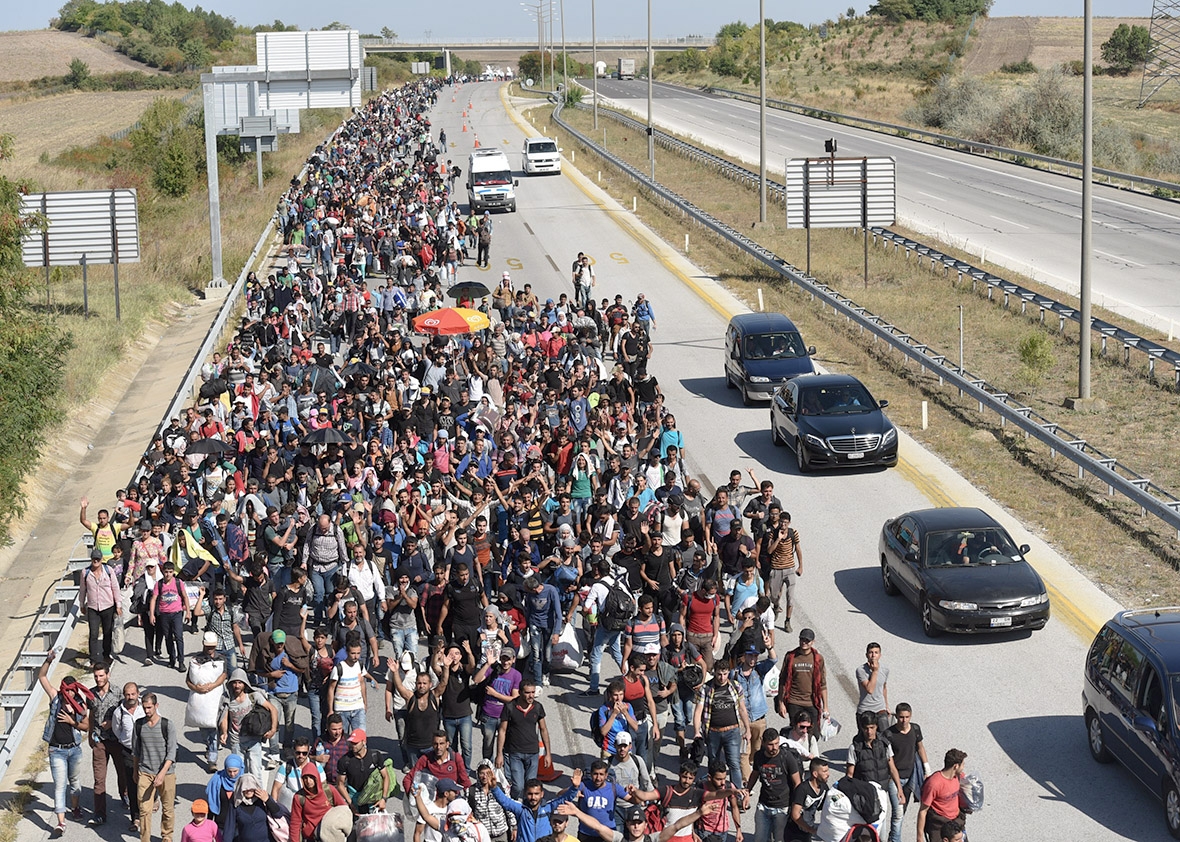
September 2015 -
Syrian refugees heading across Turkey to Greece
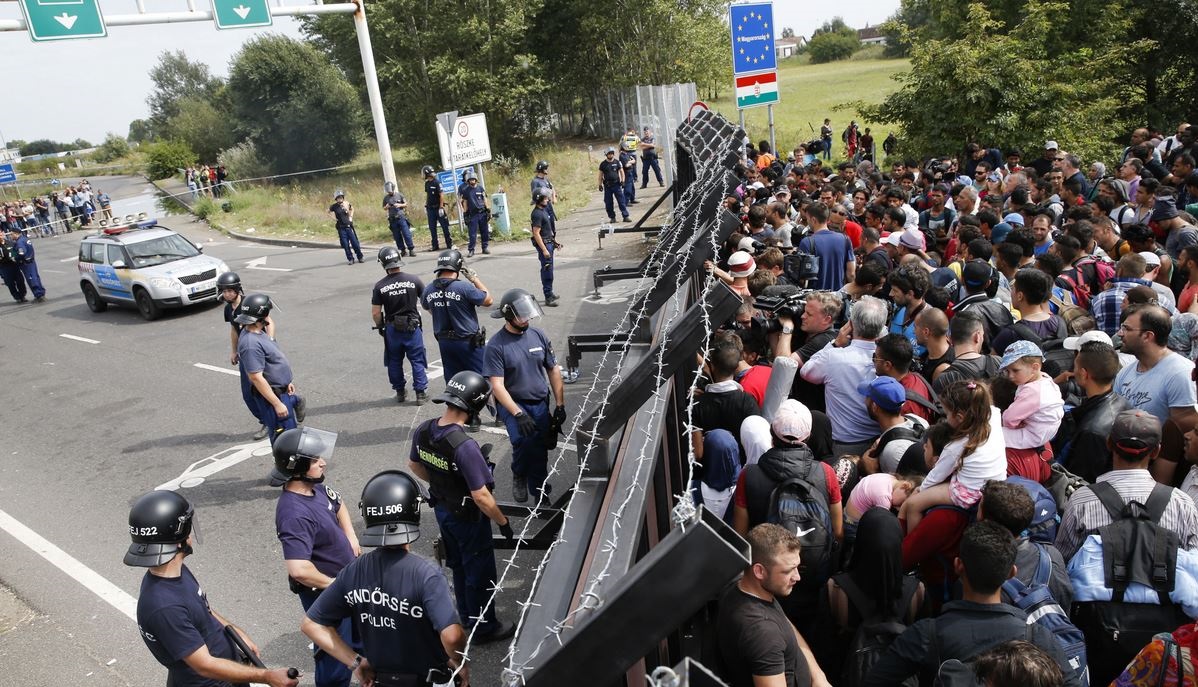
Others
passed on through the Balkans … but got stopped at the Hungarian border
…
which had put up barriers to stop the flow of refugees into Hungary
(2015)
MEANWHILE OBAMA HOPES TO IMPROVE RELATIONS
WITH IRAN |
|
Obama's hope to soften relations between America
and the world of Islam found its greatest disappointment in Iran,
though because of the bitterness of Iranian domestic politics, not
because of American actions. After the end of the long and murderous
Iran-Iraq war of the 1980s, efforts were made on both American and
Iranian sides to improve relations. This was not a straightforward
issue because Iran was itself divided deeply into both a very
conservative Islamic faction, backed by the Supreme Leader, the
Ayatollah Ali Khamenei, and the radical Islamic Revolutionary Guards –
and by a modernizing, reformist faction led by pro-business or free
market and free-speech civilian leaders. Neither faction intended to
move the country away from its Islamic Revolution. But each took a very
different approach to developing Shi'ite Iran.
From 1981 to 1989, the President of Iran
was Khamenei (who then in 1989 became Iran's Supreme Leader with the
death of Khomeini that year). During Khamenei's presidency, Iran
undertook to purge the country of Western, especially American,
cultural influences. Thousands (the exact number is unknown) of
Iranians were killed during his presidency, frequently by the
revolutionary courts run by the Revolutionary Guards.
But from 1989 to 1997, Iran moved
politically in the direction of the modernizing reformers when Akbar
Hashemi Rafsanjani served as President of Iran. He was followed in
office by Mohammad Khatami, an Islamic cleric, although another
moderate, who was Iranian President from 1997 to 2005. Despite this
move to the "center" of politics during Khatami's presidency, relations
with America remained highly troubled both because of changing American
policies towards Iran and because of a push-back by Iranian
conservatives; yet relations with Europe and other parts of the world
showed notable improvement as Iran attempted to get its economy up and
moving again.
Over time the Islamic conservatives
became more effective in their efforts to thwart Khatami's reforms at
home. The 2005 national election was fought between the reformer
Rafsanjani, who was eligible to run again for the presidency, and the
arch-conservative mayor of Tehran, Mahmoud Ahmadinejad. With only about
a 60 percent turnout of the Iranian voting population, Ahmadinejad took
61.7 percent to Rafsanjani's 35.9 percent. With this election, Iran
took a decided turn back toward militant anti-Western – especially
anti-American – Islamic nationalism.
Soon Ahmadinejad found himself also lined
up against the United Nations over the question of the country's
developing nuclear power. His argument that it was being developed for
energy purposes appeared totally unbelievable, since the country sits
atop one of the world's largest oil and natural gas reserves, and seems
hardly to need nuclear power to fuel its economy. Indeed, with the
increasing stridency of the Ahmadinejad presidency, it seemed ever more
apparent that he had ultimately other purposes in mind for the nuclear
program, especially when he was also pushing hard for the development
of an Iranian missile program.
In 2009, Iran was due for another
presidential election. Supreme Leader Khamenei made an official
endorsement in favor of the re-election of Ahmadinejad. Opposing him
was the reformist candidate Mir-Hossein Mousavi. The campaign turned on
the issue of the economy (very high inflation and unemployment rate),
with Mousavi advocating for a free market system, supported by the
middle and upper class of Iran, and Ahmadinejad, continuing his
socialist program, supported by Iran's poor and its large group of
unemployed. The elections, with an unexpectedly huge turn-out this
time, brought victory for Ahmadinejad with 62.6 percent of the vote
reported and Mousavi, with 33.7 percent.
But the results were challenged both at
home in Iran and abroad because, among other things, of a number of
electoral irregularities – principally the 14 million unused ballots
that went missing. The challenge in Iran turned massive and violent.
Protesters turned out into the streets, voicing deep anger not seen in
Iran since 1979. Demonstrations (the Iranian "Green Movement") against
– as well as counter-demonstrations in support of – Ahmadinejad filled
the streets of Tehran. In the conflict arrests were made, lives were
lost, and eventually the regime got the country back under order.
Interestingly, internationally, there was
a sharp division of opinion on the election, with America and most
European countries voicing a concern about the way the election was
handled, yet with most of the countries of Asia (including China),
Africa and Latin America voicing support of Ahmadinejad's re-election.
By this point Obama had ceased his
friendly overtures to Iran and found himself taking the standard line
of American presidents since the 1979 Iranian revolution. (Obama
continued the policy of refusing formal diplomatic relations with
Iran.) Obama had become a major voice in the United Nations in the
effort to curb Iran's nuclear development under Ahmadinejad. Obama also
made it quite clear that he condemned the Ahmadinejad government's
harsh repression of the 2009 Iranian protest movement.
In 2013, the newly-elected Iranian
President Hassan Rouhani (re-elected in 2017) indicated a desire he had
for improved relations with the West. The American and Western response
was highly positive and the two parties agreed to meet. The fruit of
that meeting was the 2015 Joint Comprehensive Plan of Action (JCPOA)
negotiated between Iran on one hand and America, Britain, France,
China, Russia and Germany on the other, to bring some agreement in the
long-debated Iran nuclear program. The agreement allowed Iran as of
January 2016 to continue development of low-enriched uranium used to
power nuclear power plants (weapons require a very high level of
enrichment), a deep reduction of Iran's uranium stockpile and the
number of centrifuges, and sites where low-level enrichment could
continue, as well as the shut-down of a heavy-water facility. All of
this was designed to prevent Iran from being able to develop nuclear
weapons. In return, economic sanctions imposed on Iran (prohibiting the
purchase of Iranian oil) would be lifted gradually, and Iranian banking
assets held abroad would likewise be released gradually, once the
International Atomic Energy Association inspectors confirmed Iranian
conformity to the agreement.
Obama and Secretary of State Kerry
informed the American press that this agreement was the best way to
ensure that Iran would not (for the foreseeable future anyway) be able
to develop nuclear weapons capability.
But doubters felt that it would be too easy for the Iranians to
withdraw from the agreement when it no longer suited their interests.
And the Iranians were well-known for ways they could accomplish things
secretly, despite international monitoring. But for the time being (as
long as Obama was in office) America would continue to stand with the
JCPOA agreement, key to the new American-Iranian relations.
|
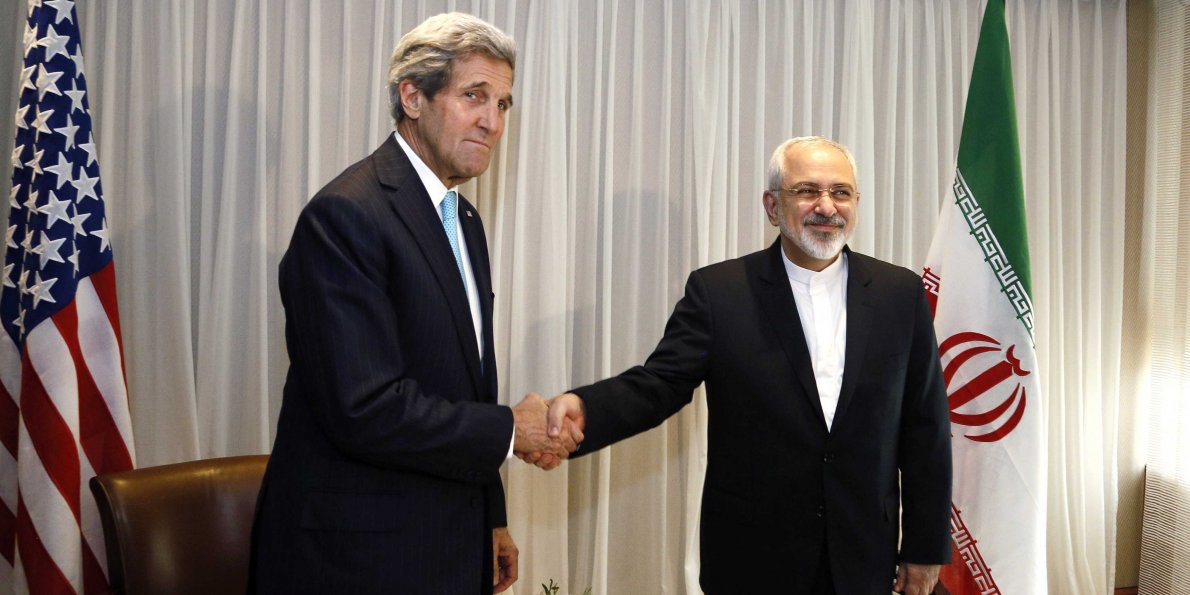
US Secretary of State John Kerry shaking hands with Iranian Foreign Minister Mohammad Javad Zarif
agreeing to begin talks concerning an Iran nuclear deal – Geneva, January 14, 2015
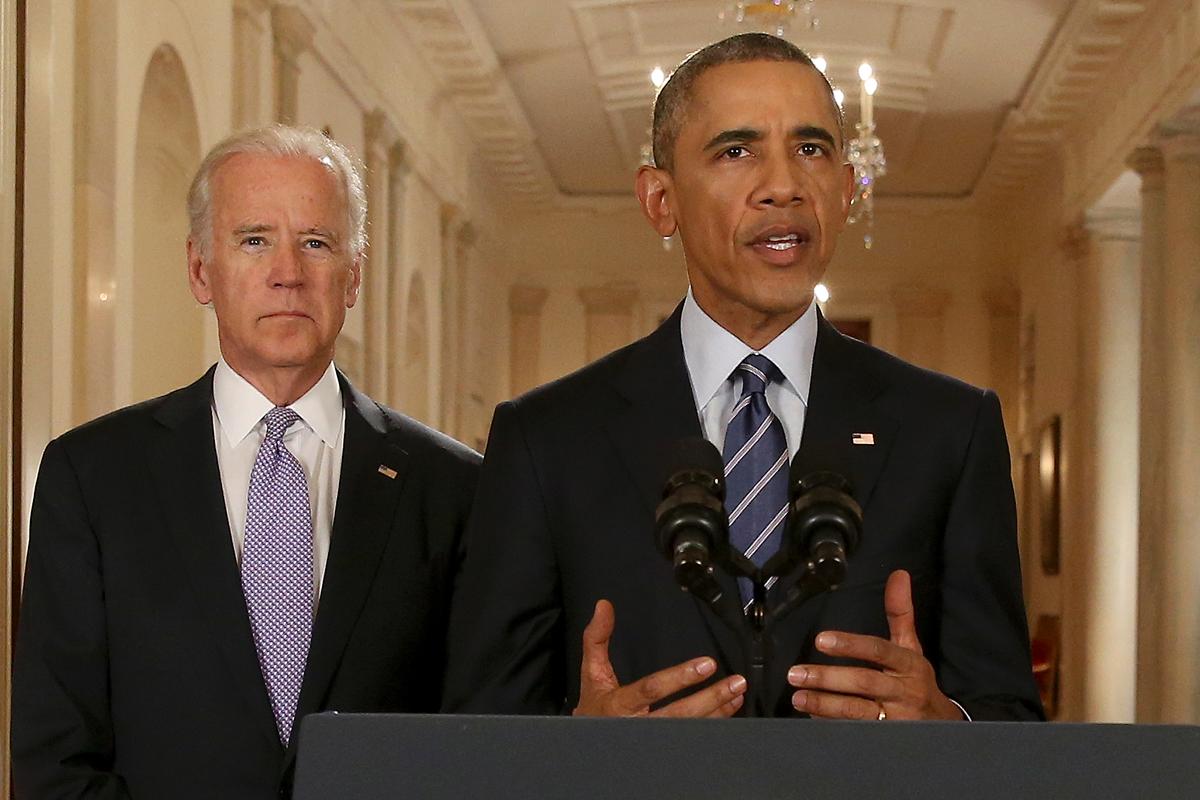
Obama announces agreement on the deal – July 14, 2015
RELATIONS WITH CHINA ... AND NORTH KOREA |
|
One of the great hopes of the Obama presidency
when it took power in 2009 was to lessen the tensions that had been
growing between America and China over the dramatically one-sided trade
relationship that favored China because its economy had been allowed to
be protected by Chinese mercantilist policies as it entered the
competitive world market. But with the rapid growth of the Chinese
economy, the age of the need to protect an infant market system was
long past. But the protections remained in place. As a result, cheap
Chinese goods flooded the American market, driving out American
producers, and sending trillions of dollars to China as a huge growing
dollar reserve – allowing China additional social leverage in its
dealings with America.
The Chinese used that dollar reserve not
only to buy oil for its hungry economy (growing at an annual rate of 9
to 10 percent annually since the 1980s and thus doubling in size
approximately every seven years) driving up the price of oil in the
process, but also purchasing other scarce minerals, purchasing land
development rights in Africa and Latin America, but also buying up the
debt of European governments – thus helping them keep afloat, but also
placing them as debtors under very persuasive Chinese influence.
However, it was not just troubled European governments that were
sliding into this relationship. The American government also was headed
rapidly down this road as it attempted to keep the American economy
afloat with government spending, which meant government debt, which
meant a larger claim of China on the American government and economy as
it gladly bought up American debt with its dollar reserves.
What the American economy really needed
to get back up and running was a reversal of this dynamic. And that
would have to start with the Chinese allowing its currency, the
renminbi (also known as the yuan), to float to a true market exchange
value. But the Chinese were not willing to do that. The whole system
worked beautifully to the advantage of the Chinese economy. A more
expensive renminbi would lower considerably the Chinese ability to
export its production, forcing a cutback on production and increasing
unemployment within the huge Chinese work force.
Of
course, the failure of China not to free
up its currency was having exactly the same effect on the American
workforce. So the problem was not one of "let's find a compromise," but
rather "who is going to win and who is going to lose in this economic
tug of war." As negotiations with the Chinese moved forward during the
early Obama years, it was quite apparent that the Chinese were not
going to budge. They figured that they had a lot to lose if they did
so. America was wealthy and could take the heat better than China. But
Obama knew that Americans were becoming very agitated over the high
unemployment and general stagnation of the economy. And with the
congressional elections coming up in late 2010 Obama sensed that he and
his Democratic Party were going to take a big hit from the American
voter – which was exactly what happened.
In addition to these economic issues
impacting direct Chinese-American relations, Obama's decision to "Pivot
to Asia" greater American military-diplomatic involvement was received
by the Chinese as some kind of new American containment policy with
respect to China. Obama's idea was to strengthen our relations
economically and militarily with other Asian powers, such as Australia,
South Korea, Taiwan, etc. Obama claimed that the Pivot to Asia actually
included a greater emphasis on Chinese-American relations as well. But
the Chinese leadership was not convinced that this was indeed the case.
Also the long-standing role of America as
protector of the freedom of navigation through the South China Sea
began to come under Chinese challenge when Chinese President Xi Jinping
began to talk aloud about protecting its own territorial rights in the
South China Sea – territorial rights which literally reached close to
the shores of the numerous countries ranged around that sea. Xi defined
the South China Sea as "Chinese territory." This deeply alarmed Japan,
South Korea, Taiwan, Vietnam, the Philippines and Malaysia, all of
which must pass through some or all of the South China Sea in order to
trade with Europe, the Middle East, India, etc. China agreed to
negotiate maritime rights with the border countries, notably Vietnam,
the Philippines, and Malaysia, but made it clear that oil and gas
reserves belonged to China alone, and all fishing rights would have to
come under Chinese authority.
But in 2014 the Philippines challenged
China on this matter at the Permanent Court of Arbitration (at The
Hague, Netherlands). Other Southeast Asian countries soon did the same.
In 2016 the Court decided in favor of the Philippines. But China was
not moved by this decision.
Meanwhile the Chinese in 2014 had begun
dredging reefs in the Spratly Islands group (close to the Philippines),
creating islands on which they could then build naval and military
facilities, with the obvious intent of enforcing their territorial
claims from these man-made islands. By the beginning of 2016, work
there was completed. Also, China was strengthening its navy with the
building of yet another aircraft carrier, by which they could also
patrol "their waters." In 2016, both America and China conducted naval
exercises in the South China Sea, in an attempt to make their points,
in opposition to each other: America to keep the sea open as
international high sea – and China to assert its full sovereignty over
the sea. But in the end, China had taken a vastly stronger position in
the dispute – one that would only swing even more strongly in China's
favor in the future. There really was little at this point that Obama
was willing to do ... fearful of starting a war with China.
But that certainly was not going to
happen. China was not looking for war – just strategic position. Then
why, for instance, hadn't Obama also ordered the dredging and military
island-building of America's own naval base, somewhere else in the
Spratly Islands, as a countering emplacement of American power designed
to protect the status of the South China Sea as international high
sea? Ultimately, his "Pivot to Asia" came with no muscle.
|
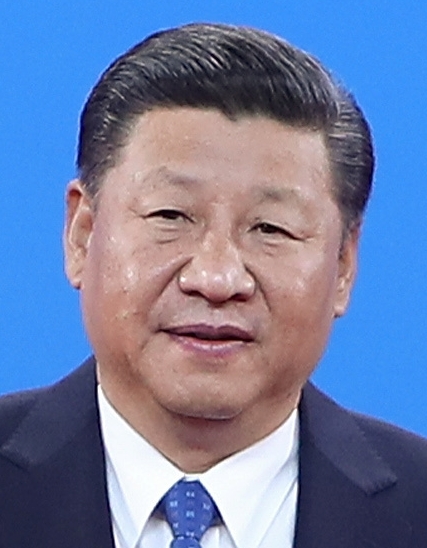
The world stood in shock as Xi Jinping’s China begins to press
forward most forcefully its territorial claim to the waters (and
islands) of the South China Sea … ignoring all current standards concerning the neutrality of the high seas.
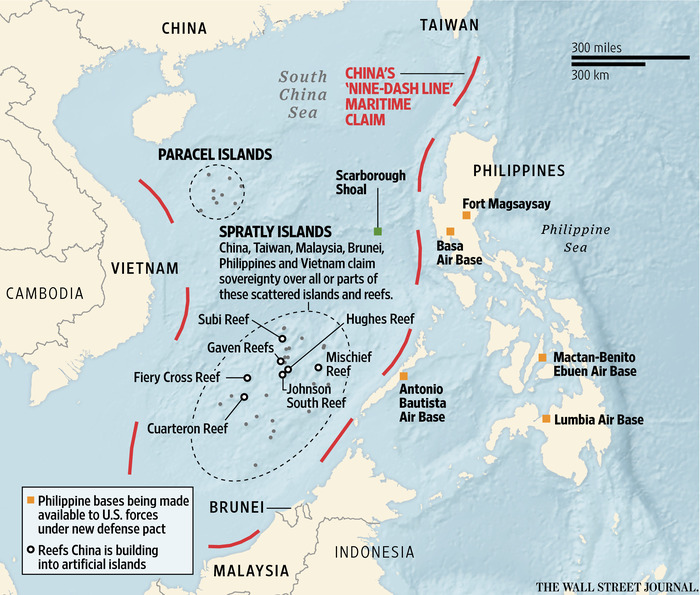
The area is of vital importance to the commerce and economy of many nations that surround the South China Sea.
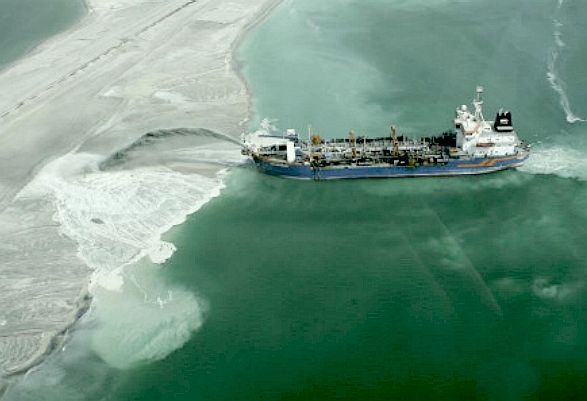
To
enforce these territorial claims, the Chinese in 2015 begin to dredge
the waters surrounding a number of coral reefs located in the South
China Sea
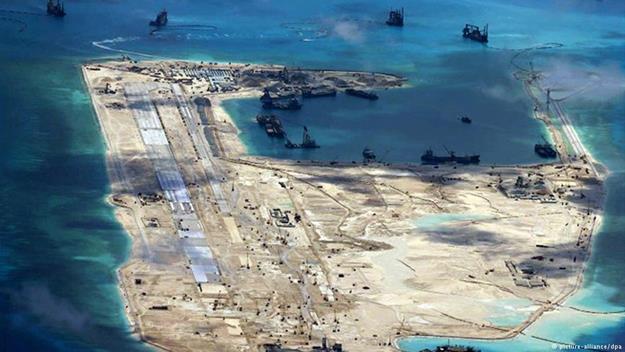
… to fill them in with land so as to construct airfield and
naval bases on these newly man-made
islands.
The world watches in horror ... but does nothing. This includes the world's major
superpower, America – or its President Obama – to stop this territorial grab.
Meanwhile, in December of that fateful
year 2011, North Korea gets a new leader when
Kim Jong-il dies … and
power is transferred to his second son, Kim Jong-Un.
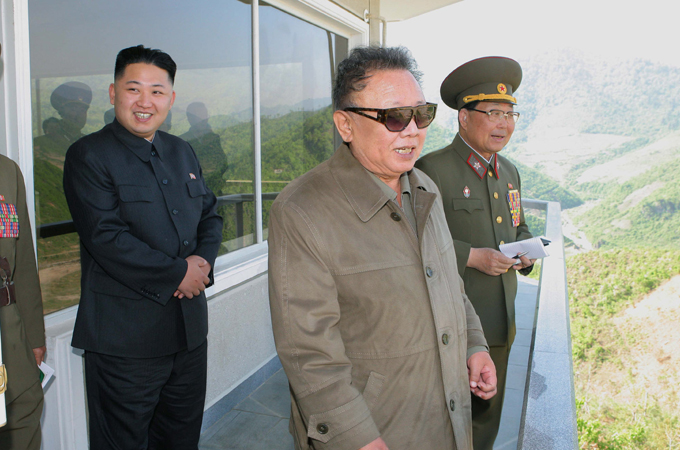
Kim Jong-il, center,
with his son Kim Jong-un, left,
in a photo released by North Korean state
media in May 2011
Al Jazeera: "International
reaction: Kim Jong-il's death" – December 19, 2011
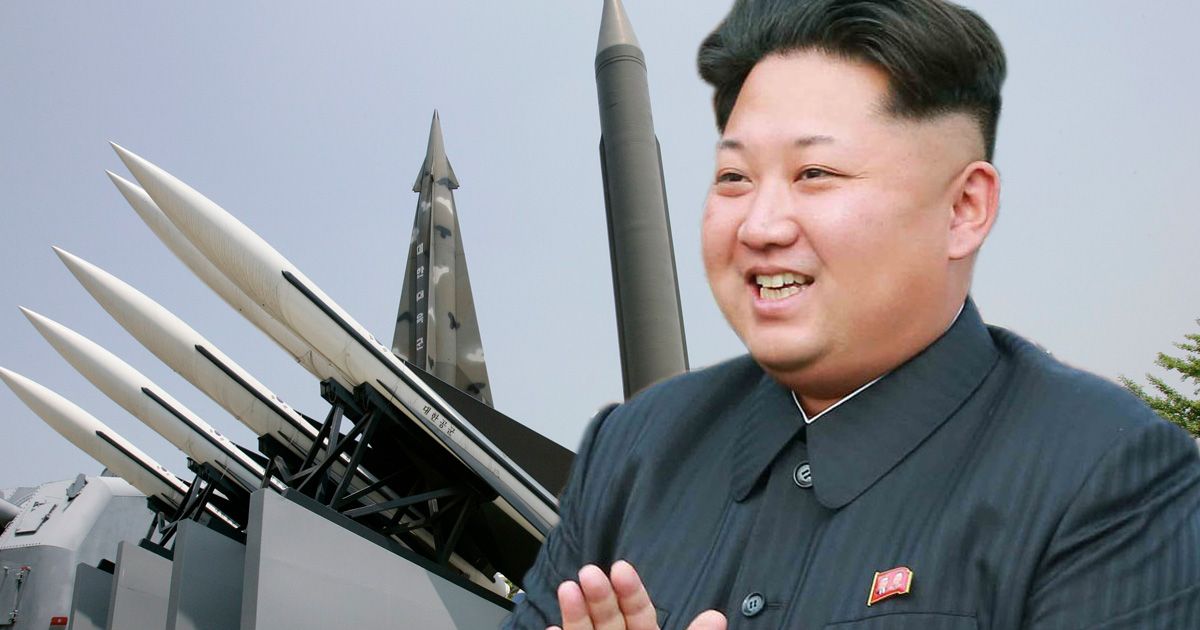
The rise to power of Kim
Jong-un seems only to have made North Korea more
belligerent
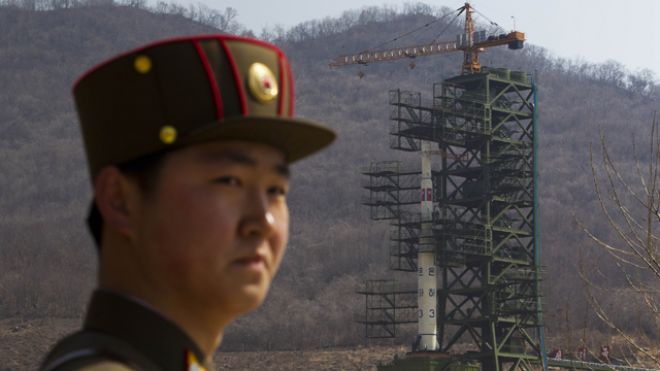
April 8, 2012: A North
Korean soldier stands in front of the country's Unha-3 rocket,
slated for liftoff in mid
April, at a launching site in Tongchang-ri, North Korea. Note however: the rocket exploded in
mid-air shortly after take-off.
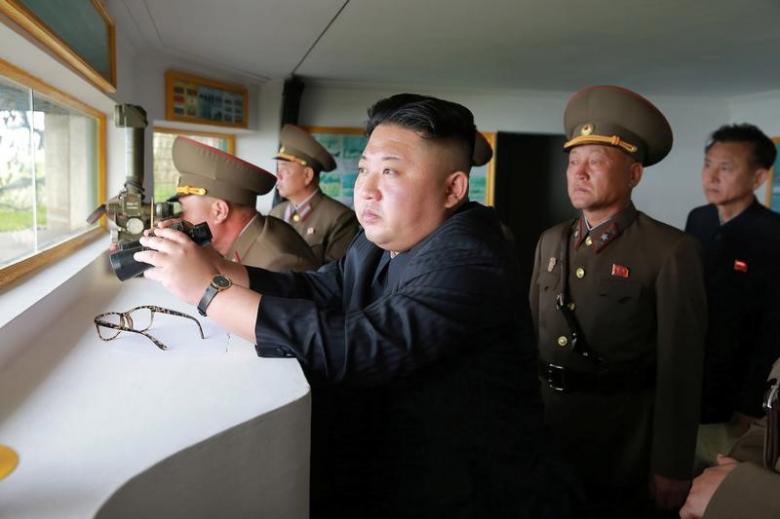
Sanctions
placed against those who would trade with North Korea seem
realistically to have no effect on North Korea’s nuclear weapons
development.
AT THE SAME TIME RELATIONS WITH RUSSIA TURN SOUR OVER DEVELOPMENTS IN UKRAINE |
|
Meanwhile on another key diplomatic front, in his
early effort to "restart" relations with the Russians, in September of
2009, Obama announced that the U.S. would end its plans (in the works
since 2007) to place a missile shield in Poland and radar intercepts in
the Czech Republic (originally planned as a means of preventing a
nuclear strike on Europe coming from Iran). The Russians were very
pleased at this strategic withdrawal from their "backyard" – but the
Czechs and Poles were shocked, and in America the Democrats supportive
and the Republicans upset. Obama countered that the U.S. would be using
more mobile ship-based interceptors, and a more sophisticated
technology to be deployed by 2018.
But here again, Obama failed to
understand the symbolic but powerful role that "position" played in the
world of international diplomacy.
In his effort to improve relations with
the Russians, in April of 2010 Obama announced that he and the Russian
President Medvedev had agreed, in signing an updating of the Strategic
Arms Reduction Treaty (New START), to further reduce their nuclear arms
stockpile by about one-third. But the agreement when put before the
Senate for ratification ran into all kinds of trouble. The biggest
problem seemed to develop over the forbidding of the conversion of
missile launch sites into defensive missile sites, at a time when
America was becoming more interested in developing a system of
interceptor missiles that could knock out missiles headed toward the
West. Did this treaty block such defensive missile deployment, or not?
The question was not really resolved. But
under pressure not to send the Russians the negative message that
America was not interested in an improvement in Russian-American
relations (Russian support of American policies in the Middle East was
greatly sought) the Treaty was finally approved by the Senate just
prior to the end of its 2010 session in late December, 71-26.
But ethnic tensions in Ukraine would soon
strain greatly American-Russian relations. The problem was that Ukraine
was/is made up of two ethnic groups: Ukrainians and Russians, and the
two groups did not always get along with each other. Most of the
country was appropriately Ukrainian in ethnic character. But the
eastern regions of Kharkiv, Lugansk, Donetsk, Odessa and Crimea are
heavily Russian, Lugansk and Crimea especially so. Ukraine's national
politics thus constantly gave strong evidence of this ethnic division.
For instance, Yulia Tymoshenko, who was Ukrainian Prime Minister from
2007 to 2010, was ethnically Ukrainian. But she narrowly lost the
national election in 2010 to Viktor Yanukovych, who was ethnically
Russian. Ukrainians were not all that happy about this turnover of
power. But then when (2011) Yanukovych had Tymoshenko arrested and
imprisoned for "corruption," Ukrainian outrage spilled into the streets
of the Ukrainian capital Kiev. The protests never let up, and by
February of 2014 had become very violent, even revolutionary (termed
the "Euromaidan Revolution"). As a consequence, Yanukovych and some of
his cabinet went into hiding, and fled, or tried to flee, Ukraine (the
latter part of February).
At this point, Russian President Putin
decided that the Russian-Ukrainian rivalry in Ukraine necessitated his
intervention. Besides, he had expansionist interests of his own,
especially in the joint Ukrainian-Russian naval base located on the
Crimean Peninsula at Sevastopol.
Obama, who was quite aware of Putin's
intentions, was quite upset about how this would compromise
Russian-American relations ... and in a 90-minute phone call to Putin urged
him not to invade Ukraine, or "serious consequences" would result. But
Putin (recognizing Obama as a man of grand talk but weak action)
ignored him, and sent masked and unmarked (no military insignias)
soldiers, termed the "little green men" by the international press
corps, into the Russian-speaking Eastern provinces of Ukraine "to help
his neighbors suffering from Ukrainian persecution."
On March 1st, the Russian Duma
(Parliament) approved full authorization of the Russian troop entry
into Ukraine "to restore the rule of law and protect the population of
Ukraine" – despite the fact that thousands of Russian soldiers were at
that point already in Ukraine, and had just seized key Ukrainian
military bases in the East, including most importantly the vital naval
station at Sevastopol. Out onto the streets the pro-Russian Ukrainians
poured, very happy to greet their liberators.
But this was just the beginning of
troubles in the Eastern areas around Donetsk and Lugansk, when the
Ukrainian government fought to retake the rebel provinces, which in
mid-March had voted to join Russia. But ultimately only Crimea (with
its naval base at Sebastopol) was formally annexed by Russia. By August
a stalemate of sorts had developed, and a small prisoner exchange was
arranged. But the conflict would wear on, and on.
Ultimately, Obama's "serious
consequences" turned out to be much less than serious (as Putin fully
expected). Obama continued to see Russia as a much-needed partner in
what he determined to be more serious crises, such as China's seizing
the South China Sea or the rise of the ISIS caliphate in Syria-Iraq.
Anyway, Obama was counting on America's European allies to take up the
cause of holding back Russian expansion. Indeed, France and Germany led
the 2014-2015 ceasefire talks, with America playing only a minor backup
role.
Finally, a decision was worked out
between Obama and the European Union, placing trade sanctions on Russia
(principally its natural gas and oil sales to the West). But this
actually did not change the outcome of the Ukrainian crisis, as that
outcome had been decided the day Putin moved his troops into Ukraine.
Also, these sanctions against Russia cut both ways, as the Europeans
were themselves highly dependent on Russian natural gas and oil. All
this, on the other hand, cost America very little, being itself a
massive producer of oil and natural gas (to the great distress of many
"pro-environment" Americans).
|
Like
Carter, Obama wanted to impress the world that with him in the White
House, the world could expect a friendlier, "less imperialistic" America in foreign
affairs.
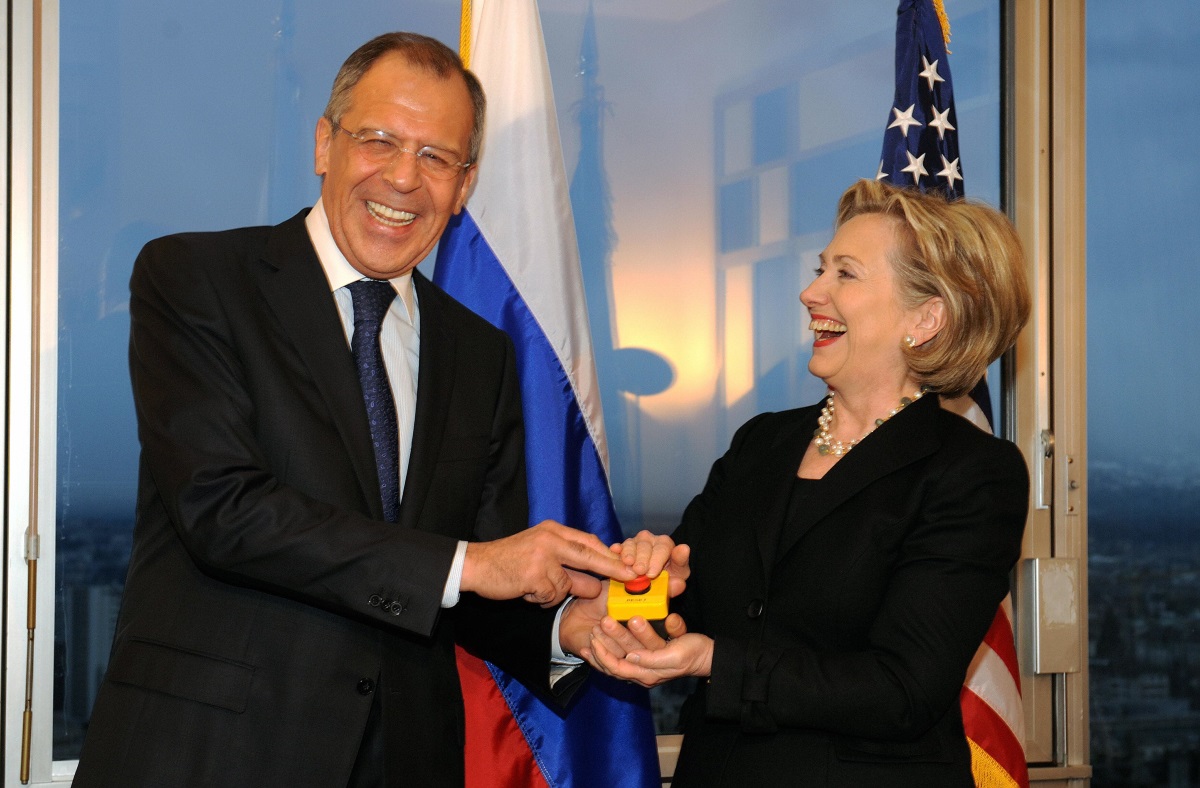
Thus Secretary of State Hillary Clinton
presented Russian Foreign Minister Sergei Lavrov with a "reset" button, signifying the new Obama approach to Russian-American relations (actually the Russian word used was "overload," startling Lavrov …
until the confusion could be cleared up!) – March 6th 2009
The Ukrainian crisis of 2014
In the former Russian or Soviet Empire,
multi-ethnic Ukraine is having problems of its own
(Russian-speaking
versus Ukrainian-speaking Ukrainians).
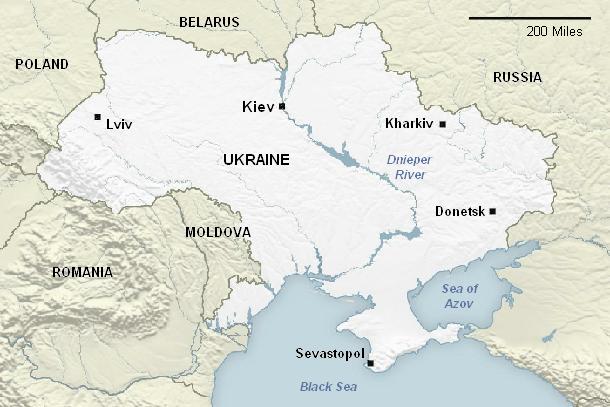
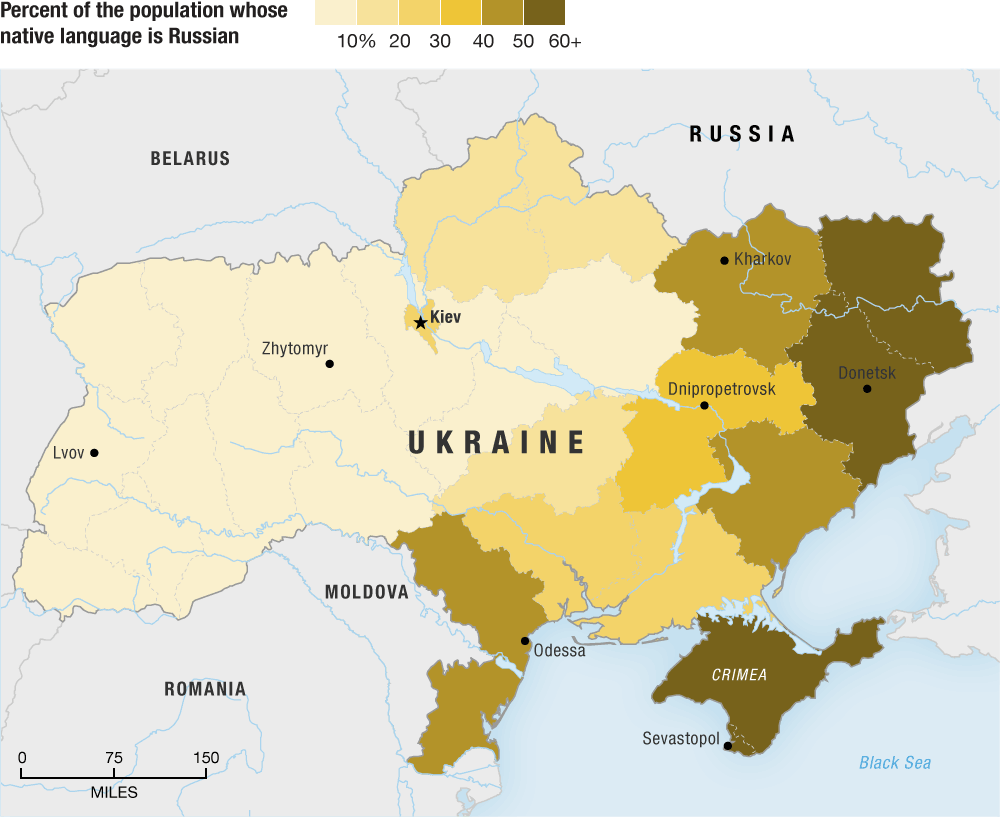
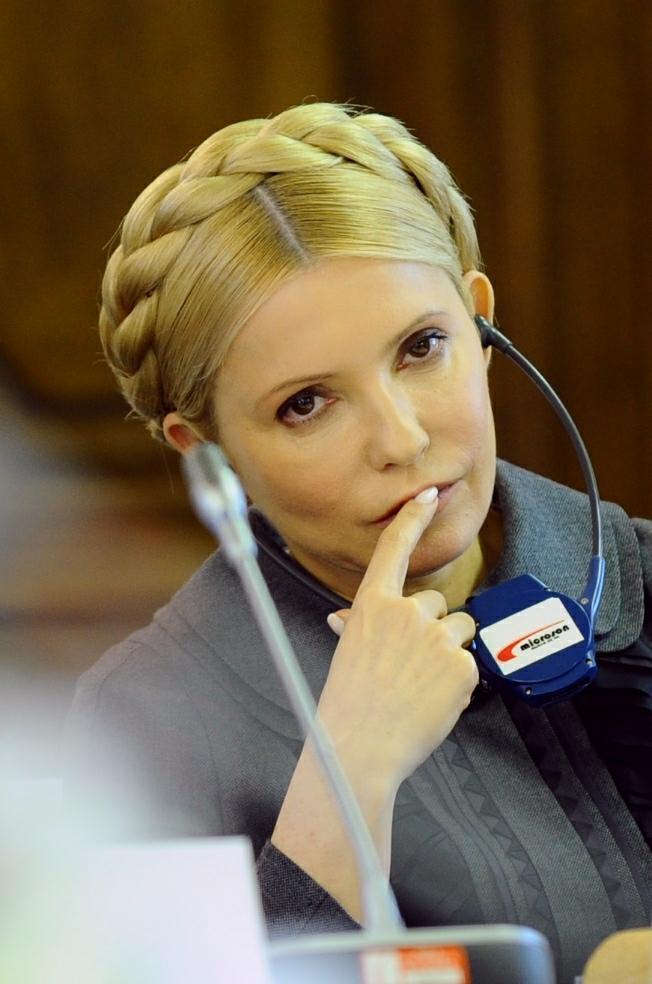
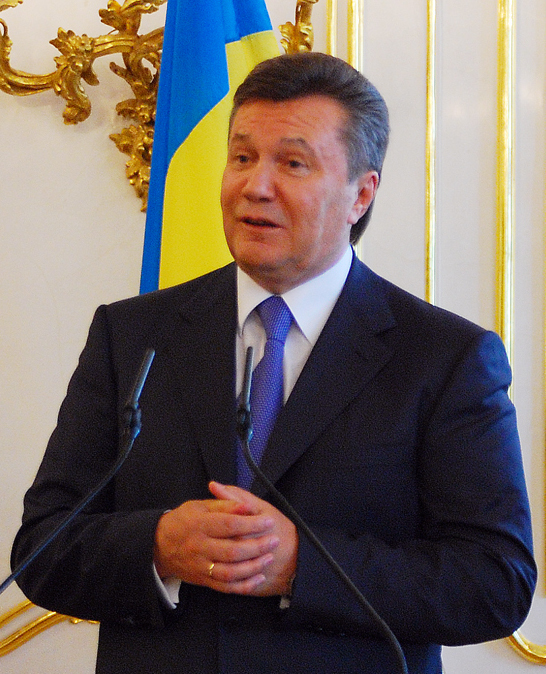
|
This
ethnic struggle is symbolized in the rivalry between
Ukrainian-speaking Yulia Tymoshenko who was Ukrainian Prime Minister
from 2007 to 2010 … and who in 2010 ran for the Ukrainian Presidency but lost to Russian-speaking Viktor Yanukovych.
Yanukovych then had her arrested and imprisoned for "corruption."
Ukrainians grow outraged at this blatantly political move.
|
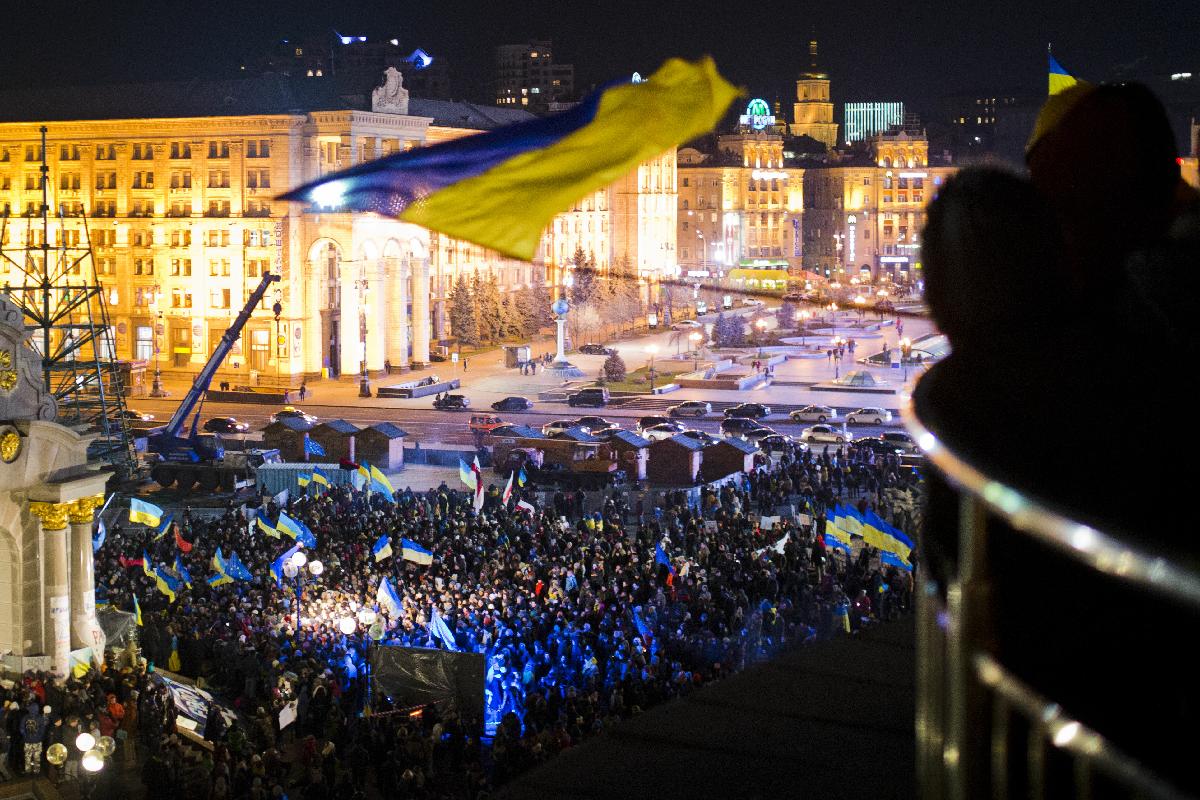
Protests begun in 2011 continue to occur sporadically
… turning violent by the beginning of 2014.
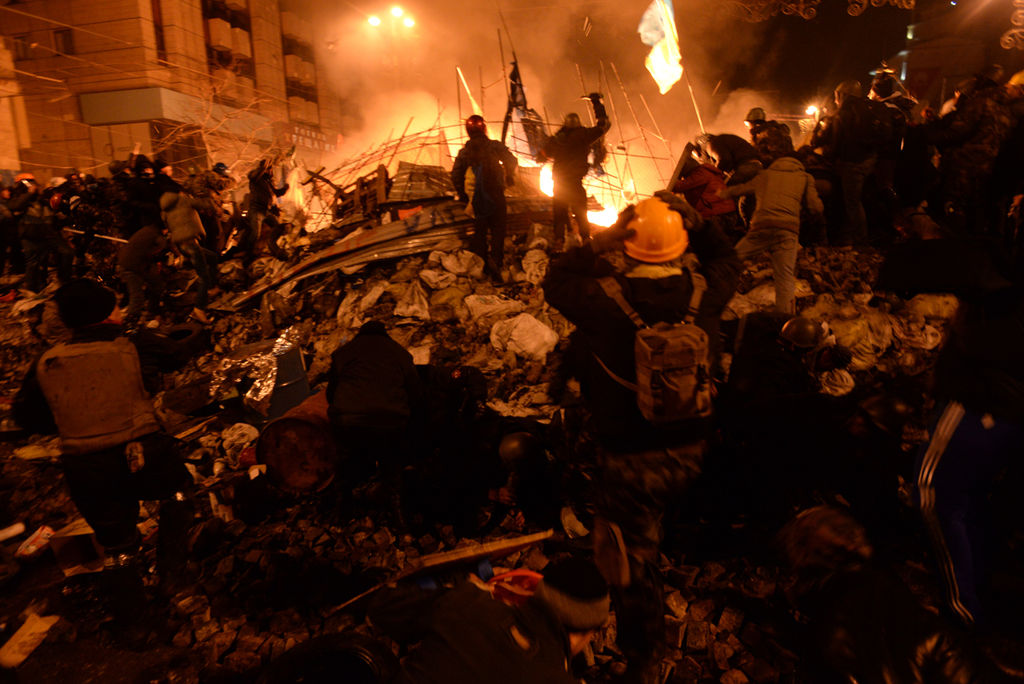
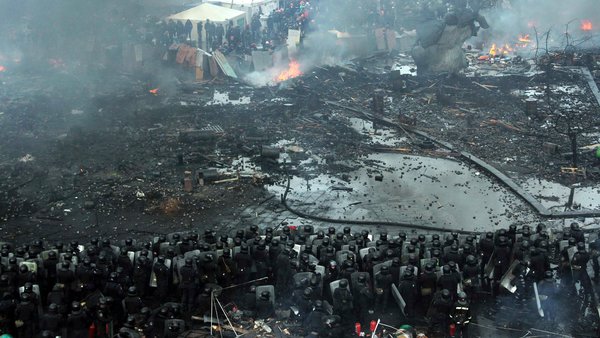
Putin's Russia invades Ukraine – February 2014
Tymoshenko is finally released from prison in February … and Yanukovich takes that as
the signal to abandon the Ukrainian presidency and head to the Russian-
speaking East … calling on Russian President Putin to come to his
aid.
At
this point (also February 2014) Putin decides that the
Russian-Ukrainian rivalry in Ukraine necessitates his intervention
(besides he has expansionist interests of his own, especially in the
joint Ukrainian-Russian naval base located at Sevastopol in Ukraine).
Obama
is quite upset and in a 90-minute phone call to Putin, urges him not to
invade Ukraine … or serious consequences would result.
|
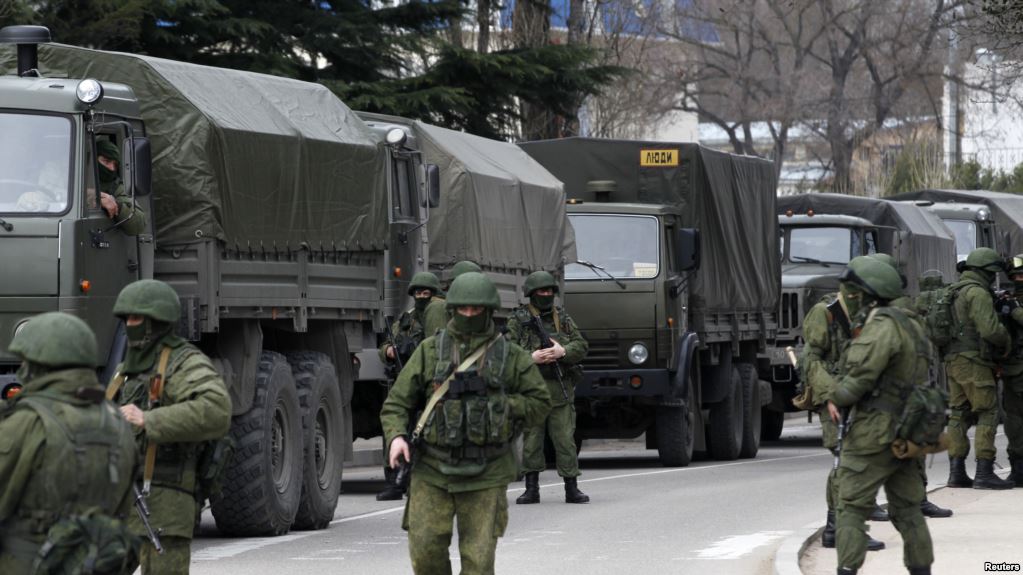
Putin
ignores him … and sends masked and unmarked (no military insignias)
soldiers (termed "little green men" by the international press corps)
into the Russian-speaking Eastern provinces of Ukraine to "help his
neighbors suffering from Ukrainian persecution."
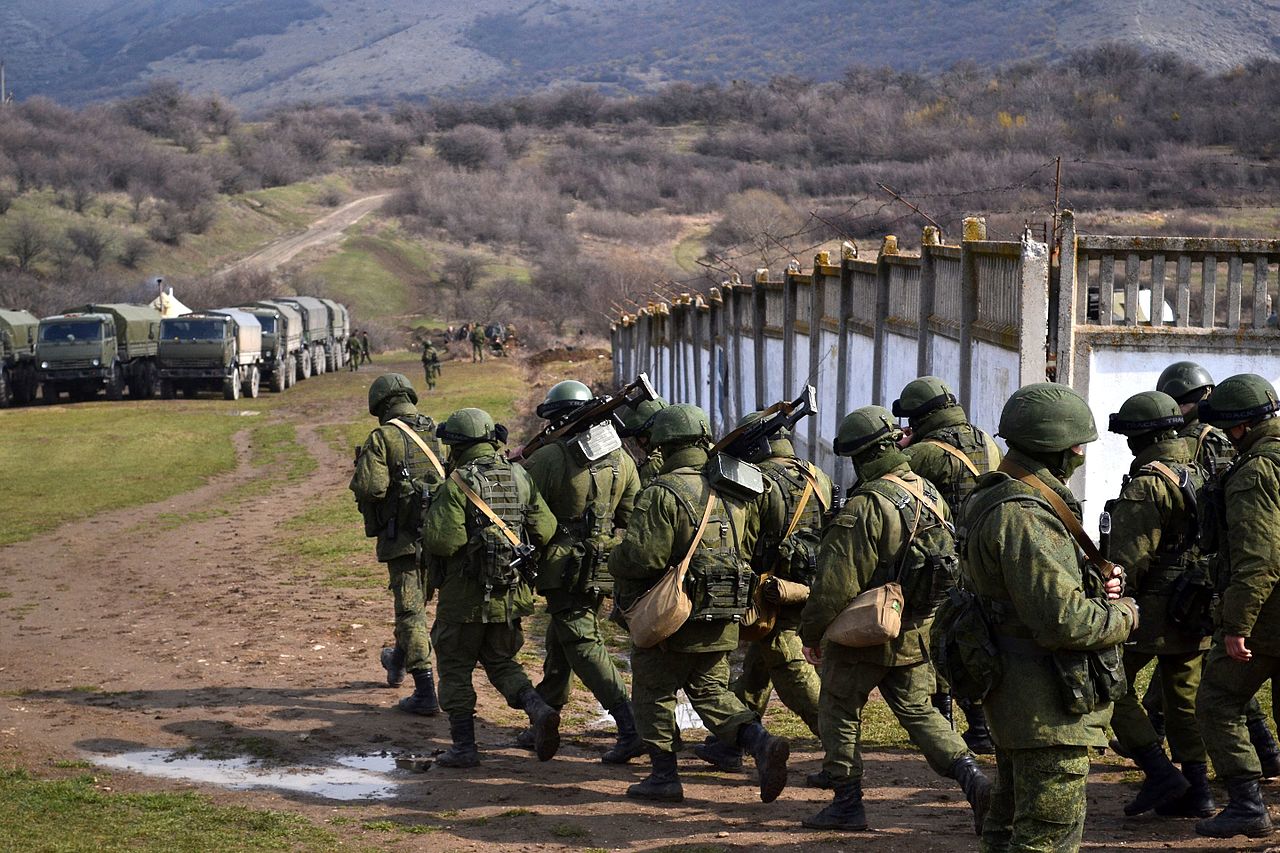
On
March 1st (2014) the Russian Parliament voted to send Russian troops
into Ukraine to "restore the rule of law and protect the population of
Ukraine" (although thousands of Russian soldiers are already in Ukraine
and have just seized key military bases in the east, including the
vital naval station at Sevastopol.
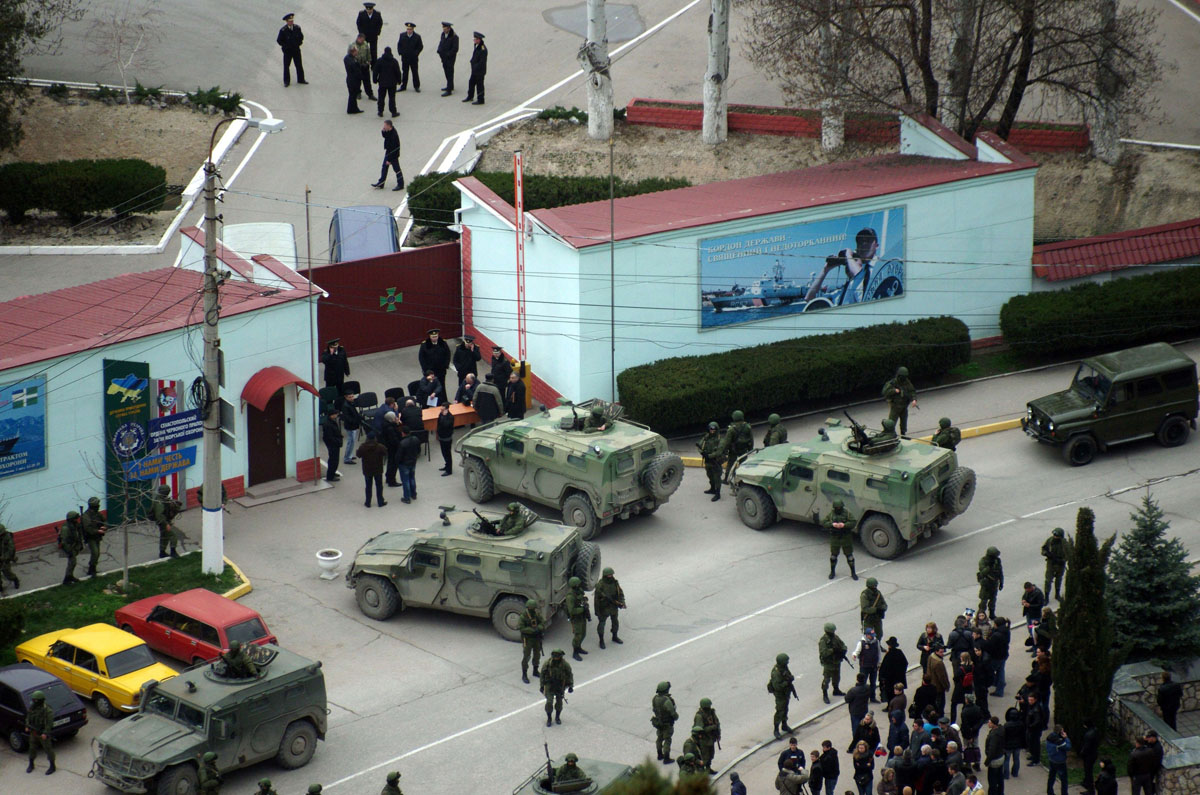
Pro-Russians were happy to greet their "liberators."
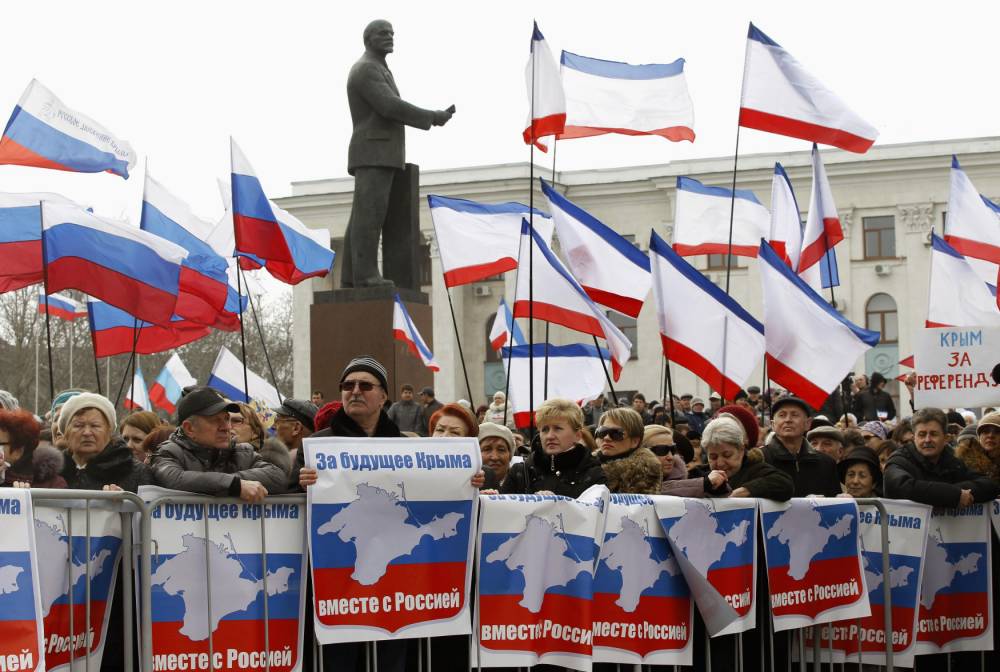
But
this was just the beginning of troubles in the Eastern areas around
Donetsk and Luhansk … when the Ukrainian government fought to retake
the rebel provinces which in mid-March had voted to join Russia ...
though only Crimea was annexed formally.
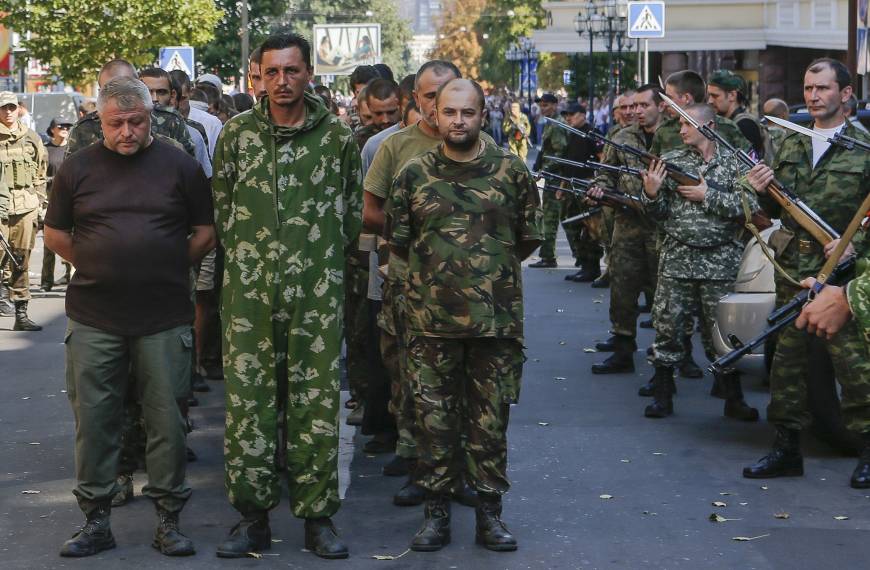
By August a stalemate had developed … and a small prisoner exchange was arranged. But the conflict would wear on … and on.
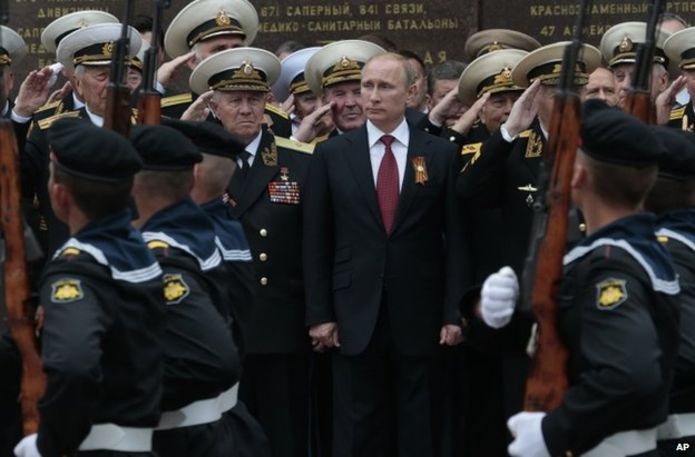
Putin arriving in the newly-seized Crimean naval base at Sevastopol … saluted by Russian naval officers for his bold action.

Go on to the next section: Social Policy
 Miles
H. Hodges Miles
H. Hodges
| | | | | |


 Obama's "new look" in the conduct of
Obama's "new look" in the conduct of Bin Laden is killed (May 2, 2011)
Bin Laden is killed (May 2, 2011)
 NATO troop draw-down in Afghanistan
NATO troop draw-down in Afghanistan
 The "Arab Spring" breaks out in Tunisia
The "Arab Spring" breaks out in Tunisia The "Arab Spring" violence spreads
The "Arab Spring" violence spreads Then "Arab Spring" spreads next door to
Then "Arab Spring" spreads next door to The "Arab Spring" also spreads to Syria
The "Arab Spring" also spreads to Syria Even Europe and America soon
Even Europe and America soon The situation worsens in Syria
The situation worsens in Syria
 Relations with China ... and North Korea
Relations with China ... and North Korea

























































